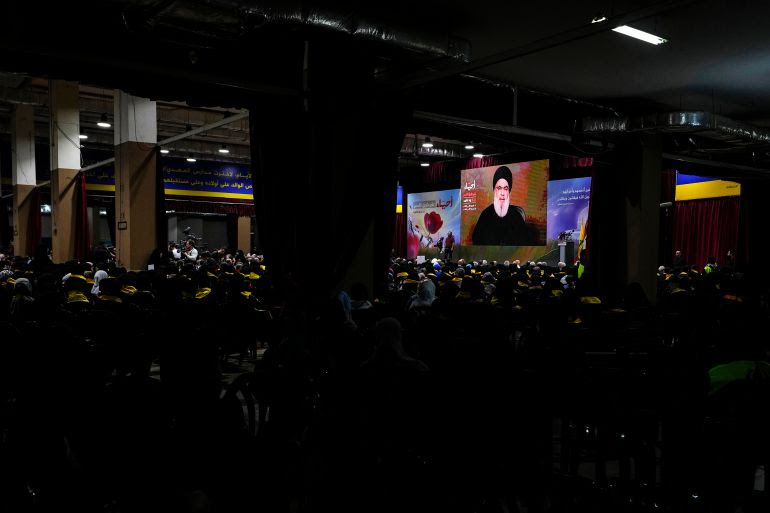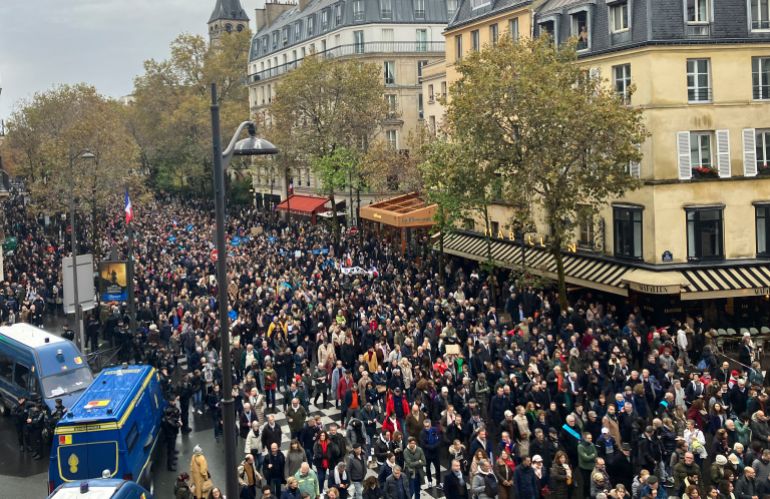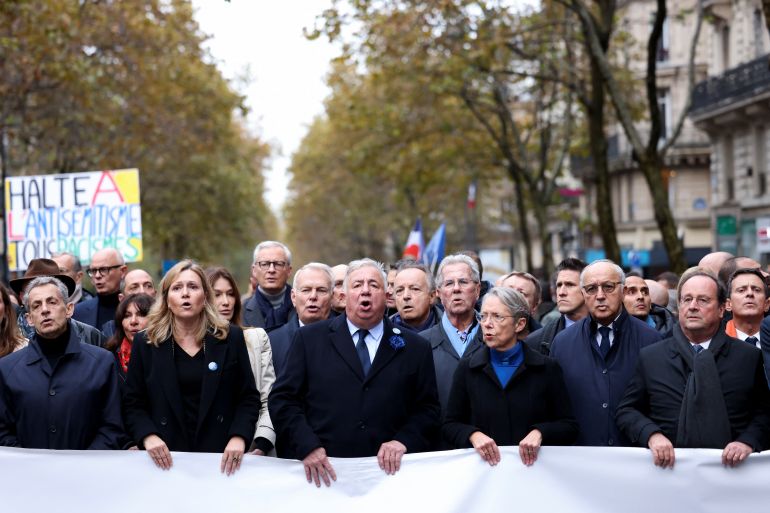Why They're Killing Children In Gaza
WhyThey'reKillingChildrenInGaza
-
INLTV.co.uk The're Killing Women And Children In Gaza The Song
- Well Funded Private Group Supported by Donald Trump and other Millionaires and Billionaires Are Preparing A Private Prosecution Against USA President Joe Biden, USA Secretary Antony Blinken and Israeli Prime Minister Benjamin for Various War Crimes Which Includes Conspiracy to Murder and injure over 70,000 innocent Palestinian Women and Children in Gaza and Westbank In Palestine
-
Handy Easy Email and World News Links WebMail
GoogleSearch INLTV.co.uk YahooMail HotMail GMail - news.sky.com/watch-live New York Post nypost.com YouTube
Anyone wanting a copy of the recorded song
"They're Killing Children In Gsza"
Please send your email request to:
Music Editor
INL World NewsEmail: This email address is being protected from spambots. You need JavaScript enabled to view it.
Medics treat three wounded Palestinian children at Al-Aqsa Hospital following an Israeli air attack, in Deir el-Balah in the central Gaza Strip on October 24 [Majdi Fathi/NurPhoto via Getty Images]
Gaza has become a ‘graveyard’ for children amid Israeli attacks: UN
An average of 420 Palestinian children have been killed or injured every day in the Gaza Strip since October 7.
Israeli Airstrike Kills 4 Palestinian Boys Playing Soccer NBC News
Palestinian Arab kid hugs an Israeli soldier
Did Israel's Mossad Have Prior Knowlesge Of The 7th Oct 2023 Hamas Attack On Israel?
Gazan freelance AP-CNN- journalist Hassan Eslaiah Video
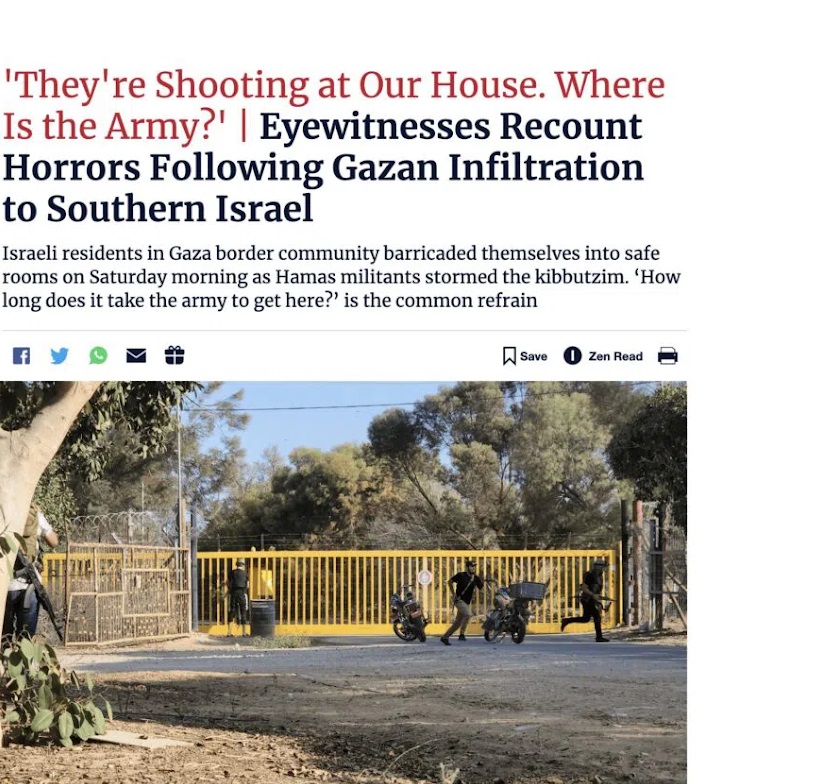
They're Shooting Our House Where Is The Army-Eye Witnesses Recount Horrors Following Gazan Infiltration To Southern Israel
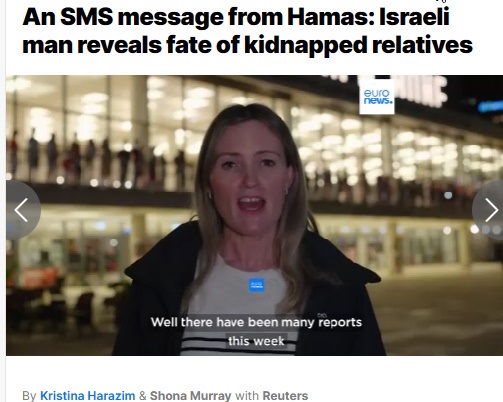
It's All About Big Business and The Economy Stupid
Mounting evidence and reports of the 7th October 2023 attack on Israel with Israeli hostages taken was a well planned Israeli Mossad False Flag Operation created as a excuse to the world to completely level Northern Gaza Strip with rockets, bombs, bulldosers and tanks, kill thousands of Palestinian men, women and children, and make over two million Palestinians homeless and force those still living to flee the Northern Gaza Strip to make way to build an new Canal through Israel and The Gaza Strip as an alternative to the Suez Canal.
One child killed in Gaza every 10 minutes on average says WHO chief
War Through the Eyes of Gaza’s Children
Palestinian community mourns 7 children killed in Gaza air strike BBC News
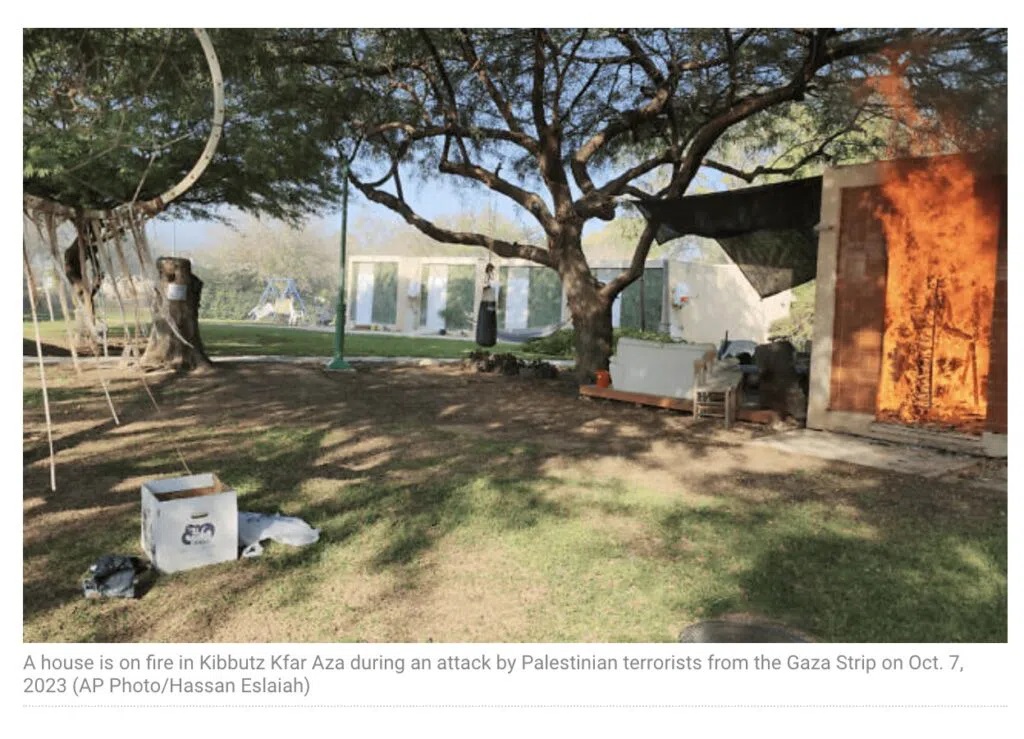
A House On Fire In Kibbutz Kfar During An Attack By Palestinian Terrorists From Gaza Strip On Oct 7th 2023
Shorna Murray Euro News Reporter Tel Aviv
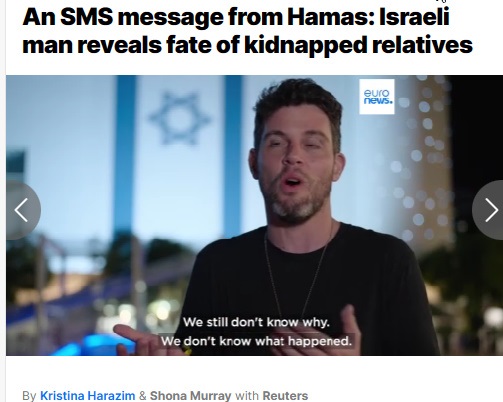
SMS Message From Hamas Reveals To Gil Dickmann Israeli Man Fate of Kidnapped Relatives
Palestinian fighters call for the protection of an Israeli mother and children
Israeli village massacre frontline report BBC News
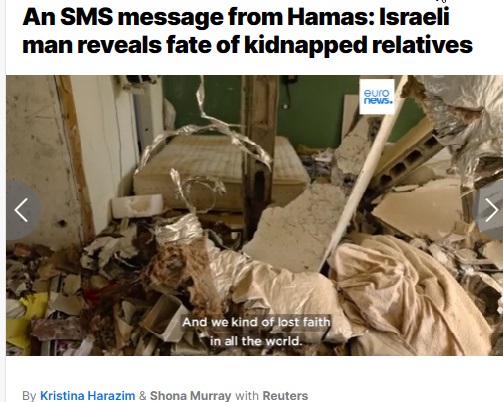
SMS Message From Hamas Reveals To Gil Dickmann Israeli Man Fate of Kidnapped Relatives
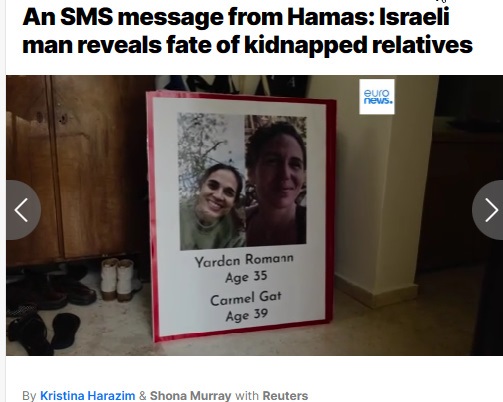
Carmel Gat Age 39 Kidnapped-Yardan Romann Aged 35
IDF Israeli Soldier VS Palestinian Kids
An SMS Message From Hamas Reveals To Gil Dickmann an Israeli Man The Fate of Kidnapped Relatives and Offer By Hamas To Swap All The Israeli Hostages For Palestinian In Held In Captivity By Israel Authorities. ..Euro News
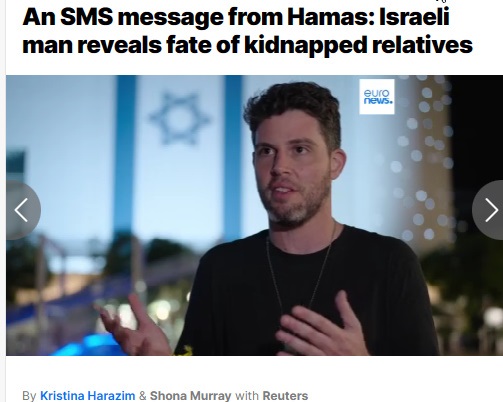
SMS Message From Hamas Reveals To Gil Dickmann Israeli Man Fate of Kidnapped Relatives
'They're all dead Dozens killed as Israel targets south Gaza
Israel Mother, children and grand parents are kidnapped by Hamas gunmen
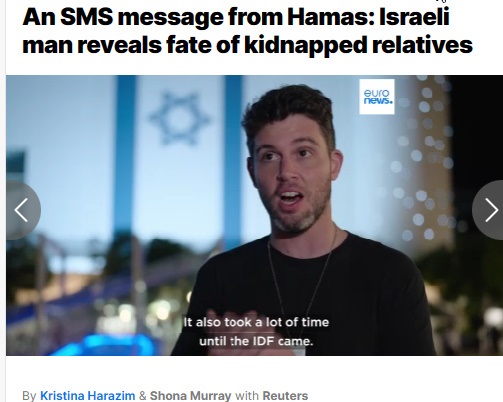
SMS Message From Hamas Reveals To Gil Dickmann Israeli Man Fate of Kidnapped Relatives
Previous ground offensives by Israel into Gaza in 2014 and 2019 were more limited in aim — intending to punish and degrade Hamas but not remove it completely. More than 1,000 Palestinians were killed during the 2019 campaign; the death toll in 2014 exceeded 1,500, including more than 500 children.
War in Israel This morning Hamas initiated war against the State of Israel- war in israel shorts
An uccccnidcentified Pacclestinian man carrying an injured child away from the site of an Israeli airstrike at the Jabalia cccccrefugee camp in northern Gaza on Tuesday. Stringer/Anadolu via Getty Images
Hamas releases footage of an Israeli mother and children being released
- Isrcael-Hcamas violence has killed more than 3,000 children. Almost all are Palestinians hit by Israeli airstrikes in Gaza.
- Children account for a startlingly high share of Palestinians reported killed in Gaza — roughly 41%.
- Gaza's demography, geography, and IDF military tactics have contributed to the high death toll.
One child killed in Gaza every 10 minutes on average says WHO chief
Real Reason Behind The Israel Hamas Gaza War
To Seize Gaza To Build The Ben Gurton Canal Through Gaza As A Rival To Egypt's Suez Canal
Did Israel's Mossad Have Prior Knowledge Of The 7th Oct 2023 Hamas Attack On Israel?
Broken Borders: AP & Reuters Pictures of Hamas Atrocities Raise Ethical Questions On October 7, Hamas terrorists were not the only ones who documented the war crimes they had committed during their deadly rampage across southern Israel. Some of their atrocities were captured by Gaza-based photojournalists working… HonestReporting Staff November 8, 2023 4:57 pm
Israel Wants to Seize Gaza to Build the Ben Gurion Canal - a rival to Egypt’s Suez Canal
- Westerners Have An Absolutely Psychotic View Of Airstrikes
- Caitlin Johnstone

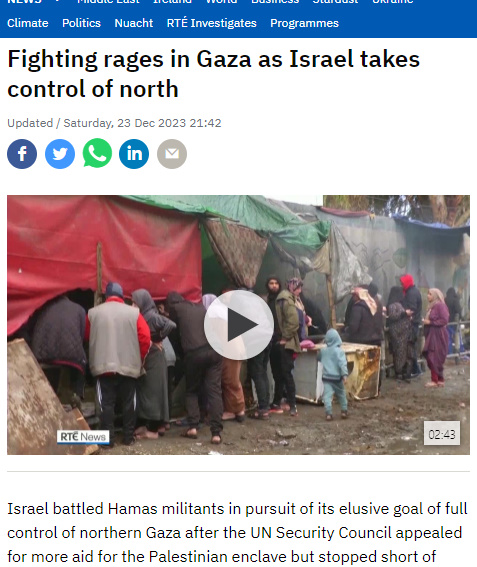
Listen to a reading of this article (reading by Tim Foley):
Canadian online outlet The Breach has published a letter by CBC’s senior manager of journalistic standards Nancy Waugh which highlights perfectly the bizarre psychological relationship that westerners have with bombs and airstrikes in foreign countries.
In response to multiple complaints from a retired Humber College professor about the wildly biased language that Canada’s state broadcaster has been using to describe Israel’s war on Gaza, Waugh acknowledged that the CBC routinely uses words like “murderous,” “vicious,” “brutal,” “massacre,” and “slaughter” to refer to the October 7 Hamas attack while using far less emotionally charged words like “intensive,” “unrelenting,” and “punishing” to describe Israel’s actions in Gaza over the last three months.
Waugh defended this extreme discrepancy by saying that Israel’s attacks in Gaza differ from the Hamas attack on Israelis in that Israel’s killings are done “remotely”.
“Different words are used because although both result in death and injury, the events they describe are very different,” Waugh wrote. “The raid saw Hamas gunmen stream through the border fence and attack Israelis directly with firearms, knives and explosives. Gunmen chased down festival goers, assaulted kibbutzniks then shot them, fought hand to hand, and threw grenades. The attack was brutal, often vicious, and certainly murderous.”
“Bombs dropped from thousands of feet and artillery shells lofted into Gaza from kilometers away result in death and destruction on a massive scale, but it is carried out remotely,” Waugh continued. “The deadly results are unseen by those who caused them and the source unseen by those [who] suffer and die.”
CBC actually believes its sanitized descriptions of Israeli violence against Palestinians are justified.
In an email obtained by The Breach, CBC justifies its weak language because Israel kills Palestinians "remotely" instead of face-to-face.https://t.co/
— The Breach (@TheBreachMedia) January 8, 2024
The belief that these attacks should be considered less vicious and brutal because they are launched from a distance by people who won’t see their effects is as psychologically immature as a little girl who believes you can’t see her because she has covered her own eyes. An attack which kills and maims and tortures doesn’t cease to be brutal and vicious just because it looks like a blip on a screen to you. Human suffering isn’t made less acute or less significant by being far away.
But this is how most westerners see the use of military explosives these days. We’re so used to hearing about our government and its allies raining bombs upon the middle east and Africa that we’ve developed a kind of immunity to the psychological impact of exactly what that means in reality. The typical western mind has come to view bombings more like a weather event that simply occurs in those places, like how south Asian countries experience monsoons.
In reality, bombings are no less savage than attacks by guns, grenades, knives or machetes. In fact they actually allow for more savagery to take place, because they kill so much more efficiently, and because the troops who use them can keep killing and killing without losing morale and accumulating mental trauma from the horrors they have been inflicting upon their fellow human beings.
Dead is dead. Dismembered is dismembered. Pain is pain. Anguish is anguish. The unexamined assumption that the western empire’s prefered methods of killing are less brutal and murderous than those of an impoverished militant group is a psychological defense mechanism we have put in place to shelter ourselves from knowledge of our own brutality and murderousness.
In truth if you look at all the death, destruction, suffering and pain that Israel has inflicted on Gaza since October 7, there is no question that Israel is vastly more vicious, brutal and murderous than Hamas has ever been, and so are its allies who are supporting its actions. The only way to believe otherwise would be to psychologically hide away from the reality of what’s actually happening, which is as truth-based and mature as the kid with her hands over her eyes saying “Now you can’t see me!”
More children killed in Gaza this year so far than in Israel and Ukraine Combined
The IDF’s bombing of Gaza has been unusually deadly for children, as compared to other recent conflicts and previous Israeli offensives.
The IDF’s bombing of Gaza has been unusually deadly for children, as compared to other recent conflicts and previous Israeli offensives.
On Sunday, the international humanitarian organization Save The Children said the number of children killed in Gaza in three weeks had surpassed the total number of children killed in all global conflict zones since 2019. To find a comparable death toll, one would have to go back to the Syrian civil war, which killed 27,126 children over a period of more than 10 years, or the ongoing Yemeni civil war, in which 3,774 children have died in seven years of fighting, according to the UN.
The current Israel-Hamas conflict, by comparison, is less than a month old and continues to intensify as Israel begins ground operations in Gaza. Neither Syria nor Yemen saw children accounting for such a large share of civilian deaths.
Israeli forces attack mourners at Al Jazeera journalist's funeral
Palestinian journalist's coffin almost dropped as Israeli police charge at mourners
“Shireen'sdead!” Settlers insult slain Al Jazeera journalist Abu Akleh
Catholic leaders slam Israeli attack on mourners carrying slain journalist's casket
Clashes at journalist Shireen Abu Akleh's funeral in East-Jerusalem DW News
Hamas Conveniently Attacks Israel Who Amazingly Claims
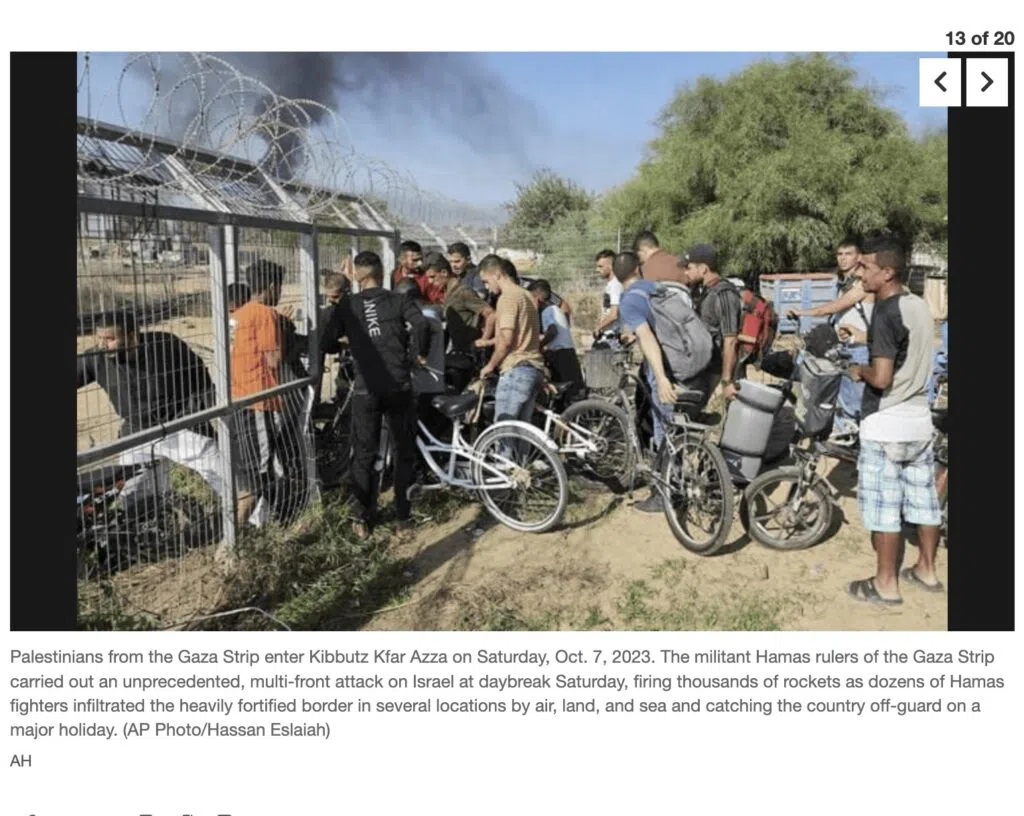
Palestinians From Gaza Strip Enter Kibbutz Kfar On Saturday 7th Oct 2023
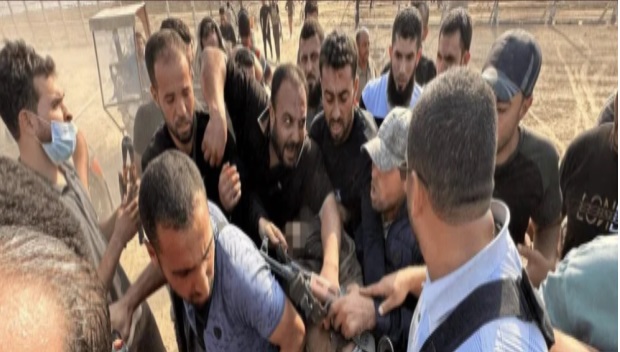
A Deadly Casade How Secret Hamas Attack Orders Were Passed Down Last Minute
How Did These AP-CNN Journalists Knew But Israels Massad Did Not Know
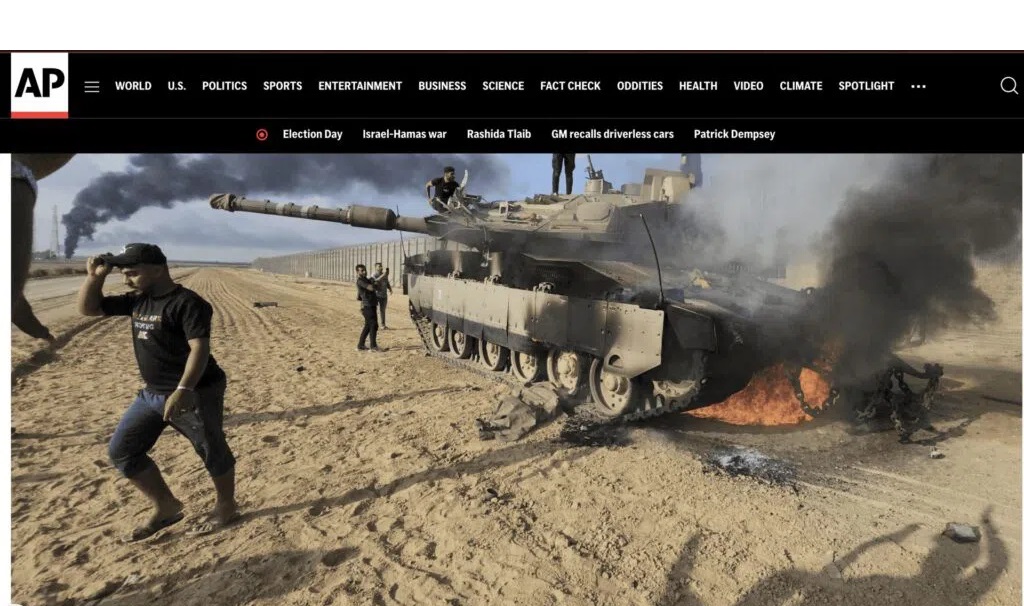
Palestinian Militants Attack and Capture Israeli Tank And Soldiers 7th Oct 2022
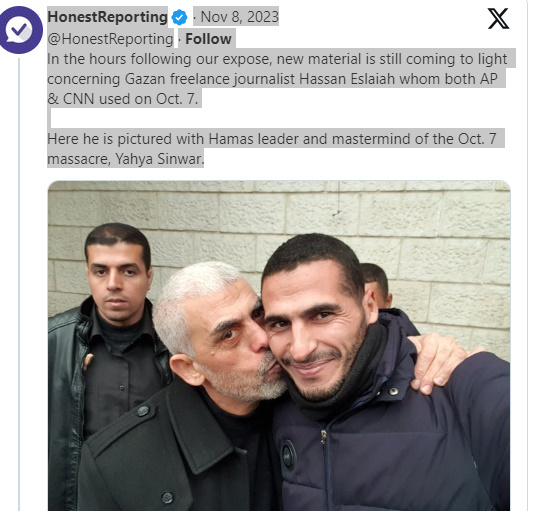
Gazan freelance journalist Hassan Eslaiah AP/CNN used on Oct.7. pictured with Yahya Sinwar_Hamasleaderand mastermind of the Oct 7th massacre
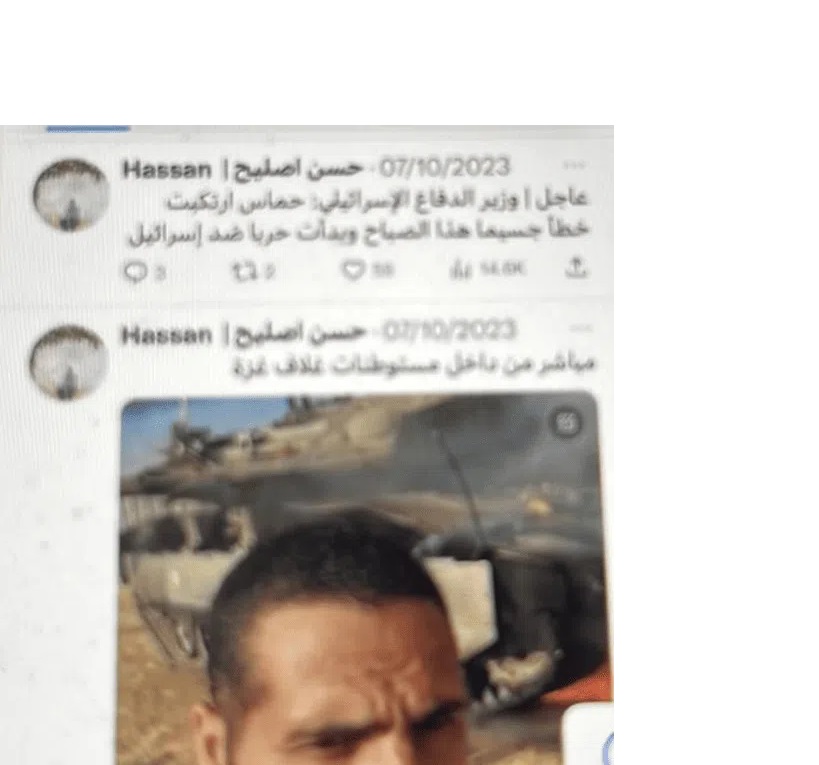
Hassan Eslaiah APP-CNN Journalist
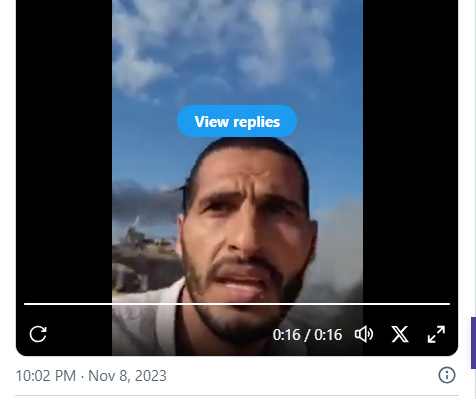
Gazan freelance AP-CNN journalist Hassan Eslaiah
Gazan freelance AP-CNN- journalist Hassan Eslaiah Video
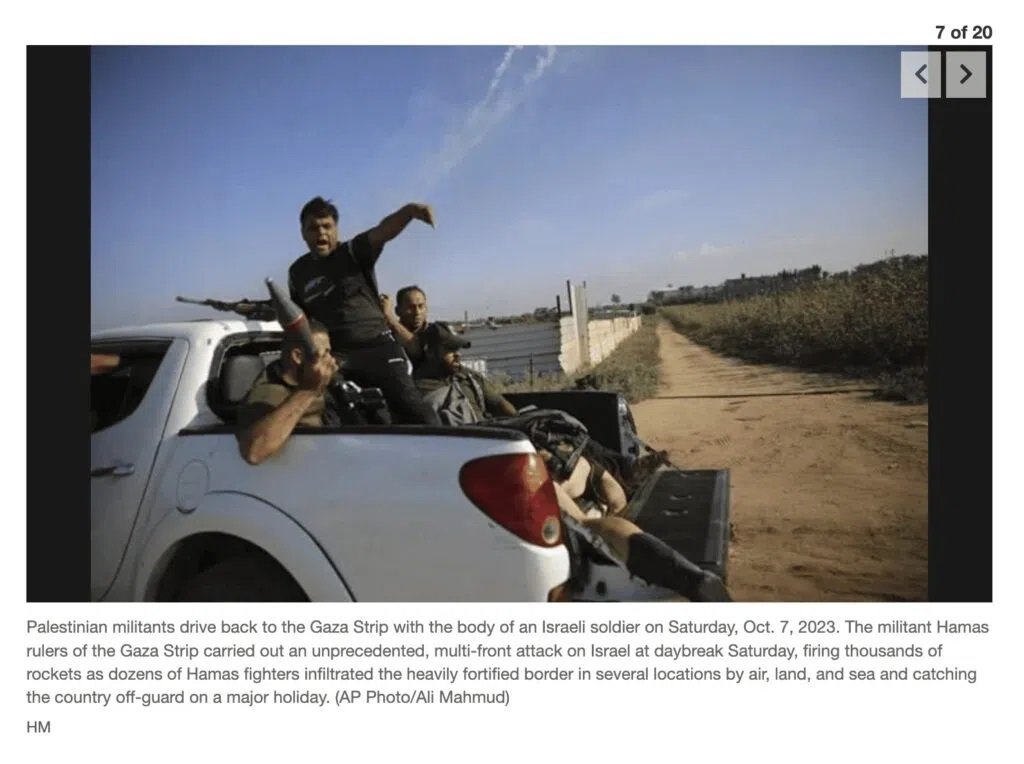
Palestinian Militants Drive Back To Gaza With The Body Of An Israel Soldier_7th Oct 2023
The militant Hamas Rulers of the Gaza Strip carried out an unprecedented, multi-front attack on Israel at daybreak Saturday, firing thousands of rockets as dozens of Hamas fighters infiltrated the heavily fortified border in several locations by air, land and sea, and catching the country of Israel off-guard on a major holiday (AP Photo/Mahmud}
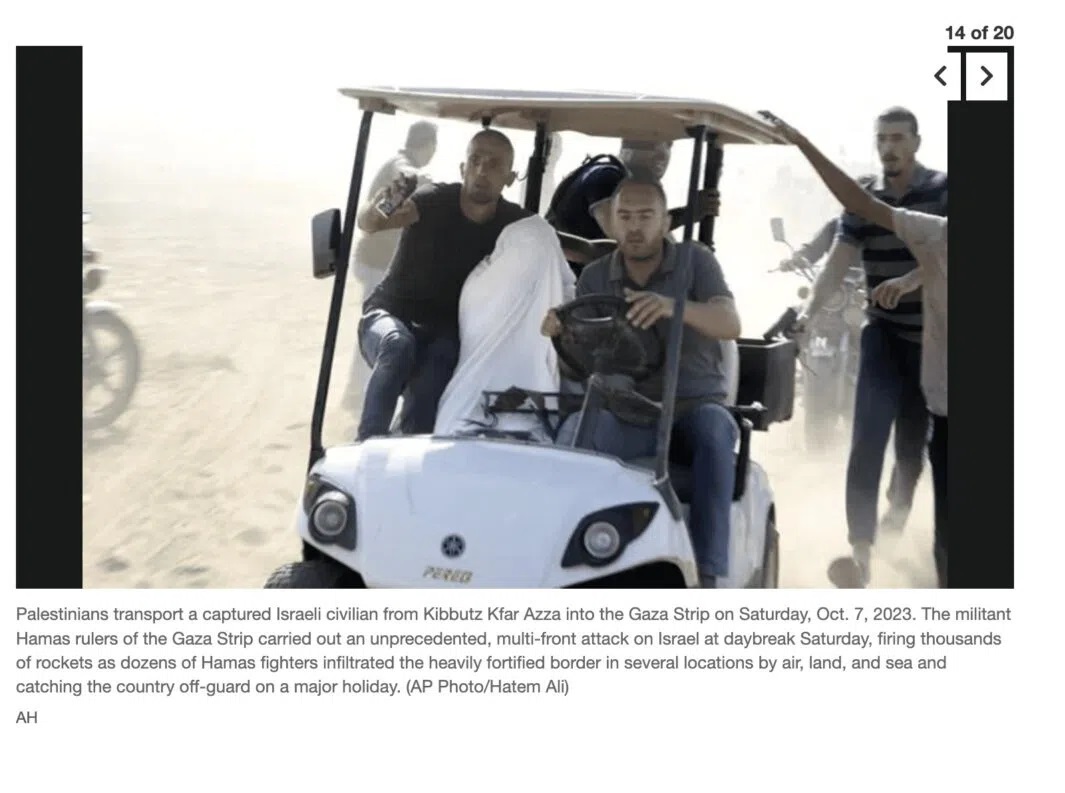
Palestinian Militants Transport A Capture Israeli Citizen From Kabbutz Kfar Azza
Into The Gaza Strip In A Golf Buggy 7th Oct 2023
Broken Borders: AP & Reuters Pictures of Hamas Atrocities Raise Ethical Questions
On October 7, Hamas terrorists were not the only ones who documented the war crimes they had committed during their deadly rampage across southern Israel. Some of their atrocities were captured by Gaza-based photojournalists working for the Associated Press and Reuters news agencies whose early morning presence at the breached border area raises serious ethical questions.
What were they doing there so early on what would ordinarily have been a quiet Saturday morning? Was it coordinated with Hamas? Did the respectable wire services, which published their photos, approve of their presence inside enemy territory, together with the terrorist infiltrators? Did the photojournalists who freelance for other media, like CNN and The New York Times, notify these outlets? Judging from the pictures of lynching, kidnapping and storming of an Israeli kibbutz, it seems like the border has been breached not only physically, but also journalistically.
AP: Photojournalists or Infiltrators?
Four names appear on AP’s photo credits from the Israel-Gaza border area on October 7: Hassan Eslaiah, Yousef Masoud, Ali Mahmud, and Hatem Ali.
Eslaiah, a freelancer who also works for CNN, crossed into Israel, took photos of a burning Israeli tank, and then captured infiltrators entering Kibbutz Kfar Azza.
In the above video, Eslaiah says in Arabic: “Everyone who were inside this tank were kidnapped, everyone who were inside the tank were kidnapped a short while ago by al-Qassam Brigades [Hamas’ armed wing], as we have seen with our own eyes.”
More photos he took in Kfar Azza show Hamas terrorists trying to breach the Kibbutz’s fence and a burning house inside the community
UPDATE: Shortly after the publication of this article, we were alerted to footage of Hassan Eslaiah next to the Israeli tank. In addition, a photo has surfaced showing Eslaiah with Hamas leader and mastermind of the October 7 massacre, Yahya Sinwar. :
HonestReporting has obtained screenshots of Eslaiah’s now-removed tweets on X in which he documented himself standing in front of the Israeli tank. He did not wear a press vest or a helmet, and the Arabic caption of his tweet read: “Live from inside the Gaza Strip settlements.”
Interestingly, the names of the photographers, which appear on other sources, have been removed from some of the photos on AP’s database. Perhaps someone at the agency realized it posed serious questions regarding their journalistic ethics.
Reuters: Lynching as “Image of the Day”
Reuters has published pictures from two photojournalists who also happened to be at the border just in time for Hamas’ infiltration: Mohammed Fayq Abu Mostafa and Yasser Qudih.
They both took pictures of a burning Israeli tank on the Israeli side of the border, but Abu Mustafa went further: He took photos of a lynch mob brutalizing the body of an Israeli soldier who was dragged out of the tank.
Reuters was kind enough to add a graphic warning to the photo caption, but it didn’t prevent editors from shamelessly labeling it as one of the “Images of the Day” on their editorial database
Broken Borders: AP & Reuters Pictures of Hamas Atrocities Raise Ethical Questions
On October 7, Hamas terrorists were not the only ones who documented the war crimes they had committed during their deadly rampage across southern Israel. Some of their atrocities were captured by Gaza-based photojournalists working for the Associated Press and Reuters news agencies whose early morning presence at the breached border area raises serious ethical questions.
What were they doing there so early on what would ordinarily have been a quiet Saturday morning? Was it coordinated with Hamas? Did the respectable wire services, which published their photos, approve of their presence inside enemy territory, together with the terrorist infiltrators? Did the photojournalists who freelance for other media, like CNN and The New York Times, notify these outlets? Judging from the pictures of lynching, kidnapping and storming of an Israeli kibbutz, it seems like the border has been breached not only physically, but also journalistically.
AP: Photojournalists or Infiltrators?
Four names appear on AP’s photo credits from the Israel-Gaza border area on October 7: Hassan Eslaiah, Yousef Masoud, Ali Mahmud, and Hatem Ali.
Eslaiah, a freelancer who also works for CNN, crossed into Israel, took photos of a burning Israeli tank, and then captured infiltrators entering Kibbutz Kfar Azza.
In the above video, Eslaiah says in Arabic: “Everyone who were inside this tank were kidnapped, everyone who were inside the tank were kidnapped a short while ago by al-Qassam Brigades [Hamas’ armed wing], as we have seen with our own eyes.”
More photos he took in Kfar Azza show Hamas terrorists trying to breach the Kibbutz’s fence and a burning house inside the community
UPDATE: Shortly after the publication of this article, we were alerted to footage of Hassan Eslaiah next to the Israeli tank. In addition, a photo has surfaced showing Eslaiah with Hamas leader and mastermind of the October 7 massacre, Yahya Sinwar. :
HonestReporting has obtained screenshots of Eslaiah’s now-removed tweets on X in which he documented himself standing in front of the Israeli tank. He did not wear a press vest or a helmet, and the Arabic caption of his tweet read: “Live from inside the Gaza Strip settlements.”
Interestingly, the names of the photographers, which appear on other sources, have been removed from some of the photos on AP’s database. Perhaps someone at the agency realized it posed serious questions regarding their journalistic ethics.
Reuters: Lynching as “Image of the Day”
Reuters has published pictures from two photojournalists who also happened to be at the border just in time for Hamas’ infiltration: Mohammed Fayq Abu Mostafa and Yasser Qudih.
They both took pictures of a burning Israeli tank on the Israeli side of the border, but Abu Mustafa went further: He took photos of a lynch mob brutalizing the body of an Israeli soldier who was dragged out of the tank.
Reuters was kind enough to add a graphic warning to the photo caption, but it didn’t prevent editors from shamelessly labeling it as one of the “Images of the Day” on their editorial database.
ADeadlyCasade_
Let’s be clear: News agencies may claim that these people were just doing their job. Documenting war crimes, unfortunately, may be part of it. But it’s not that simple.
It is now obvious that Hamas had planned its October 7 attack on Israel for a very long time: its scale, its brutal aims and its massive documentation have been prepared for months, if not years. Everything was taken into account — the deployments, the timing, as well as the use of bodycams and mobile phone videos for sharing the atrocities.
Is it conceivable to assume that “journalists” just happened to appear early in the morning at the border without prior coordination with the terrorists? Or were they part of the plan?
Even if they didn’t know the exact details of what was going to happen, once it unfolded did they not realize they were breaching a border? And if so, did they notify the news agencies? Some sort of communication was undoubtedly necessary — before, after or during the attack — in order to get the photos published.
* * *
REACTIONS UPDATE: After publication of this article, a spokeswoman for the Associated Press quoted by the Daily Wire denied any advance knowledge of the attack, although HonestReporting did not make such accusation. “The Associated Press had no knowledge of the Oct. 7 attacks before they happened,” said Nicole Meir. “The role of the AP is to gather information on breaking news events around the world, wherever they happen, even when those events are horrific and cause mass casualties. AP uses images taken by freelancers around the world, including in Gaza.”
According to a report on Ynet News on November 9, AP has decided to cut ties with Eslaiah. “We are no longer working with Hassan Eslaiah, who had been an occasional freelancer for AP and other international news organizations in Gaza”, their statement said.
Earlier, Ynet News reported that CNN has decided to suspend ties with Eslaiah despite not finding “any reason to doubt the journalistic accuracy of the work he has done for us.”
A day after the publication, Reuters has issued a statement to which HonestReporting replied as follows
Broken Borders: AP & Reuters Pictures of Hamas Atrocities Raise Ethical Questions
The New York Times stood by its decision to work with freelancer Yousef Masoud, who on October 7 had worked for AP. In a statement on November 9, the paper praised his work claiming that he was “doing what photojournalists always do during major news events.” The Times denied it had prior knowledge of the Hamas attacks, an accusation HonestReporting did not make. It added that “the Times has extensively covered the Oct. 7 attacks and the war with fairness, impartiality, and an abiding understanding of the complexities of the conflict.”
Israel’s Public Diplomacy Directorate at the Prime Minister’s office issued a statement saying it viewed with “severity” the phenomenon of journalists covering Hamas’ atrocities, labeling them as “accomplices to crimes against humanity.” The statement added that the Israeli Government Press office has sent an official complaint demanding explanations and “immediate action” from the relevant media outlets.
The Jerusalem Journalists Association has called on the relevant international media outlets to launch a thorough inquiry into questions arising from this exposure.
* * *
Either way, when international news agencies decide to pay for material that has been captured under such problematic circumstances, their standards may be questioned and their audience deserves to know about it. And if their people on the ground actively or passively collaborated with Hamas to get the shots, they should be called out to redefine the border between journalism and barbarism.
Found this article informative? Follow the HonestReporting page on Facebook to read more articles debunking news bias and smears, as well as others explaining Israel’s history, politics, and international affairs. Click here to learn more!
Photo Credits: Abed Rahim Khatib via Flash90, Structuresxx via Shutterstock
Editors note: The headline of this article has been updated. This story has no connection to the Photographers Without Borders organization and we are happy to clear up any unintentional confusion that may have been caused.
Israeli intelligence leak details extent of warnings over Hamas attack | Israel | The Guardian

Officer who reviewed intelligence considered risk of big attack ‘an imaginary scenario’, leak suggests Israel-Hamas war – live updates
Israel’s military and intelligence officials were given a highly detailed warning that Hamas was actively training to take over kibbutzim on the Gaza border and overrun military posts with the aim of inflicting substantial fatalities, according to reports in the Israeli media.
The claim made by Israel’s Channel 12 on Monday evening was based on leaked emails from the Israeli military’s 8200 cyber-intelligence unit discussing the warnings.
Those emails revealed that a senior officer who reviewed the intelligence considered the danger of a massive surprise attack by Hamas across the Gaza border to be “an imaginary scenario”.
The hugely embarrassing leak describes in shocking detail what would turn out to be key elements of Hamas’s planning for its massacre of 1,200 Israelis on 7 October, including that Israel spotters were aware of senior Hamas officials present as observers during training preparations.
According to the leaked emails, Hamas went as far as giving the mocked-up kibbutz used in training a name and even practised raising a flag over its synagogue.
Plans were also intercepted that discussed overrunning a border military base and killing all of its occupants.
While much of the focus of recent scrutiny for the intelligence failure before the 7 October attack has looked at what information was available to senior political and military figures, including Israel’s prime minister, Benjamin Netanyahu, the new leaks and briefings suggest serious failings within the Israel Defense Forces’ intelligence reporting and distribution system as well.
The source of the warning is a highly respected career military intelligence NCO identified in Israeli media reports as V who warned her chain of command during the summer that Hamas was planning a large-scale incursion.
Further emails leaked to Channel 12 suggest the initial warning was corroborated a few days later with evidence that other Hamas units were involved in similar training aimed at apparently different targets.
Some officials appear to have been impressed by the intelligence but a senior intelligence officer who reviewed the material in July was more sceptical and suggested it was necessary to distinguish between what Hamas was doing for “show” and what was “realistically” the purpose of the training.
In another subsequent email, a colleague of the soldier who gave the initial warning said they emphatically disagreed with this assessment, while V herself suggested they were seeing a concrete “operational plan without a timetable for implementation” and that Hamas was planning for a “big event”
Other very senior officers, including the head of the 8200 unit, have suggested in briefings to Israeli journalists that they were not shown V’s warning, despite the email chain discussing it.
One report suggested that when the head of the IDF’s military intelligence directorate, Maj Gen Aharon Haliva, visited V’s unit, the warning was not passed on to him, and Haliva left with an assessment suggesting that “[the Hamas leader] Yahya Sinwar has no intention of causing the situation to deteriorate [and that] Hamas has instructed its operatives on the ground to show restraint”.
Israeli media have carried their own versions of stories relating to the warnings of an imminent Hamas attack over the summer.
Haaretz described the same training exercise on the mocked-up border kibbutz with reference to the 8200 unit email chain, which it said concluded with a Hamas message from those involved in the exercise saying: “We have completed the murder of all of those on the kibbutz.”
Haaretz described V’s warning six months before 7 October that Hamas had completed training exercises simulating a raid on kibbutzim and IDF outposts on the Israeli side of the border.
“V concluded that Hamas had completed its preparations, because senior Hamas commanders had turned out to view the exercises – something that was also reported by IDF spotters based on the border. Just like the spotters, her warnings were brushed off dismissively,” it said.
“While they were distributed to senior officers, to her own unit and to field intelligence, a senior intelligence officer wrote to her in response, praising her work but adding: ‘It sounds imaginary to me,’ almost exactly echoing the language of the leaked 8200 emails.”
According to this telling of events, V’s direct commander backed up her assessment, insisting it was a real exercise and not a display. The warnings were reiterated by the soldiers involved a few weeks before 7 October when an unnamed senior intelligence officer visited their base and the intelligence was presented to him.
Despite the warnings, however, even of the eve of 7 October, when senior officers discussed the prospect of an imminent Hamas attack, senior officers in the IDF were describing the evidence as “weak”.
The Yedioth Ahronoth newspaper reported that on 6 October, hours before Hamas launched its assault, the IDF’s most senior officers were alerted to “weak signs” that something was happening on the Gaza border and that Hamas was preparing for an offensive.
Commenting on the claims, the IDF said: “These days the IDF is entirely focused on fighting the terrorist organisation Hamas. After the war, the IDF will conduct a thorough, incisive and uncompromising investigation and publish its findings to the public."
We have all been profoundly shaken by recent events in Israel and Gaza. This latest conflict marks the start of a chapter that is likely to affect millions of lives, both in the Middle East and further afield, for years to come. With reporters on the ground, and others producing live blogs, videos, podcasts and photo essays as the story unfolds, the Guardian is dedicated to bringing you independent, fact-checked journalism 24/7.
Full Special Report Israel declares war after surprise Hamas attack NBC News P1
Funéra illesde Shireen Abu Aklehla police israéli enne chargele cortège unèbreP2
Special Report Updates on the Israel-Hamas War - October15 P2
Funérail lesde Shireen Abu Akle la police-israéli enne charge le cortège funèbre.mp4
Shireen Abu Akleh Al Jazeera reporter killed by Israeli gunfire
Israe lPalestine Conflict Palestinian Doctors Paramedics Heading To South Gaza N18V-News18
Children with cancer evacuated from Gaza for treatment to Egypt and Jordan
Children with cancer evacuated from Gaza for treatment to Egypt ..…
Children with cancer evacuated from Gaza for treatment to Egypt and Jordan (zawya.com)
Some 12 children with cancer or other blood disorders have been evacuated, with their companions, from the Gaza Strip in the occupied Palestinian territory to Egypt and Jordan so they may continue their treatment safely. Additional children are expected to be evacuated for cancer treatment as part of this initiative.
To facilitate the move, the World Health Organization (WHO) and St. Jude Children’s Research Hospital have coordinated with officials from Egypt, Israel, Jordan, the occupied Palestinian territory, and the United States of America, as well as members of the St. Jude Global Alliance, a worldwide community of institutions and foundations dedicated to helping children with cancer and other catastrophic diseases.
WHO welcomes the evacuations of children needing treatment for cancer and emphasizes that sustained, orderly, unimpeded and safe medical evacuations of critically injured and sick patients into and via Egypt through the Rafah Border Crossing are essential. In line with this, WHO and St. Jude are committed to facilitating the evacuation of more pediatric cancer patients, and their family members, as the health status of the patients and security conditions allow.
“I am relieved that children in vital need of cancer care have been able to leave the insecurity and uncertainty in Gaza and continue receiving life-saving treatment in Egypt and Jordan,” said Dr Tedros Adhanom Ghebreyesus, the WHO Director-General. “I also note the efforts, coordinated by St Jude and WHO, of all relevant authorities to put the health needs of these children first. This show of desperately needed humanitarian action should serve to motivate increased access to life-saving care to all people affected by this conflict, both inside Gaza where needs are greatest today, and beyond. I pray this initiative can inspire all parties to put health and peace first.”
The current conflict has obstructed exit for patients from the Gaza Strip, while severely restricting the entry of essential medical supplies, including chemotherapy. The two specialized hospitals offering care to cancer patients, including children, have been overwhelmed, undersupplied, exposed to attacks and, due to the insecurity, forced to close. Cancer care services are therefore severely limited, meaning it is critically urgent to transfer patients outside Gaza for treatment.
James R. Downing, M.D., St. Jude President and CEO said: “Working together, WHO and St. Jude have built relationships with the global community of physicians treating children with cancer. These relationships made it possible to evacuate children from Ukraine early during that war. St. Jude has also supported pediatric cancer patients in the Eastern Mediterranean Region for more than two decades. As a result, St. Jude, working with WHO, is well positioned to facilitate the evacuation of pediatric cancer patients from Gaza.”
In 2022, 122 children in the Gaza Strip were diagnosed with cancer, mainly leukemia. But these children receive only a portion of their cancer care within Gaza due to lack of some cancer services, and, therefore, require referrals to hospitals in the West Bank, including East Jerusalem, Egypt, Israel and Jordan for further treatment.
Both WHO and St. Jude have a longstanding history of working in the Eastern Mediterranean Region, with more than 80 institutions in all 22 countries and territories in the Region part of the St. Jude Global Alliance. Five years ago, WHO, St. Jude and other global partners launched the Global Initiative for Childhood Cancer (GICC) to improve survival rate of childhood cancer to at least 60 percent by 2030 and to reduce the suffering of all children with cancer. The GICC brings together more than 100 international stakeholders working to increase capacity to deliver quality services for children with cancer and increasing the prioritization of childhood cancer at global, regional and national levels.
Distributed by APO Group on behalf of World Health Organization (WHO).
Israel-Hamas war updates: Israel says it will raid al-Shifa – Ministry
Israeli jets, drones concentrate attacks on southern Gaza Strip
Reporting from Khan Younis, Gaza
Attacks on the south of the Gaza Strip continue and it was the main concentration for the majority of Israeli strikes in the last couple of hours as Israel destroyed four residential houses in southern areas of the territory, including three houses in Khan Younis city and one house in Deir el-Balah district. A number of Palestinians have been reported injured and they are now receiving treatment in Gaza’s southern hospitals.
The movement of Israeli fighter jets and Israeli drones in southern areas has intensified during the last couple of hours as Israel is clearly driving its attention to southern areas, which have also witnessed massive fleeing from the northern areas of the territory to the south. People now are overcrowded in the south of the territory and also witnessing massive deterioration in humanitarian conditions.
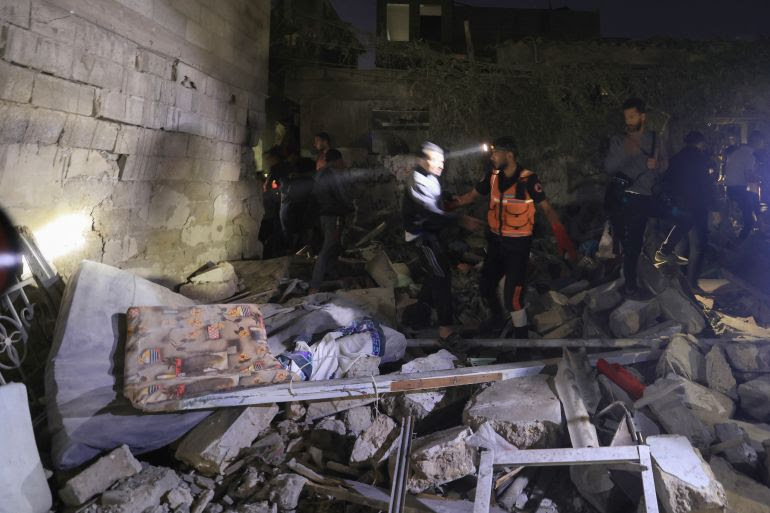
Palestinian emergency personnel and residents search the rubble of a building for survivors following Israeli strikes in Khan Younis in the southern Gaza Strip on November 15, 2023 [Mahmud Hams/AFP]
Read more about how staff at Gaza City’s al-Shifa Hospital have buried dozens of patients in a mass grave as fighting rages around the health complex, here.
Read more about how Hezbollah is calculating its fight against Israel with an eye towards its domestic audience, here.
Or listen to our podcast on what protests can achieve in terms of efforts to block US military aid to Israel, here.
Next week, the Scottish government will lead a debate in Holyrood on the situation after MPs in Westminster voted against a ceasefire.
Israel-Gaza war: Glasgow protestors march
Israel-Gaza war: Glasgow protestors march for immediate ceasefire
Israel-Gaza war: Glasgow protestors march for immediate ceasefire - BBC News
Israel-Gaza war: Glasgow protestors march for immediate ceasefire
Thousands of people have attended a pro-Palestinian rally in Glasgow to demand an immediate ceasefire in Gaza.

Demonstrators gathered in the east end of the city at Glasgow Green.
Protesters have held demonstrations in cities and towns across Scotland every weekend since hostilities began in the Middle East last month.
Next week, the Scottish government will lead a debate in Holyrood on the situation after MPs in Westminster voted against a ceasefire.
The SNP tabled the motion on Wednesday which was defeated by 125 votes to 294.
First Minister Humza Yousaf has been vocal in his support for a ceasefire and said he was "beyond angry" with MPs who refused to back an immediate end to the fighting.
Mr Yousaf, who was recently reunited with his Palestinian in-laws after they returned to Scotland after being trapped for four weeks in Gaza, warned MPs who did not back an immediate ceasefire were "on the wrong side of history".
Rabbi Pete Tobias told BBC Scotland News he would love to join a rally like the one in Glasgow, if he thought it was "genuinely" seeking to bring peace to the Middle East.
"But I believe that the framing of these marches as 'pro-Palestinian' and the nature of the banners and chants we see and hear makes them partisan, confrontational and frankly dangerous," he said.
Organisers estimated that around 18,000 people turned out for the pro-Palestinian event in Glasgow, arranged by a coalition of groups called the Gaza Genocide Emergency Committee.
Nadia Boukdir was one of the many people who came out to show their support for Palestine, despite the rain.
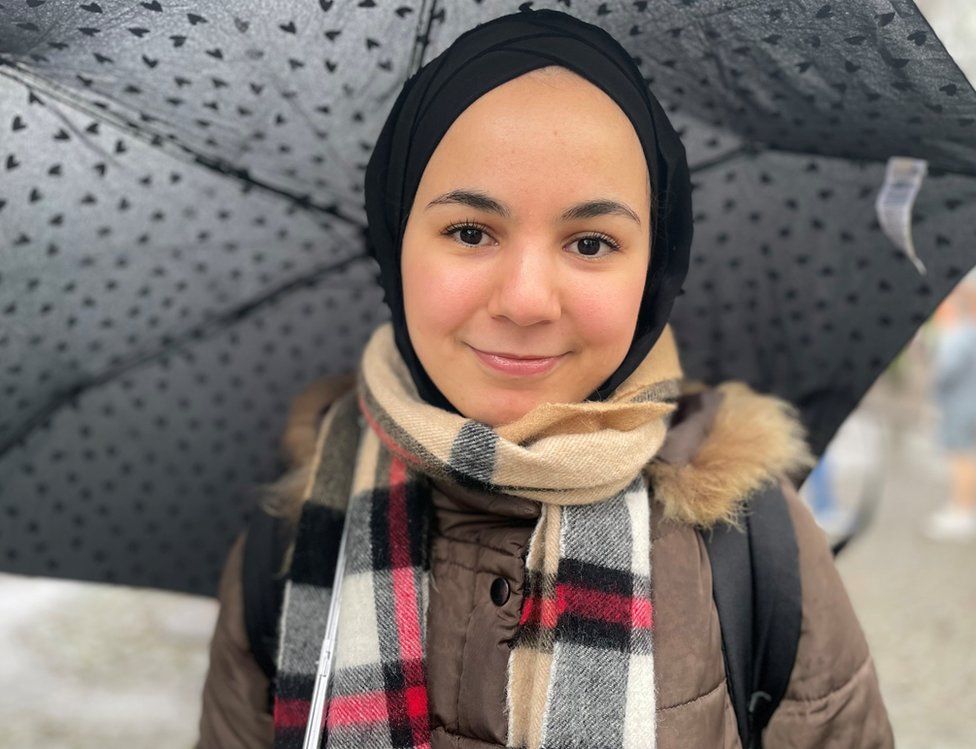
University student Nadia Boukdir said it had been "very tough" seeing the footage coming out of Gaza
The university student, who is originally from Morocco, is studying for her masters at Strathclyde. She told BBC Scotland News it had been "very tough" seeing the footage coming out of Gaza.
"We're trying our best to just speak and not stay quiet because our friends, our sisters, our brothers are dying, children are dying and families are being destroyed," she said.
Anna, a medical student from Edinburgh who is part of a group called medics for humanitarian justice, was also at the protest. She said she came out to show solidarity with her colleagues in Gaza.
Those attending the rally had been urged to write their names on their arms as a gesture of solidarity with the besieged population of Gaza, who have used the method so they can be identified and buried with relatives if they are killed.
"Our government's response has been abysmal and we're demanding that they call for a ceasefire now to protect our colleagues and their patients in Gaza," Anna said.
"They have been consistently attacking healthcare facilities, hospitals, people accessing aid, people distributing aid. This is beyond a war. This is a genocide and we want it stopped."
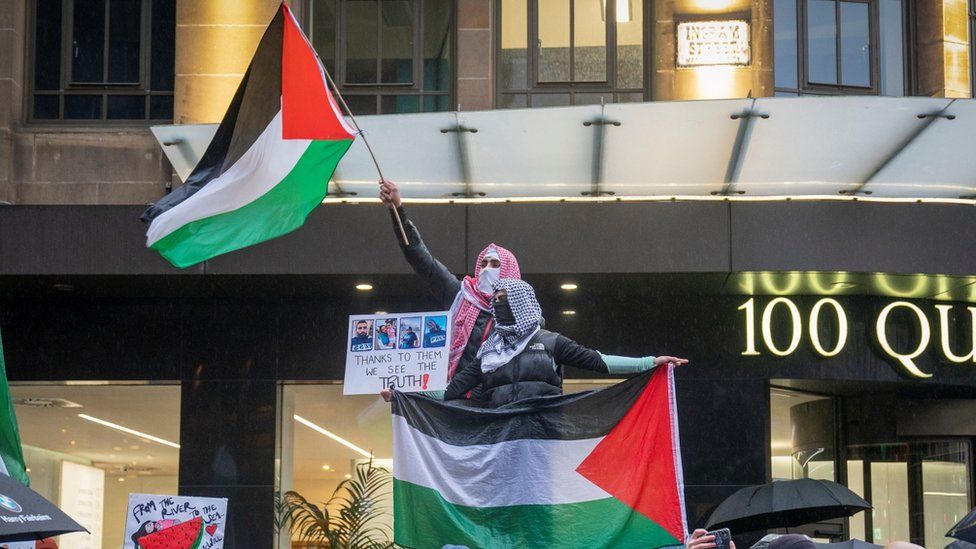
On Friday, Israel's prime minister said Israel was trying to minimise civilian casualties but had been "not successful", which he blamed on Hamas.
In an interview with CBS News, Benjamin Netanyahu said Hamas was firing at Palestinians trying to get safety.
More than 11,500 people have been killed in Gaza, Hamas's health ministry says, since Israel went to war after Hamas's attack on 7 October.
Sammy Stein, who chairs Glasgow Friends of Israel, said his group advocated for peace and supported both the Palestinian and Israeli people.
"We advocate for both people to have their own homeland, which is quite unusual because nobody else, certainly on this street and around the UK that advocates for both sides," he said.
"They tend to be either pro-Israeli or pro-Palestinian. We believe that you cannot have peace for one side and therefore if you want peace you need to have peace for both sides."
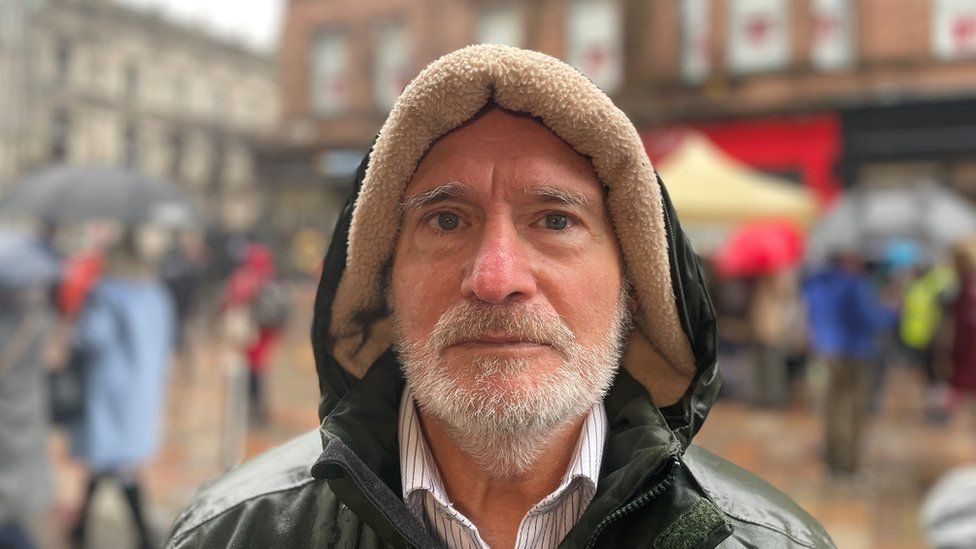
Sammy Stein said his group advocated for peace and supported both the Palestinian and Israeli people
Mr Stein said he thinks many of the people who have attend the demonstrations in Glasgow over the last few weeks have been genuine in their pursuit of peace.
"But many of them do not understand the complications of the conflict," he said.
"Now it's all very well for people to walk up and down with banners saying ceasefire unfortunately we know from what Hamas has said that they are not prepared to stop."
He added that he thought there was no point calling for a ceasefire if "you know that one side is not going to honour that ceasefire".
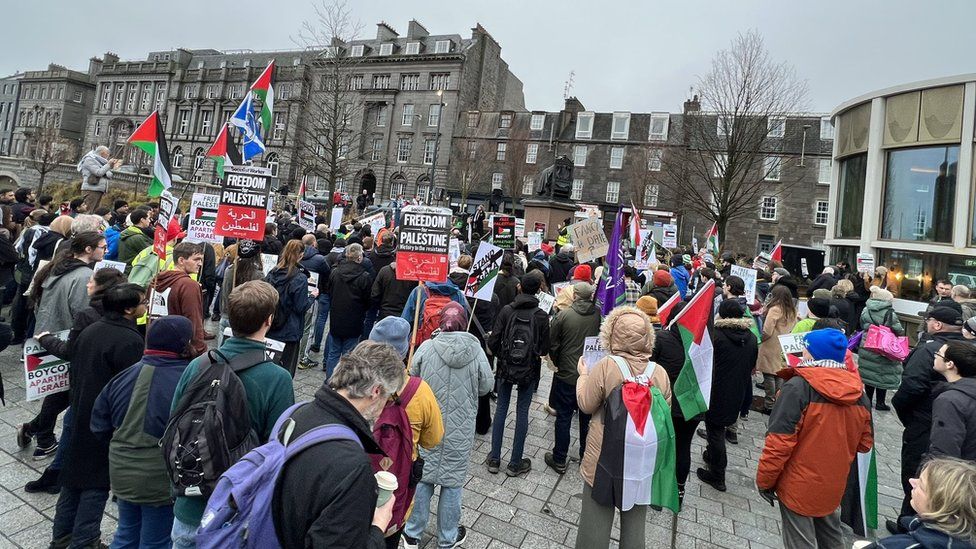
A similar rally was held in Aberdeen on Saturday
But that has not stopped similar protests taking place across the UK demanding an end to the fighting, with one in Aberdeen and another in Oxford.
On Friday, hundreds joined a school strike for Palestine, with rallies held in Glasgow, London and Bristol as part of a number of school walkouts organised by the campaign group Stop the War Coalition.
Scottish Greens councillor Blair Anderson said on X, the site formerly known as Twitter, that there would be "no punitive action" for any of the Glasgow schoolchildren who attended the rally.
A number of pro-Palestinian marches were also held across Scotland on Armistice Sunday last weekend.
More on Israel-Gaza war
- Follow live: Latest updates
- In Gaza: Lack of fuel causes blackout across Strip
- Reporting: BBC goes inside Al-Shifa hospital with the Israeli army
- Explained: The faces of hostages taken from Israel
- History behind the story: The Israel-Palestinian conflict
Related Topics
-
How did my MP vote on Gaza ceasefire?
-
Published2 days ago
-
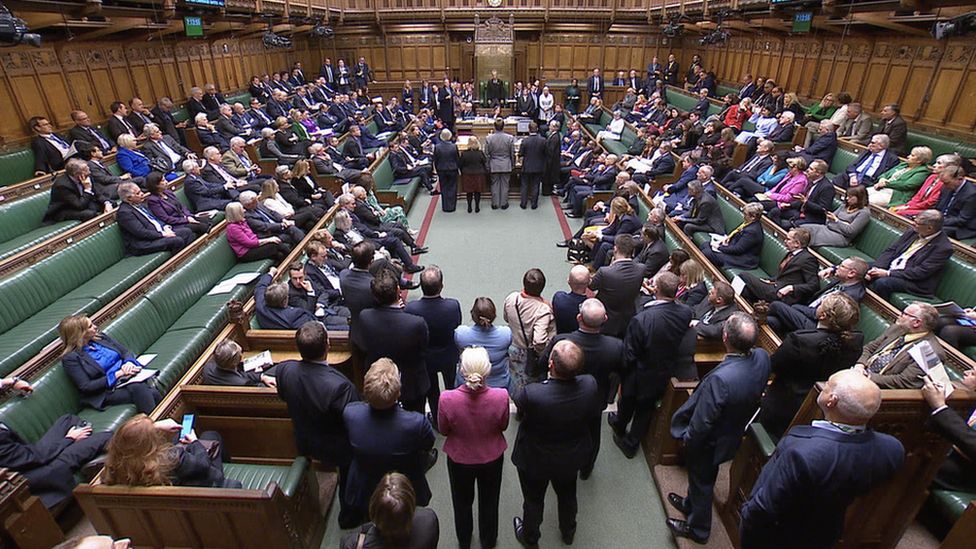
-
Where will anti-war demos be held on Armistice Day?
-
Published 10 November
-
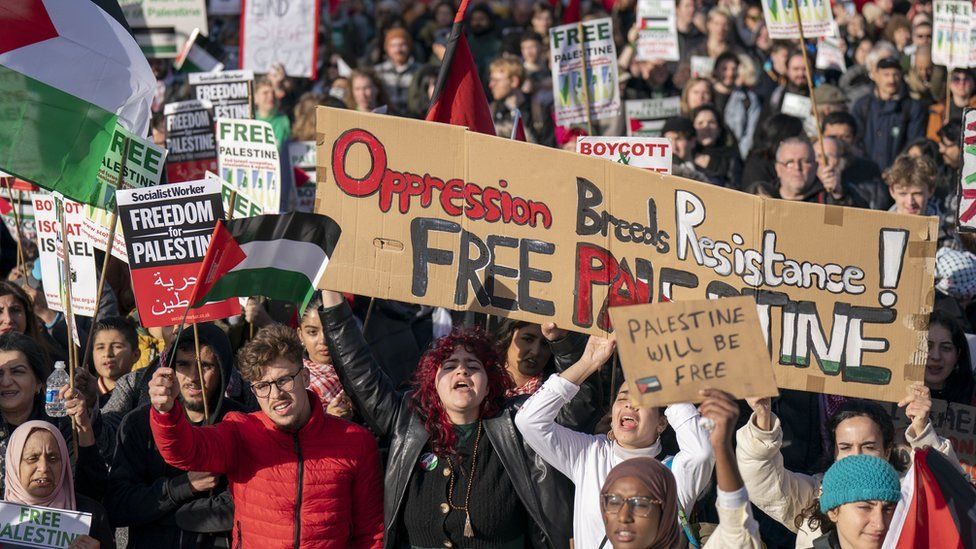
-
Humza Yousaf's in-laws arrive back in Scotland
-
Published 5 November
Unverified rumours of Russia arming Hamas persist, as war rages in Gaza
An expert renews claims that the October 7 Hamas attacks in Israel were ‘coordinated’ with Moscow, despite a lack of evidence.
Israel Thinking Putin Not Biden Is Best Bet For Preventing Iran Attack Ex-General On Hamas War

Senior Hamas officials Basem Naim and Moussa Abu Marzouk - along with Russia's Deputy Foreign Minister Mikhail Bogdanov (centre) - meet for talks on the release of foreign hostages, at a location given as Moscow, Russia in this image released on October 26, 2023 [File: Hamas Handout/Handout via Reuters]
Kyiv, Ukraine – When Hamas attacked Israel on October 7, the world’s attention shifted from the Russian-Ukrainian war to the Middle East conflict.
As the new war flared, Ukrainian officials and some observers were quick to accuse Moscow of meddling and even graver allegations – that it was supplying the Palestinian group with weapons.
They provided no evidence for their claims.
“Russia is interested in triggering a war in the Middle East, so that a new source of pain and suffering could undermine world unity, increase discord and contradictions, and thus help Russia destroy freedom in Europe,” said Ukraine’s President Volodymyr Zelenskyy at the time.
“We see Russian propagandists gloating. We see Moscow’s Iranian friends openly supporting those who attacked Israel. And all of this is a much greater threat than the world currently perceives. The world wars of the past started with local aggressions.”
Kyrylo Budanov, Ukraine’s top intelligence officer, alleged that Moscow may have provided Hamas with arms seized in Ukraine in what would appear as a perfect way to cover Russia’s fingerprints.
“We all clearly see that trophy arms from Ukraine have indeed been passed to the Hamas group. Mostly, it’s infantry weapons,” he told the Ukrainska Pravda newspaper on October 12.
But several experts have warned that despite decades-long amicability between Russia, Hamas, and Iran, there is no concrete proof of Russian arms supplies.
“We don’t see the main thing – a statement from the Israeli military and their demonstration of the Hamas arms they seized,” Nikolay Mitrokhin of Germany’s University of Bremen told Al Jazeera.
“So far, there’s no proof of sizeable arms supplies from Russia to Gaza,” he said. “They may very likely emerge after [Israel finishes] the clean-up of Gaza, but only then it will make sense to talk about them.”
On November 2, Aleksander Venediktov, of Russia’s Security Council, told the Ria Novosti news agency, “Such speculations are an open provocation.”
After the Hamas attacks, Israel began a relentless bombing campaign in Gaza, with the stated aim of crushing the Palestinian group that governs the densely populated enclave.
More than 1,200 were killed in Israel – among them more than a dozen Russian nationals – and more than 200 were captured in the Hamas attacks. Israel’s offensive in Gaza has killed more than 11,200 Palestinians.
Vera Mironova, a Russian-American security expert and author, has renewed the weapons claim, telling Al Jazeera that a former US senior security official is preparing to release a detailed report on the alleged link between the Hamas attack and Russia.
“It was absolutely coordinated with Moscow,” said Mironova, who is currently a research fellow at Harvard University.
Russian President Vladimir Putin “didn’t say things like ‘attack [Israel], but it was 100 percent coordinated”, she claimed.
Mironova alleged again that Russia supplied arms to Hamas – and did it via Iran and Syria to “distance itself” from the conflict.
“Russia has enough weapons to supply” its war effort in Ukraine and its allies in the Middle East, she claimed.
In return, she said, Iran is providing Russia with more inexpensive kamikaze drones so that their swarms are launched to wreak havoc and overwhelm Western-supplied air defence systems such as the US-made MIM-104 Patriot or the Norwegian-made NASAMS.
Al Jazeera was not able to independently verify Mironova’s allegations.
Undocumented allegations of weapons deliveries go both ways.
Last month, former Russian President and Prime Minister Dmitry Medvedev suggested that NATO arms sent to Ukraine “ended up” in the hands of Hamas fighters.
“So, NATO friends, game over? The weapons supplied to the Nazi regime in Ukraine are actively used in Israel,” Medvedev, who currently serves as deputy head of Russia’s Security Council, wrote on Telegram on October 9.
“It will only get worse. Expect missiles, tanks and soon planes from Kyiv on the black market,” he wrote.
According to Igar Tyshkevich, a Kyiv-based foreign policy expert at the Ukrainian Institute of the Future, Russia might have shipped Western arms seized in Ukraine, but the possible sources of these weapons could have been Afghanistan, where huge amounts of Western equipment were left after “the hurried withdrawal of Americans” in 2021.
Another possible source is Iraq, where Iran’s Islamic Revolutionary Guard Corps (IRGC) sided with pro-US Iraqi forces to fight ISIL (ISIS) in 2014, he told Al Jazeera. Syria could have been one more source of weaponry – given the past presence of US troops and President Bashar al-Assad’s political proximity to Iran, he said.
Hamas, for its part, has not commented on the continued claims about its supplies.
On October 26, Russia played host to Hamas leaders, a defiant move against the West likely aimed at demonstrating its diplomatic clout.
Israel decried the meeting in Moscow as “reprehensible”.
Days earlier, Hamas had thanked Putin for his diplomatic support. The Russian leader took days to condemn Hamas’s assault, and in his first comments on the crisis blamed the “failure of the United States’ policy in the Middle East”.
“[We] appreciate Russian President Vladimir Putin’s position regarding the ongoing Zionist aggression against our people and his rejection of the Gaza siege, the cutting of relief supplies, and the targeting of safe civilians there,” Hamas said in a statement on October 15.
Russia’s relationship with Palestine, Israel
Russia’s current ties with Israel and Hamas are predated by decades of Soviet relations.
Soviet leader Joseph Stalin welcomed the establishment of Israel in 1948, hoping it would become a pro-Moscow socialist nation.
But after Israel aligned itself with the West, Soviets began forging ties with Palestinian leaders – and trained hundreds of fighters in KGB schools.
Thousands more Palestinians studied in universities all over the USSR, from Tallinn to Tashkent – and one of them was Palestinian President Mahmoud Abbas.
He wrote a PhD dissertation titled “Hidden Face: a connection between Zionism and Nazism” in Moscow in 1982 under Yevgeny Primakov, an Arabist and then director of the Institute of Oriental Studies of the USSR Academy of Sciences. Primakov, a spy, would go on to become post-Soviet Russia’s foreign minister and then prime minister in the 1990s.
In 1967, the Kremlin called Israel a “Zionist warmonger” and severed diplomatic ties over the Arab-Israeli war.
But after millions of post-Soviet Jews moved to Israel, Israel began forging closer ties with Moscow.
According to Chatham House experts Nikolay Kozhanov and James Nixey, it is “likely that the Hamas–Israel war means the end of Russia’s decades-long policy of balancing between different players in the Middle East”.
In a recent article, they wrote that given Russia’s welcome of a Hamas delegation in Moscow in October, its refusal to condemn the initial Hamas attack, and its close alliance with Iran, “Tel Aviv no longer considers Russia an ally and would probably reject it as a mediator.” SOURCE: AL JAZEERA
KEEP READING
Had Absolutely No Idea Of The Attack Till It Was All Over V32
Israel didn’t know that Israeli-created Hamas was going to attack it, and now has a great excuse to destroy Gaza. Hmmm.
The NWO ruling class just took Zio-Islamic terrorism off the backburner.
Makia Freeman is the editor of alternative media / independent news site The Freedom Articles, author of the book Break Your Chains, the book series Controversial Truths Revealed (Cancer: The Lies, the Truth and the Solutions and 40 Incredible Real Life Alien Abductee and Contactee Experiences) and senior researcher at ToolsForFreedom.com. Makia is on Rumble and Odysee.
Freedom Articles Audio No.33HamasConvenientlyAttacksIsrael On 7th Oct 2023
Israel's Ben Gurion Canal Biggest project in the world Explained by The Nikky
Israel's Ben Gurion Canal Biggest project in the world Explained by The Nikky
Shocking insight into Israel's Apartheid - Roadmap to Apartheid
The Nikky Spoken in the Arabic Language
The Israelis are promoting a Red Sea-Mediterranean Sea waterway, the Ben Gurion Canal, as a rival to the Suez Canal. As per the Israelis, the distance between Eilat, a southern Israeli port and resort town on the Red Sea near Jordan, and the Mediterranean is not long and is in fact similar to the distance of the Suez connection between the Red Sea and the Mediterranean. Although it poses a direct threat to the Egypt’s Suez Canal but Suez Canal is shorter than the Israeli route and the Suez Canal rarely reaches 100 meters in height making it a better option. At the same time, Israel says this route is good for the ships which are unable to transit Suez Canal due to restrictions on the size of the ship. #suezcanal #israel #bengurioncanal #egypt
PalestinianshooternamedaftergrandfatherkilledbyIsraelisettler

Smoke rises as buildings in Gaza’s Beit Hanoun are bombed
Gaza’s largest hospital, al-Shifa, “is not functioning” after days without power, water or reliable internet, the World Health Organization said. Israeli Prime Minister Benjamin Netanyahu on Sunday defended his military’s assault on the enclave. Understand what’s behind the Israel-Gaza war.
Why is Israel at war with Hamas in Gaza? A basic explainer. - The Washington Post
|
Gaza being exterminated to make way for lucrative Ben Gurion canal that will cut across Israel to the Red Sea Natural News Report and Podcast Mike Adam They're Killing Children In Gaza The Song Written and Recorded by the INL News Group Verse One The Israel Gaza War... Why is it happening .. The Israel Gaza War... supported by the major Western Powers..
Verse Two All the Palestinians are having to flee from their homes Before the Israelites drop more bombs and rockets on Gaza All the sick are having to be moved from Gaza Hospitals Before another Israel Rocket hits their beds.. Chorus They're killing women and children.. In Broad Daylight.. They're killing women and children who are not even in the fight... Gaza has become a ‘graveyard’ for children amid Israeli attacks: UNAn average of 420 Palestinian children have been killed or injured every day in the Gaza Strip since October 7. 31 Oct 2023
Medics treat three wounded Palestinian children at Al-Aqsa Hospital following an Israeli air attack, in Deir el-Balah in the central Gaza Strip on October 24 [Majdi Fathi/NurPhoto via Getty Images] The Gaza Strip is now a graveyard for thousands of children, the United Nations has said, as it warned of the prospect of more dying of dehydration amid Israel’s war on the besieged enclave. The Israeli army has widened its air and ground attacks on Gaza – including houses and hospitals – which has been under relentless air raids since the surprise offensive by the Palestinian group Hamas on October 7 that killed 1,400 people in Israel, according to Israeli officials. More than 8,500 Palestinians, mostly children and women, have been killed, Gaza’s health ministry said. “Our gravest fears about the reported numbers of children killed becoming dozens, then hundreds, and ultimately thousands were realised in just a fortnight,” James Elder, a spokesperson for the United Nations Children’s Fund (UNICEF), said in a statement on Tuesday. “The numbers are appalling; reportedly more than 3,450 children killed; staggeringly this rises significantly every day.” “Gaza has become a graveyard for thousands of children. It’s a living hell for everyone else.” Catherine Russell, the executive director of UNICEF, also said that at least 6,300 children have been injured due to the Israeli attacks. This means that on average, 420 Palestinian children are killed or injured every day in the Gaza Strip, she explained. “These numbers should shock and shake us to the core,” Russell said. The body called for an immediate humanitarian ceasefire, with all access crossings into the Gaza Strip opened for the safe, sustained and unimpeded access of humanitarian aid, including water, food, medical supplies, and fuel. “And if there is no ceasefire, no water, no medicine, and no release of abducted children? Then we hurtle towards even greater horrors afflicting innocent children,” said Elder. The spokesman said that according to figures from health faculties in Gaza, some 940 children were missing. UN Office for the Coordination of Humanitarian Affairs (OCHA) spokesman Jens Laerke added: “It’s almost unbearable to think about children buried under rubble, but [with] very little opportunity or possibility for getting them out.” Save the Children: More children killed in Gaza than in all other conflicts since 2019 Threats beyond bombsAn Israeli blockade of the Strip has also cut Gaza off from fuel, electricity and water supplies, and reduced aid deliveries to a small trickle unable to satisfy the needs of the 2.3 million Palestinians there. Elder said the threats to children “go beyond bombs”, stressing that water and trauma are among other threats faced in the besieged Palestinian enclave. He warned that more than one million children in Gaza face a critical water crisis as Gaza’s daily water output is at five percent of its production capacity. “So, child deaths to dehydration, particularly infant deaths to dehydration, are a growing threat,” he said. On trauma, the spokesperson said: “When finally the fighting stops, the cost to children and their communities are going to be borne out for generations to come.” Elder stressed that before the current conflict began, more than 800,000 children in Gaza – three-quarters of its entire child population – were identified as in need of mental health and psychological support. At least 100 Palestinians killed after Israeli attack on Jabalia camp in northern Gaza Philippe Lazzarini, the commissioner-general for the UN Relief and Works Agency for Palestine Refugees (UNRWA), said that almost 70 percent of Palestinians killed in the Gaza Strip during the past three weeks were children and women. The number of children killed in Gaza since October 7 has surpassed the number of children killed annually across the world’s conflict zones since 2019, he said. “This cannot be ‘collateral damage,'” he said on Monday evening, adding that there is no safe place in the blockaded territory due to the heavy Israeli bombardment. SOURCE: AL JAZEERA AND NEWS AGENCIES
How are Palestinian children affected by the Israel-Hamas war.
How are Palestinian children affected by the Israel Hamas war P2
PRESS RELEASES TREATY BODIES UN Child Rights Committee condemns killing of children in Gaza Strip01 November 2023 UN Child Rights Committee condemns killing of children in Gaza Strip | OHCHR GENEVA (1 November 2023) – Grave human rights violations against children are mounting by the minute in the Gaza Strip, and there are no winners in a war where thousands of children are killed. The UN Committee on the Rights of the Child issued the following statement today, expressing outrage at the profound suffering of children: “The Committee on the Rights of the Child strongly condemns the escalation of attacks by Israel against civilian targets in the Gaza Strip, which had resulted in the deaths of more than 3,500 children since 7 October 2023. We also remain deeply concerned about children who continue to be held as hostages. Armed conflict harms children first and foremost and has lifelong effects on their physical and mental health, their development and ultimately the enjoyment of all their rights. Children are also harmed when they survive but lose parents and other family members and friends and witness catastrophic events. Despite the protection that should be provided to all children by international law, during the first month of this war, there have been devastating reports of acts that are forbidden by international humanitarian law, including maiming, injury, abduction, forcible displacement, deprivation of medical care, food, and water. According to article 38 of the Convention on the Rights of the Child, States have an obligation to respect and ensure respect for the rules of international humanitarian law, and to take all feasible measures to ensure the protection and care of children affected by armed conflict. The Committee calls for an end to the devastating harm being wreaked on children’s lives in the occupied Palestinian Territory. We add our voice to those calling for an immediate ceasefire. We urge the immediate release of child hostages, with their caregivers, as a first urgent phase towards the release of all hostages. We call on all parties to protect all children and provide all the necessary medical and protective support, including psychological support, to begin the long process of overcoming the consequences of these grave violations. We plead that all humanitarian convoys be permitted to enter the Gaza Strip and provide humanitarian aid to all children in need, as required by international law. The ceasefire should be the beginning of discussions aimed at establishing a just and lasting peace in the region so that all children can fully enjoy all their rights and the conditions for their development that respond to their intrinsic dignity as human beings.” For more information and media requests in Geneva, please contact: Vivian Kwok at This email address is being protected from spambots. You need JavaScript enabled to view it. or Background: The Committee on the Rights of the Child monitors States parties' adherence to the Convention on the Rights of the Child and its Optional Protocols on involvement of children in armed conflict, and on sale of children, child prostitution and child pornography. The Convention to date has 196 States parties. The Committee is made up of 18 members who are independent human rights experts drawn from around the world, who serve in their personal capacity and not as representatives of States parties. Learn more with our videos on the Treaty Body system and on the Child Rights Committee! Follow the UN Treaty Bodies on social media! We are on Twitter @UNTreatyBodies EXPLAINER
Israel’s ‘war against Gaza’s children’ explainedMore than 100 children have been killed every day since Israel started bombing the besieged Palestinian enclave on October 7.
Palestinian children sit amid rubble as others search a building destroyed by Israeli air raids in Khan Younis in the southern Gaza Strip [Mohammed Salem/Reuters] https://www.aljazeera.com/ One child is killed every 15 minutes in the Israeli bombings of Gaza, according to a Palestinian NGO, highlighting the toll the current war has exacted on children. More than 100 children have been killed every day since Israel started bombing the besieged Palestinian enclave on October 7 in the wake of the deadly Hamas attack. More than 3,400 Palestinians have been killed in the deadliest Israeli assault in decades. “We are witnessing a genocide in real time,” a spokesperson for The Defense for Children International – Palestine (DCIP) said. At least 14 children were reportedly also among the 1,400 Israeli victims of the October 7 Hamas attack. About 200 people taken captive by Hamas also include children. Israel has not released data on the demographics of all of those killed in that attack. Aren’t children legally protected in wars?Yes, they’re meant to be. Internationally accepted rules of armed conflict were passed under the Geneva Conventions in 1949, which state children must be protected and treated humanely. Israel ratified the conventions in 1951, just a few years after one and a half million Jewish children were killed in Europe during the Holocaust. But Israel does not recognise the 4th Geneva convention, which protects civilians fighting an occupation, as it as it doesn’t consider Palestine to be occupied land. The disproportionate use of military might in Gaza is being billed by Israel as a legitimate means to destroy Hamas. And so civilian deaths tallied up in the attacks, including children, do not qualify as war crimes, Israel claims
A third of people killed in Israeli attacks on Gaza are children [Al Jazeera] What effect is the war having on children?Parents, like Esra Abu Ghazzah, try to find ways to calm their children from the bombings and destruction around them. The 30-year-old mother told Al Jazeera her children, aged eight and two, have started to vomit after air strikes, and are also wetting the bed. Both are responses to heightened fear. The Abu Ghazzah children are part of the 95 percent of Palestinian children in Gaza who are living with the psychological effects of war. A research paper written by Palestinian psychologist Dr Iman Farajallah found that children who survive wars do not emerge unscathed and can pay a high price psychologically, emotionally and behaviourally. Some children display restlessness, regression or violent behaviour. For Samah Jabr, a 35-year-old mother of four in Gaza City, her eldest son, Qusay, who is 13, is her main worry. She told Al Jazeera: “He is very agitated and lashes out a lot these days. He jumps at any sound,” she said. “He can’t bear anyone speaking loudly, even if they’re joking. I try to tell him that this war will end.” Others may not want to leave their mothers’ sight, explains Farajallah. “They won’t even leave the room to go to the bathroom or kitchen without their mothers, and I’m talking about teenagers here.”
A 17-year-old witnessing the current war would have already lived through five wars since 2008 [Al Jazeera] (Al Jazeera) How have schools been affected?With the latest campaign of relentless bombing, education has once again been put on hold, as schools turn into makeshift shelters and survival becomes the only lesson. The United Nations is now sheltering about 400,000 displaced Gazans in its schools and other facilities, but the UN’s agency for Palestinian refugees, the UNRWA, which runs 278 schools in Gaza, has said at least four schools have suffered damage from Israeli bombing in which at least six people have been killed. The Education Above All (EAA) Foundation, which provides scholarships for Palestinians in need at its al-Fakhoora school in Gaza, was destroyed on Tuesday. The EAA released a statement saying that “collective punishment, reprisals, and attacks on civilians and civilian infrastructure are serious violations of international humanitarian law, and if deliberate they are war crimes”. How is the lack of food and water affecting children?Israel’s total blockade on Gaza has meant no food or water can enter the territory, but Israeli authorities have said they resumed water supplies to southern Gaza on Tuesday. Palestinians have said without electricity to operate the water pumps, the water crisis continues. With food and water rapidly running out, Gazans are prioritising whatever little water supplies they have for their children. Children are more at risk of dehydration, and malnourishment can further speed up the effects of having no water. A Jerusalem-based nutritionist with the World Food Programme (WFP) also told Al Jazeera that poor water sanitation can lead to children facing high risks of diarrhoeal diseases, which are the most common cause of dehydration and the globally leading cause of child mortality for under-fives. A lack of food at best affects cognitive function and energy levels, and at worst can lead to starvation and death. What are the long-term consequences?For those who don’t die in this war, they will have to learn how to survive without the rest of their family members, explained Ghassan Abu-Sitta, a British Palestinian surgeon working with Medical Aid for Palestinians in Gaza. He has called this war “a war against children”. “The repercussions of this war will not only affect the victims we have lost, some of which are still trapped under the rubble of their homes … but the psychological impact on us civilians and our children will be catastrophic,” Mohammad Abu Rukbeh, senior Gaza field researcher at DCIP, said in a statement on Tuesday. Is a ceasefire possible soon?As the bombardment continues, and borders stay sealed, international aid organisations including Save the Children have called for an immediate ceasefire. UNICEF’s statement read: “An immediate ceasefire and humanitarian access are the top priorities to allow much-needed aid to children and families in Gaza. “A child is a child. Children everywhere must be protected at all times and must never come under attack.” SOURCE: AL JAZEERA AND NEWS AGENCIES
Gaza residents lose entire families, fear more destruction
|

Ben Gurion Canal topographic maps

Ben Gurion Canal compared to the Suez Canal

The Ben Gurion Canal Project is a proposed canal project through the state of Israel. It would connect the Gulf of Aqaba to the Mediterranean Sea. David Ben Gurion, for whom it would be named, is considered the Founding Father of Israel and was the first Prime Minister of Israel.
The canal would rival the Suez Canal, which runs through Egypt and has had many disturbances in its history, such as the Israeli blockage through the Suez Canal and Straits of Tiran, Closure of the Suez Canal (1956–1957), Closure of the Suez Canal (1967–1975), and the 2021 Suez Canal obstruction. It would be slightly more than 50% longer than the 120.1 mi (193.3 km) Suez Canal, at around 182 mi (292.9 km).
Route
Starting from the southern end at the Gulf of Aqaba, by the port city of Eilat in Israel on the Israeli and Jordanian border, through the Arabah Valley for about 100 km between the Negev Mountains and the Jordanian Highlands and veers west before the Dead Sea basin (the Dead Sea is 430.5 metres (1,412 ft) below sea level), and heads through a valley in the Negev Mountain Range, then heads north again to get around the Gaza Strip and connect to the Mediterranean Sea
Arabah Valley by the Gulf of Aqaba





Southern Israel Gulf of Aqaba, Eilat, Israel, and Aqaba, Jordan
Arabah valley in 1959
NASA photos


1963 US feasibility study
In July 1963, H. D. Maccabee of the Lawrence Livermore National Laboratory, under contract to the United States Department of Energy, wrote a memorandum that explored the possibility of using 520 buried nuclear explosions to help excavate a canal through the hills in the Negev Desert. The document was classified until 1993.
See also
- Arab–Israeli conflict
- Red Sea–Dead Sea Water Conveyance
- High-speed railway to Eilat
- List of interoceanic canals
- List of places on land with elevations below sea level
-
References
- "Ship crisis revives Russian, Israeli talk of alternatives to Suez Canal". The Arab Weekly. March 30, 2021. Retrieved November 9, 2023.
- ^ Jump up to:a b "All you should know about the Israeli Ben Gurion Canal project". Frontier India. 2021-04-11. Retrieved 2023-08-15.
- ^ Guenot, Marianne (August 1, 2023). "The US had a plan in the 1960s to blast an alternative Suez Canal through Israel using 520 nuclear bombs". Business Insider. Retrieved 2023-08-15.
- ^ Maccabee, H. D. (July 1, 1963). "Use of Nuclear Explosives for Excavation of Sea-Level Canal Across the Negev Desert" (PDF). Retrieved November 9, 2023.
Ben Gurion Canal Project - Wikipedia
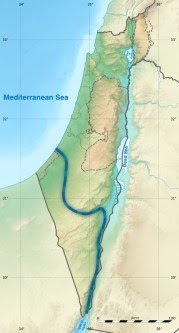
|
A competitor to the Suez Canal is being planned to cut across Israel and connect the Mediterranean Sea with the Red Sea. This canal would give the U.S. and Israel control over a key chokepoint in the world for military ships, grain exports, energy and other commodities. The planned route of the canal goes right through northern Gaza, and many analysts believe that Gaza is being destroyed and wiped out right now to make way for the construction of this canal, which would bring in billions of dollars a year for Israel (and grant Israel control over its access). |
An alternative to the Suez Canal is central to Israel’s genocide of the Palestinians
![A "Welcome to Egypt" sign can be seen across the Suez Canal on 30 March 2021 in Ismailia, Egypt. [Mahmoud Khaled/Getty Images]](https://ci6.googleusercontent.com/proxy/AhhhcCK57L-cXqFoFCnEQRbpJRVWu8nuDtZL_KHLITg82P5deqONgBG4ZAH3gTrWE41UHImF1RZVffbrb4pkKssiKcHPhwkw-FP8pIskxyCeQS0MWalh7d1d9DnQXcJFW3qmhYmTPqIIk0kM7OgL_R-7QX5nSvtFLJ43eXdLzMJz9vaBIa0RfTsG6eCrbs5trkF4s8AX44MPHnlLDg2A2wdTZhUxLVO1sen7LiA=s0-d-e1-ft#https://i0-wp-com.cdn.ampproject.org/i/s/i0.wp.com/www.middleeastmonitor.com/wp-content/uploads/2021/04/GettyImages-1232019401-1.jpg?fit=1200%2C800&ssl=1)
I hate conspiracy theories and fake news. They degrade my profession as a journalist and incite fear, hate and tribulation with the deliberate intention of causing a public backlash. Naturally, there have been all sorts of speculation and rumour around the war in Gaza and the 7 October surprise Hamas attack on the occupation state.
It has been said that the attack was two years in the planning in Gaza, a tiny patch of land riddled with Zionist infiltrators and spies who cajole, bribe and threaten ordinary Palestinians to betray their comrades.
So the question many are asking, with some justification, is why there was such a catastrophic intelligence failure which meant that the attack caught the Israeli military sleeping on the job. In terms of access to eavesdropping technology and defence there is probably no better-equipped military in the world other than in the US, and the Americans maintain secret supply bases in the Zionist state. Israel’s Mossad has earned itself a reputation of being among the finest intelligence gatherers and infiltrators in the world. And yet 7 October saw Hamas fighters breach security fences, invade a music festival and local kibbutzim, and fly in on paragliders without a single challenge. How did this happen?
Some of Israel’s most brutal attacks on innocent Palestinians are made citing “national security” and Israel’s alleged right to defend itself. If it was being attacked by another nation state, fair enough. But an attack by people living under Israel’s brutal military occupation provides no such legal defence. It doesn’t exist.
READ: 41 children killed in West Bank since 7 October, charity says
A good contact and friend of mine who watches the region’s events closely told me simply: “Follow the money.” And that is how, after being nudged and pointed in a variety of directions with annoyingly vague clues, I found myself pouring over a network of paper trails that led to the National Archives, where British secrets lie unseen for at least 30 years and in some cases much, much longer.
By the time they surface, it’s usually far too late to do anything as the guilty have taken their secrets to the grave, but some disclosures do explain the terrible behaviour of governments and rogue politicians. Many of my colleagues are waiting with bated breath for the March 2030 deadline to pass to find out how the Iraq war came about, and if our suspicions about former British Prime Minister Tony Blair’s role are as bad as we believe.

The Ben Gurion Canal Project
This particular paper chase, though, took me to the origins of the Suez Canal, which opened with a grand ceremony on 17 November 1869, 154 years ago this month. Today, 10 per cent of the world’s cargo ships sail through this strategic route between the Eastern Mediterranean and the Red Sea, heading to and from the Indian Ocean and connecting Europe and Asia.
Egypt owns, controls and operates the canal now, but it was once owned by French investors who held half of the canal company’s stock with Egypt’s ruler Sa’id Pasha holding most of the balance. In 1875, a cash crisis forced Sa’id’s successor, Isma’il Pasha, to sell the country’s shares to Britain. The Suez Company operated the canal until Egypt’s President Gamal Abdel Nasser tore up the concession in 1956 and transferred the canal’s operation to the state-owned Suez Canal Authority. There then followed the Suez Crisis, also known as the second Arab-Israeli war.
On the same day that the canal was nationalised Nasser also closed the Straits of Tiran to all Israeli ships. The crisis saw the UK, France, and Israel invade Egypt. According to pre-agreed plans prepared by Britain and France, Israel invaded Egypt’s Sinai Peninsula on 29 October 1956, forcing the Egyptians to engage its troops. This gave the excuse for the Anglo-French alliance to declare the fighting to be a threat to stability in the Middle East and enter the war, officially to separate the two forces but, in reality, to regain control of the Suez Canal and bring down the Nasser government.
What does it have to do with 7 October 2023? Well, it just so happens that Gaza is slap bang in the middle of the proposed path of a major second canal in the region.
READ: Only 27% of Israelis believe Netanyahu is suitable to head government
Gaza is currently being bombed to oblivion by the deranged Israeli leader Benjamin Netanyahu who wants to deliver The Ben Gurion Canal Project. Yes, Tel Aviv already has a name for the canal which was first proposed back in the Sixties. It would connect the Gulf of Aqaba on the Red Sea to the Mediterranean Sea, and would even be named after the first prime minister of Israel.
The canal would rival Egypt’s Suez Canal, causing a major financial threat to the country and this major trade artery. Remember the global trade disaster caused the huge container ship Ever Given got stuck in the famous canal in 2021? The Straits of Tiran and Suez Canal remained formally closed to Israeli vessels from the creation of Israel in 1948 and the Nakba until the Suez Crisis in 1956. When all land trade routes were blocked by Arab states, Israel’s ability to trade with East Africa and Asia, mainly to import oil from the Persian Gulf, was severely hampered. There have been other obstructions involving Israel forcing its closure in 1956-7 and 1967-75.
If it goes ahead, this new canal will be almost one-third longer than the 193.3 km Suez Canal, at around 292.9 km and an estimated cost of between $16 and $55 billion. Whoever controls the canal will have enormous influence over the global supply routes for oil, grain and shipping. With Gaza razed to the ground, it would enable the canal planners to literally cut corners and reduce costs by diverting the canal straight through the middle of the territory.
Around 12 per cent of the world’s trade passes through Suez on 18,000 ships a year, so you can imagine that a lot of countries will be lining up for a share of the deal. The Suez Canal is worth a staggering $9.4 billion to Egypt, which has enjoyed record-breaking revenues this year.
The only thing stopping the newly-revised project from being revived and rubber-stamped is the presence of the Palestinians in Gaza. As far as Netanyahu is concerned they are standing in the way of the project; a project which may earn him forgiveness in Tel Aviv for the intelligence and military shortcomings on 7 October. However, his treacherous sleight of hand will never by forgiven or forgotten by the people of Palestine given the horrors which have descended upon Gaza in the past few weeks.
READ: No evidence of Hamas seizing aid entering Gaza: US envoy
If this is all being done in the name of potential business deals then it compounds the political and diplomatic disgrace of the shameless Western governments who are complicit in the Palestinian genocide.
The biggest shame, though, belongs to Egypt. Already on the verge of bankruptcy due to President Abdel Fattah Al-Sisi’s profligacy, the emergence of a new canal would have a devastating impact on the Egyptian economy and its people. Heartless dictator Al-Sisi may come to regret putting his trust in Tel Aviv and Western governments above the interests and welfare of two million Palestinians in Gaza.
None of the Middle East leaders, Netanyahu, Biden and Sunak et al in the West emerge from the carnage in Gaza with any degree of integrity intact. Together, they are guilty of war crimes and crimes against humanity, or at the very least are complicit in such awful crimes leading to genocide.
This didn’t all begin on 7 October; the bombing of Gaza is simply the latest stage of Israel’s slow genocide of the people of Palestine, which has now got up to speed again with the full backing of the Western sponsors of the apartheid state. If they think that killing innocent children and women will bring peace, they are deluded.
Unbridled neoliberal capitalism has destroyed many countries and killed millions of people, and peace and security have rarely been the result. I hope that the evil people responsible will burn in Hell for what they have done to the children of Palestine, Iraq, Afghanistan, Libya, Syria and numerous other countries around the world. The survivors need freedom and justice now.
OPINION: Like the fabled phoenix, Gaza will rise from the ashes
The views expressed in this article belong to the author and do not necessarily reflect the editorial policy of Middle East Monitor.
A plan to join the Red Sea with Mediterranean — an alternative to the Suez Canal
Many decades ago, the Americans proposed to use nuclear weapons to blast a waterway through the Negev Desert. But the plan never progressed. This is why it did not — and why there is some talk about the ‘Ben Gurion Canal’ again as Israel pushes to destroy Hamas in Gaza
The Suez Canal through Egypt along with the proposed Ben-Gurion Canal through Israel occupied territory. (Wikimedia Commons)
It has been speculated that one of the reasons behind Israel’s desire to eliminate Hamas from the Gaza Strip and completely control the Palestinian enclave is to give itself the chance to better explore a dramatic economic opportunity that has been talked about for several decades, but for which peace and political stability in the region is an essential prerequisite.
The idea is to cut a canal through the Israeli-controlled Negev Desert from the tip of the Gulf of Aqaba — the eastern arm of the Red Sea that juts into Israel’s southern tip and south-western Jordan — to the Eastern Mediterranean coast, thus creating an alternative to the Egyptian-controlled Suez Canal that starts from the western arm of the Red Sea and passes to the southeastern Mediterranean through the northern Sinai peninsula.
Gaza Conflict and the Shadow of the Ben Gurion Canal Project
Gaza Conflict: Is the Ben Gurion Canal Project a Factor? (bnn.network)

Gaza Conflict and the Shadow of the Ben Gurion Canal Project
Tel Aviv, Israel – The landscape of the Middle East is once again the backdrop for heightened speculation as recent attacks in Gaza bring into focus the potential ramifications for the Ben Gurion Canal Project—a strategic endeavor steeped in historical significance. The unfolding events have prompted a closer examination of Israel’s strategic and economic objectives and how these may be driving the tension in the region.
Historical Context: Ben Gurion Canal Project
This ambitious project aims to chart a course from the Red Sea to the Mediterranean, echoing the historic initiatives such as the Suez Canal, which has long been a pivotal maritime route since its completion in the 19th century. The proposed Ben Gurion Canal not only signals Israel’s aspirations to claim a stake in global trade dynamics but also reflects the ongoing quest to expand its geopolitical influence, a narrative that has been part of the region’s history since Israel’s establishment in 1948.
A Rivalry Revived
The Ben Gurion Canal, if completed, would challenge the supremacy of the Suez Canal, potentially diverting commerce and reshaping economic currents. The strategic move can be seen as a continuation of the historical tensions that saw Israel and Egypt at odds during the Suez Crisis in 1956, where control over this critical passageway was a central issue.
Economic and Military Ambitions Amidst Historical Shadows
The canal project, with American and Israeli support, resonates with the historical patterns of military and economic alliances in the region. The potential storage of nuclear weapons in the Negev Desert could be interpreted through the prism of Israel’s longstanding policy of maintaining a qualitative military edge, which has historical roots in the country’s defense doctrine since its early years.
Security Concerns and Legacy of Conflict
The recent attacks by Hamas have cast a spotlight on Israel’s intelligence and defense capabilities—areas that have been honed in the shadow of historical conflicts and the constant threat of regional adversaries. These recent incidents have put the spotlight back on Israel’s preparedness and the delicate balance of power that it has sought to maintain in a historically volatile region.
Geopolitical Chess Moves
The involvement of regional powerhouses like Saudi Arabia, with its oil-based influence, and Egypt, with its control over the Suez Canal, adds layers of complexity reminiscent of past Arab-Israeli conflicts. These nations have been central to the historical ebb and flow of Middle Eastern geopolitics, often finding themselves in the midst of the region’s persistent state of flux.
A Unified Response to a Historical Cycle of Conflict
The Gaza conflict, persisting through decades, continues to call for a concerted response from Arab and Muslim nations. The potential influence of the Ben Gurion Canal Project on this conflict underscores the enduring nature of geopolitical strategies that have long shaped the history of the region.
Intersecting Paths of Progress and Peril
As the world watches the latest developments, the intricate connections between the Ben Gurion Canal Project and the longstanding Israel-Palestine conflict become apparent. These events are unfolding in a region where history is not just remembered but is a living force that continually informs and shapes the present geopolitical narrative.
Israel is bombing hospitals in Gaza with Israeli doctors’ approval
We, Palestinian doctors in Israel, are forced to watch in silence massacres unfolding, which some of our Israeli colleagues are encouraging.
“THEY LEFT US WITH NOTHING. ABSOLUTELY NOTHING.
Israel Gaza: Children must be off limits, says father of abducted kids - BBC News
Israel-Hamas war live: Hospital patients face ‘inevitable death’ – Minister
Wounded treated at Nasser hospital after latest attacks on Khan Younis
650 patients in danger at al-Shifa Hospital: Director general
Number of Palestinians killed in Israeli attacks surpasses 11,100: Health Ministry
The number of deaths in the ongoing Israeli military attacks since October 7 has surpassed 11,100, including more than 8,000 children and women, the government media office in Gaza said on Sunday.
Two premature babies die, 37 under threat at Gaza’s al-Shifa Hospital
‘Enough’, says Pope Francis, calling for the war to end
Pope Francis has called for the fighting between Israel and Hamas to end.
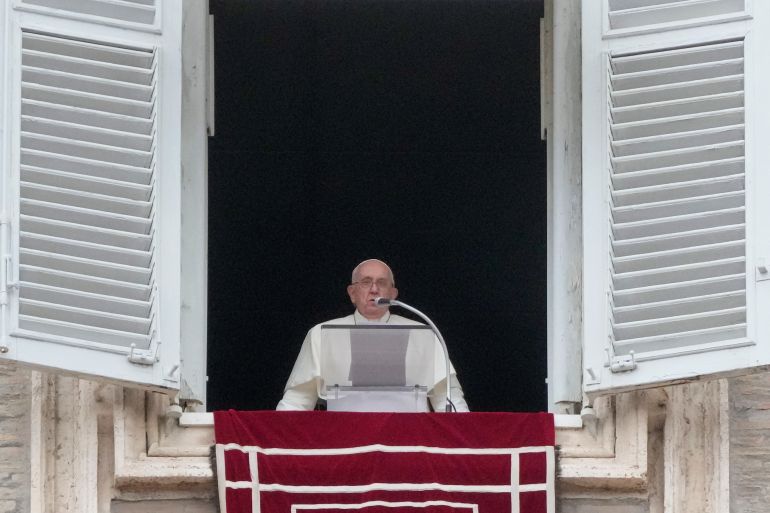
Pope Francis delivers the Angelus noon prayer in St. Peter’s Square at the Vatican, Sunday
“May the weapons fall silent, they will never bring peace, and let the conflict not spread. Enough, enough brothers, enough!” he said while offering prayers at the Vatican.
The Pope also said that the injured in Gaza should be helped and more humanitarian aid should be sent to the besieged enclave.
He added that the people taken as captives by Hamas on October 7 should also be released.
“Every human being, whether Christian, Jew, Muslim, or whatever religion, every human being is sacred, is precious in the eyes of God, and has the right to live in peace,” he said.
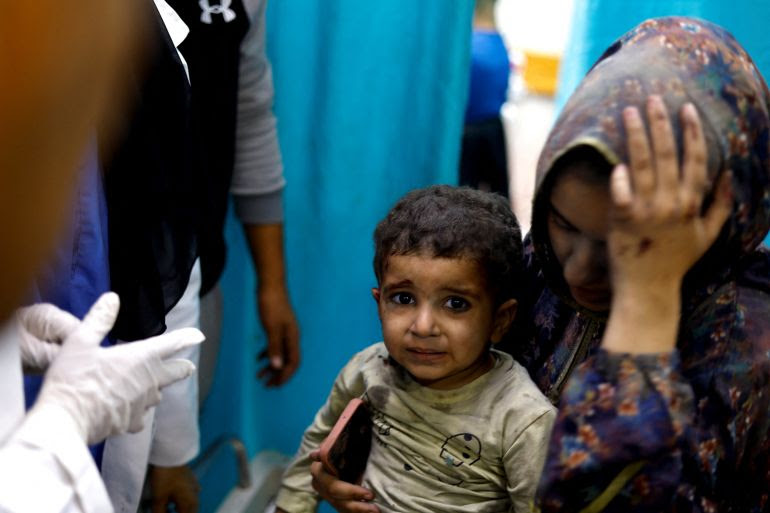
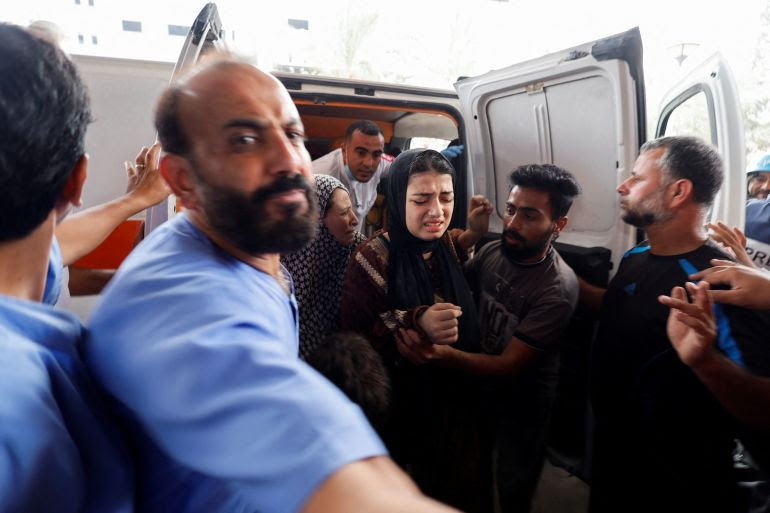
Israel Palestine Conflict History and Ethics (inltv.co.uk)
https://www.bbc.co.uk/news/
Israel-Hamas war live: Al-Shifa cardiac ward destroyed – Health officials
- Gaza City’s al-Shifa Hospital has been caught in Israel’s ground offensive and health officials said its cardiac ward has been destroyed.
- Palestine Red Crescent Society (PRCS) has announced that al-Quds Hospital is no longer operational due to a lack of fuel and a power outage.
650 patients in danger at al-Shifa Hospital: Director general
The director general of hospitals in Gaza has warned that the lives of hundreds of patients are at risk due to the catastrophic situation at al-Shifa Hospital.
About 650 patients, including 36 children, have their lives in danger, Muhammad Zaqout said at a press conference, calling on Egypt to save their lives.
Zaqout also confirmed the presence of “about 1,500 displaced people in the al-Shifa Medical Complex,” warning that “accumulation of garbage and medical waste, lack of water, and power outages threaten everyone’s life”.

Israeli Prime Minister Benjamin Netanyahu has denied that his country has any plans to reoccupy Gaza
Why Israel's push into Gaza is killing so many children
What is the Palestinian Authority and what is its relationship with Israel?
Set up in the mid-’90s as an interim body on the path to Palestinian statehood, the PA faces a crisis of legitimacy
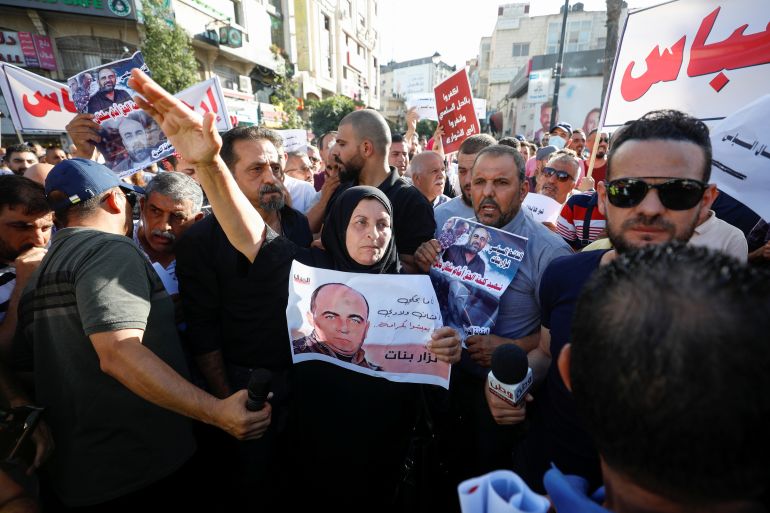
Palestinian demonstrators attend an anti-Palestinian Authority protest in Ramallah in the Israeli-occupied West Bank, July 3, 2021 [Mohamad Torokman/Reuters] 11 Oct 2023
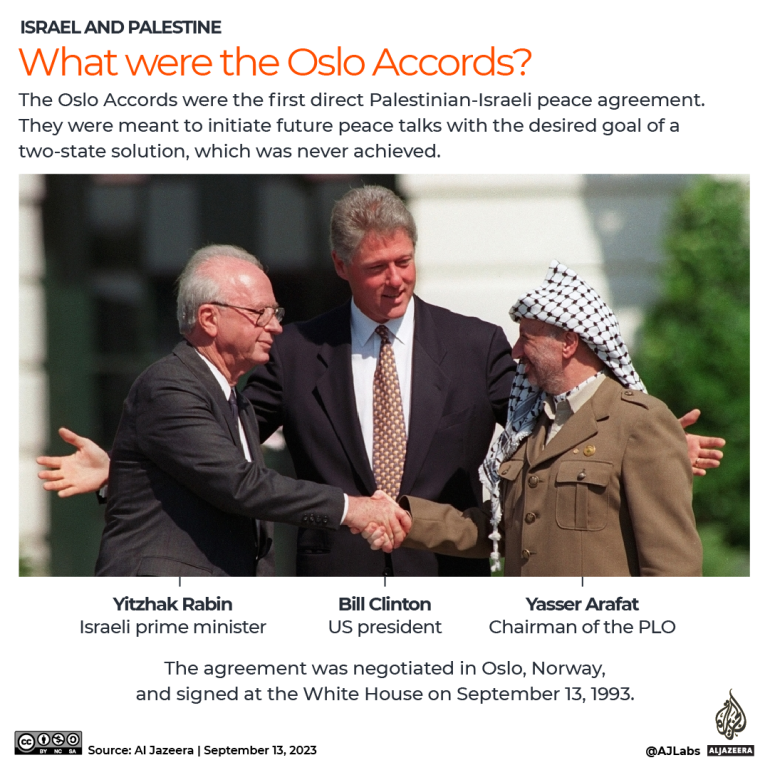
The Palestinian Authority (PA) is a governing body that has overseen parts of the Israeli-occupied West Bank since the mid-’90s. Its creation was supposed to pave the way to an independent Palestinian state, but today it is considered to have little real power and is operating under the control of the Israeli military.
The PA is dominated by Fatah, a secular political party founded by diaspora Palestinians after the 1948 Nakba, or “Catastrophe”. Fatah is also the driving force of the Palestinian Liberation Organisation (PLO), an umbrella organisation comprising several political parties, which claims to represent Palestinians worldwide.
Here’s what you need to know about the PA:
When was the PA formed and what was its aim?
The Palestinian Authority (PA) was set up in the mid-’90s as an interim governing body that would pave the way to setting up an independent Palestinian state on the 1967 borders, with East Jerusalem as its capital.
It was a product of the Oslo Accords between the Israeli government and the PLO – then led by Yasser Arafat. Today, those accords lie in tatters, with Israel expanding its settlements and bypassing roads in the West Bank and East Jerusalem in a de facto annexation of territory that should have been part of the putative state of Palestine. The last round of talks fell apart in 2014.
Are PA members elected?
The PA has an elected presidency and unicameral legislative council (parliament) called the Palestinian Legislative Council (PLC). However, there have been no presidential elections since incumbent Mahmoud Abbas was elected in 2005, and no parliamentary elections since 2006. The PLC has not convened since 2007, when Abbas’s Fatah split from rival group Hamas after a brief civil war. Abbas has ruled by decree ever since.
When his four-year term ended in 2009, Hamas declared Abbas illegitimate. Abbas argued that he should stay in post for a further year, so presidential and parliamentary elections could be held at the same time. To this day, he remains in post.
Who is Abbas?
Abbas, now 87, succeeded archrival Yasser Arafat as president of the PA. Still in mourning for Arafat, Palestinians nevertheless heralded Abbas, also called Abu Mazen, as a reformer who would bring peace.

The arrival of Abbas was also welcomed by Israel and the West, who viewed him as the best guarantor of stability in the region. In contrast to Arafat, Abbas had been critical of violence during the second Intifada.
KEEP READING
Why Israel's push into Gaza is killing so many children
- Israel-Hamas violence has killed more than 3,000 children. Almost all are Palestinians hit by Israeli airstrikes in Gaza.
- Children account for a startlingly high share of Palestinians reported killed in Gaza — roughly 41%.
- Gaza's demography, geography, and IDF military tactics have contributed to the high death toll.
Number of Palestinians killed in Israeli attacks surpasses 11,100: Health Ministry
The number of deaths in the ongoing Israeli military attacks since October 7 has surpassed 11,100, including more than 8,000 children and women, the government media office in Gaza said on Sunday.
“Due to the targeting of hospitals and the prevention of entry of any of the bodies or wounded, the Ministry of Health was unable, on Saturday, to issue accurate statistics for the numbers of dead and injured during the past hours,” the media office said in a statement.
“We recall that the occupation [forces] committed more than 1,130 massacres, and the number of casualties reached more than 11,100 dead, including more than 8,000 children and women, and the number of wounded was more than 28,000,” it said.
Earlier this week, Barbara Leaf, assistant secretary of state for Near Eastern affairs, told a House panel that the number of those killed in Gaza is likely “higher than is being cited”.
‘No place safe for children in Gaza’: UNICEF
Two premature babies die in al-Shifa Hospital: Director
Al-Shifa Hospital director Mohammed Abu Salmiya says two prematurely born babies died because of the power outage there.
“They were 39 children and now they’re 37 newborns,” Abu Salmiya told Al Jazeera.
The babies, who require oxygen devices, were moved from incubators to a bed in another part of the hospital that is “not conducive to newborns”.
“We’ve placed 10 prematurely born babies on one bed because these children need a particular temperature, they need particular respirators and ventilators, and particular nutrition,” he added.
These babies weigh somewhere between 800 to 2,000 grams (1.7 – 4.4 pounds), according to Abu Salmiya. He said doctors are struggling to save their lives and are now using “primitive methods”, but that this is “very unsustainable”.
Abu Salmiya said the Israeli army has ignored requests to transfer the newborns out of al-Shifa to a safe location.
Macron calls on Israel to stop killing Gaza's women and babies
Macron calls on Israel to stop killing Gaza's women and babies - BBC News
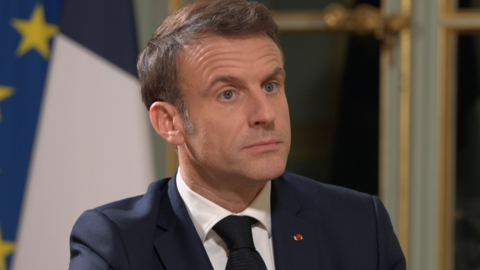
France's President Macron urges Israel to stop killing Gaza's women and children

Israel must stop killing babies and women in Gaza, French President Emmanuel Macron has told the BBC.
In an exclusive interview at the Élysée Palace, he said there was "no justification" for the bombing, saying a ceasefire would benefit Israel.
While recognising Israel's right to protect itself, "we do urge them to stop this bombing" in Gaza, he said.
But he also stressed that France "clearly condemns" the "terrorist" actions of Hamas.
France - like Israel, the US, the UK, and other Western nations - considers Hamas a terrorist organisation.
When asked if he wanted other leaders - including in the US and the UK - to join his calls for a ceasefire, he replied: "I hope they will."
After a month of Israeli bombardment and nearly two weeks after Israel launched a major ground offensive into the territory, Gaza's Hamas-run health ministry said on Friday that 11,078 people had been killed, while 1.5 million had fled their homes.
Israel says it attacks military targets in line with international law and takes steps to reduce civilian casualties, like issuing warnings ahead of strikes and calling on people to evacuate.
Speaking the day after a humanitarian aid conference in Paris about the war in Gaza, Mr Macron said the "clear conclusion" of all governments and agencies present at that summit was "that there is no other solution than first a humanitarian pause, going to a ceasefire, which will allow [us] to protect... all civilians having nothing to do with terrorists".
"De facto - today, civilians are bombed - de facto. These babies, these ladies, these old people are bombed and killed. So there is no reason for that and no legitimacy. So we do urge Israel to stop."
He said it was not his role to judge whether international law had been broken.
'We share Israel's pain'
What does Israel’s declaration of war mean for Palestinians in Gaza?
Israeli PM says his country is at a war after deadly Hamas attacks, greenlighting a possible ground invasion of Gaza.
What does Israel’s declaration of war mean for Palestinians in Gaza? | Gaza News | Al Jazeera
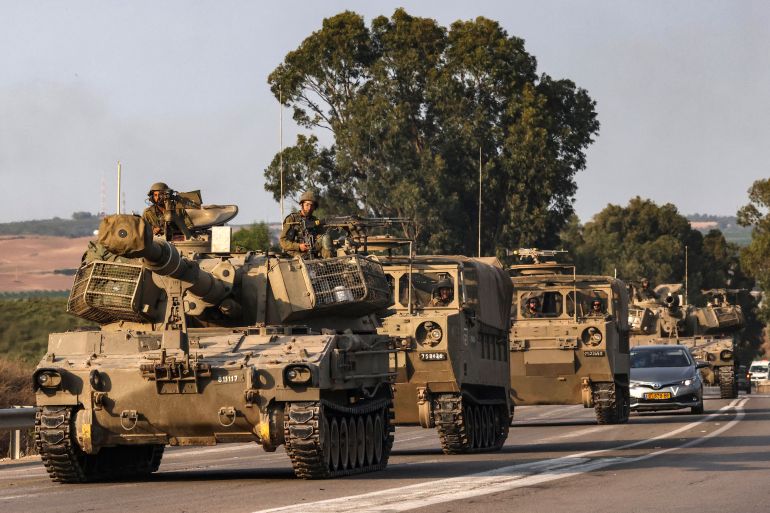
Israeli Prime Minister Benjamin Netanyahu on Sunday declared that his country was “at a war” after Hamas, the Palestinian group that governs Gaza, sent dozens of its fighters into Israel in one of the deadliest attacks in decades.
“We are at war. Not an ‘operation,’ not a ‘round,’ but at war,” Netanyahu said, adding that “the enemy will pay an unprecedented price”.
KEEP READING
list of 4 itemsMore than 700 Israelis, including dozens of soldiers, have been killed after Hamas fighters went on a rampage inside Israeli territory, taking many of them captive. Israel soon launched air strikes on Gaza killing more than 400 Palestinians.
Netanyahu has ordered mobilisation of more than 100,000 Israeli forces as it prepares for possible ground invasion of Gaza, which has remained under an Israeli air, land and sea blockade since 2007.
Since Israeli troops and settlers withdrew from Gaza in 2005, the besieged territory – home to two million people – has faced several rounds of deadly Israeli assaults. More than 2,000 Palestinians were killed in Israeli assaults in 2014. At least 73 Israelis, including 67 soldiers killed in the seven-week war.
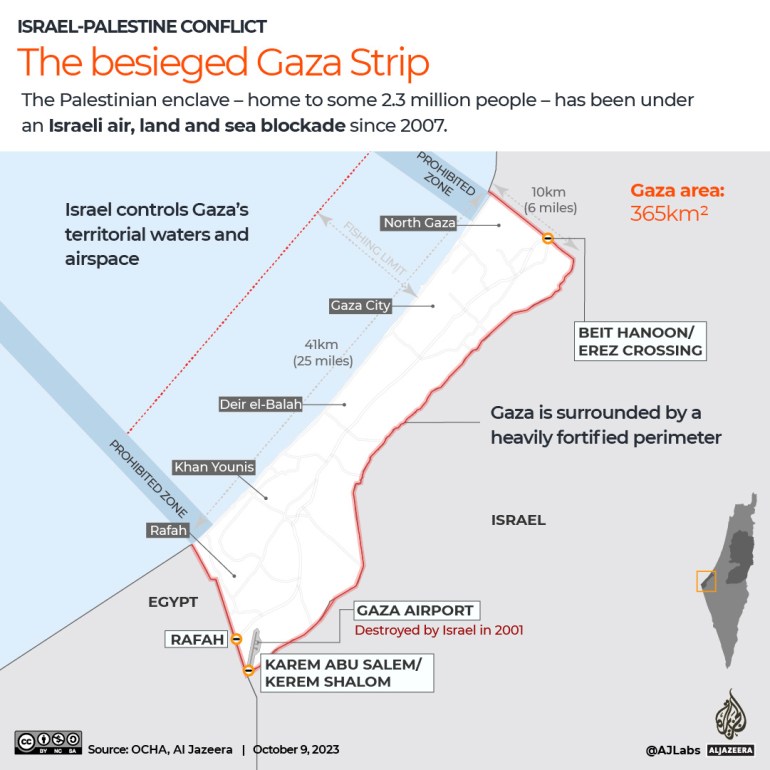
What does the war declaration mean?
Israel has launched military offensives in Gaza and Lebanon before, without a formal declaration. The declaration now essentially greenlights Israel’s intensified military action against Hamas.
Mohammed Jamjoom, Al Jazeera’s correspondent in West Jerusalem, said the Israeli cabinet’s approval of Netanyahu’s declaration of war means: “The prime minister and the defence minister can essentially make decisions going forward without having to consult the cabinet when it comes to every specific action.”
“It essentially formalises it, legalises the war going forward,” he said.
Meanwhile, Francesca Albanese, the United Nations special rapporteur on the occupied Palestinian territories, has warned of a “dangerous” narrative about the Israel-Hamas conflict that ignores the history of violence against Palestinians.
Could a ground offensive follow?
In his war declaration, Netanyahu told Israelis: “We will bring the fight to them with a might and scale that the enemy has not yet known,” with observers suggesting a land invasion by Israel could be imminent.
On Monday, Israel said a “total blockade”, including a ban on admitting food and fuel, would be imposed on the Palestinian enclave raising concerns about the well-being of its residents who have been facing incessant bombardments in the past two days.
More than 120,000 people in the besieged Palestinian enclave have been displaced due to the intense bombardment.
Al Jazeera’s senior political analyst, Marwan Bishara, warned that the situation between Israel and the Palestinians “is going to get much worse” in the coming days, with the possibility of an Israeli ground operation coming to a head.
Saleh al-Arouri, a Hamas leader, told Al Jazeera, they were ready for “the worst-case scenario”.
“We will continue to fight until we are rewarded with victory, freedom and independence,” he said.
“This is not a [hit-and-run] operation; we started an all-out battle. We expect fighting to continue and the fighting front to expand. We have one prime target: our freedom and the freedom of our holy sites,” he told Al Jazeera.
Al-Arouri said Palestinians have a right to freedom, to fight the Israeli occupation and to safeguard their holy sites.
Hamas does not recognise Israel and has been calling for Israel to end the 16-year blockade of Gaza. It wants the future Palestinian state on the basis of the 1967 borders. Israel captured large swathes of Palestinian territories in that war.
How have other nations responded to the war?
The rest of the world does not need to recognise or respond to a declaration of war in order for war to happen. Western nations led by the US have stood in solidarity with Israel while being mute on the decades of Palestinian suffering under occupation.
The US rushed to support its ally by ordering its naval vessels the Ford carrier strike group, laden with warplanes, to sail to the Eastern Mediterranean.
Regional countries have called for “an immediate halt to military operations in Gaza” and “the cycle of armed confrontation between the two sides” while China has urged both sides for “calm”.
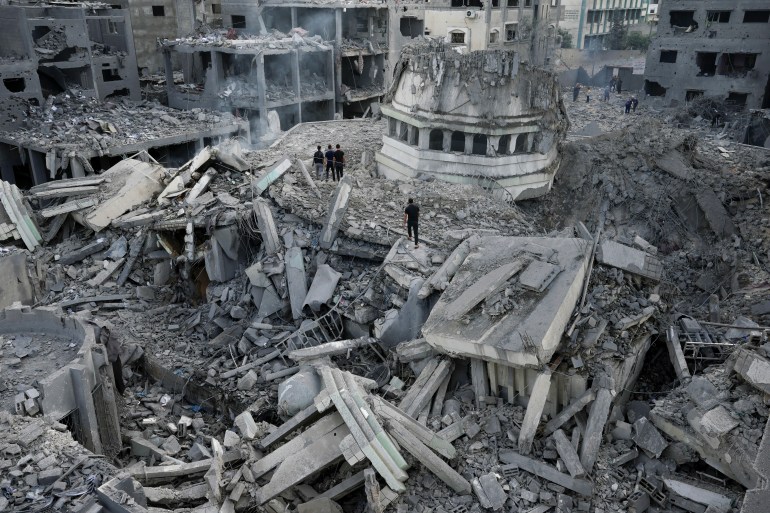
Palestinians inspect the rubble of the Yassin Mosque destroyed after it was hit by an Israeli airstrike at Shati refugee camp in Gaza City early Monday, October 9, 2023. [Adel Hana/AP Photo]
The United Nations Security Council (UNSC) on Sunday met behind closed doors in an emergency session amid the war between Israel and Hamas but failed to achieve the unanimity needed for a joint statement. A statement needs to be agreed upon by consensus.
Diplomats said members led by Russia were hoping for a broader focus than condemning Hamas.
Russia’s ambassador to the UN, Vasily Nebenzya, told The Associated Press that long-stalled negotiations between the two sides need to resume, whilst China’s ambassador, Zhang Jun, said it was important to come back to a two-state solution, where Israel and Palestine live side by side.
Saudi Arabia, a country that has been taking steps to normalise relations with Israel, also called for a peaceful two-state solution with an immediate cessation of the fighting.
Are all wars always officially declared?
No, since World War II, there have been very few declarations of war.
Previous assaults on Gaza and neighbouring Lebanon by Israeli forces have not been preceded by a declaration of war as is the case this time.
Russian President Vladimir Putin has never declared a state of war with Ukraine, but instead referred to the 2022 invasion, that continues today, as a special military operation.
The US didn’t declare going to war in Vietnam, justifying it as helping one side in an already existing civil war. The UK also did not declare the Falklands War (against Argentina) as it was seen as an act of self-defence which is a legal right under the UN convention.

PRESS RELEASES OFFICE OF THE HIGH COMMISSIONER FOR HUMAN RIGHTS
Bachelet alarmed by number of Palestinian children killed in latest escalation, urges accountability
11 August 2022
GENEVA (11 August 2022) – UN Human Rights Chief Michelle Bachelet today expressed alarm at the high number of Palestinians, including children, killed and injured in the occupied Palestinian territory this year, including in intense hostilities between Israel and Palestinian armed groups in Gaza last weekend.
In the past week, 19 Palestinian children have been killed in the occupied Palestinian territory, taking the death toll since the start of the year to 37. Seventeen children were killed during the Gaza hostilities from 5-7 August, and two more were killed on 9 August in Israeli law enforcement operations in the West Bank.
“Inflicting hurt on any child during the course of conflict is deeply disturbing, and the killing and maiming of so many children this year is unconscionable,” said Bachelet.
The civilian cost of the latest escalation in Gaza from 5-7 August was heavy. The UN Human Rights Office has verified that among the 48 Palestinians killed, there were at least 22 civilians, including 17 children and four women. The status of 22 fatalities remains undetermined. Of the 360 Palestinians reported injured, nearly two-thirds were civilians, including 151 children, 58 women and 19 older people. In a number of incidents, children were the majority of casualties.
A number of Israeli strikes hit prima facie civilian objects, causing civilian casualties and damage to civilian objects.
“International humanitarian law is clear. Launching an attack which may be expected to incidentally kill or injure civilians, or damage civilian objects, in disproportionate manner to the concrete and direct military advantage anticipated, is prohibited. Such attacks must stop,” said Bachelet.
In violation of international humanitarian law, Palestinian armed groups also launched hundreds of rockets and mortars in indiscriminate attacks, causing civilian casualties and damage to civilian objects in Israel as well as in Gaza. According to the Israeli authorities, a total of 70 Israelis were injured.
While the ceasefire for the latest escalation in Gaza is holding, tensions remain very high in the West Bank, where four Palestinians were killed and 90 others were injured by live ammunition fired by Israeli forces on 9 August. Among those killed was a 16-year-old boy, shot by Israeli soldiers during an arrest raid in Nablus which also left 76 injured. Another 16-year-old boy was shot and killed by Israeli soldiers after some Palestinians threw stones and fireworks at them at a checkpoint in Hebron.
Bachelet said the widespread use of live ammunition by Israeli forces in law enforcement operations across the West Bank, including East Jerusalem, in 2022 has led to an alarming increase in Palestinian fatalities. The UN Human Rights Office in the occupied Palestinian territory has this year documented the killing of 74 Palestinians, including 20 children. In many incidents Israeli forces used lethal force in a manner that appeared to be in violation of international human rights law, she added.
The High Commissioner called for prompt, independent, impartial, thorough and transparent investigations into all incidents where any person was killed or injured.
“An almost total lack of accountability persists in the occupied Palestinian territory – whether for violations of international humanitarian law by all parties in hostilities in Gaza, or for recurring Israeli violations of international human rights law and the law of occupation in the West Bank, including East Jerusalem, including incidents of unnecessary and disproportionate use of force,” Bachelet said.
“This climate of impunity, along with the long-standing violations, drives the cycle of violence and the recurrence of violations.
“The situation in Palestine is extremely fragile, and events such as in Nablus risk igniting further hostilities in Gaza. The utmost restraint is necessary to prevent further bloodshed, including by ensuring that firearms are used strictly in compliance with international standards,” the High Commissioner said.
ENDS
For more information and media requests, please contact:
Ravina Shamdasani - + 41 22 917 9169 /
This email address is being protected from spambots. You need JavaScript enabled to view it. or
Liz Throssell + 41 22 917 9296 /
This email address is being protected from spambots. You need JavaScript enabled to view it. or
Jeremy Laurence + +41 22 917 9383 /
This email address is being protected from spambots. You need JavaScript enabled to view it. or
Marta Hurtado - + 41 22 917 9466 /
This email address is being protected from spambots. You need JavaScript enabled to view it.
Tag and share
Twitter @UNHumanRights
Facebook unitednationshumanrights
Instagram @unitednationshumanrights
PRESS RELEASES HUMAN RIGHTS COUNCIL
Council hears from Special Representatives on violence against children and on children in armed conflict
12 March 2014
Human Rights Council
AFTERNOON
12 March 2014
The Human Rights Council this afternoon held a clustered interactive dialogue with the Special Representative of the Secretary-General on violence and against children, and the Special Representative of the Secretary-General for children and armed conflict.
Marta Santos Pais, Special Representative of the Secretary-General on violence and against children, said that there had been a clear increase in the number of countries with a policy agenda to prevent and address violence. Nonetheless, progress had been too slow, too uneven and too fragmented for a genuine breakthrough to take place. There was clearly no ground for complacency; instead the gains which had been made ought to be consolidated.
Leila Zerrougui, Special Representative of the Secretary-General for children and armed conflict, said that the intensity of armed conflict had a disproportionate and intolerable effect on children. In all countries affected by armed conflict children formed the majority, or close to majority, of the population. If nothing was done to protect them, the future of those countries was in danger. In crisis situations education was too often viewed as a secondary need – the essential and protective role that education could play in times of armed conflict had to be recognized.
In the ensuing dialogue speakers commended positive results in the demobilization of children in armed conflict through the work of the United Nations, regional organizations and other actors, as well as the new Children, not Soldiers campaign. However, deep concerns were voiced about the devastating impact of armed conflict on children as well as the increasing trend of attacks on schools and hospitals. On delegation called for a panel discussion on violence against children to be held at the next session of the Council.
Speakers said that sexual violence against children deserved zero tolerance, whether in peace or in war time. States had to live up to their commitment of providing education to all children – a fundamental right – including during conflict, speakers said. A concerted approach to encourage States to ratify and implement relevant regional and international human rights instruments was called for, and States were urged to mainstream norms for protection of children into national laws and policies.
Speaking in the discussion were Ethiopia on behalf of the African Group, Yemen on behalf of the Arab Group, Costa Rica on behalf of Community of Latin American and Caribbean States, European Union, Pakistan on behalf of the Organization of the Islamic Conference, Croatia in a joint statement with Austria and Slovenia, Algeria, Austria, Estonia, Paraguay, Montenegro, United Nations Children’s Fund, Romania, Portugal, Australia, Italy, Slovenia, Georgia, Norway, Latvia, Qatar, Sri Lanka, and Azerbaijan.
China and Saudi Arabia spoke in a right of reply.
Tomorrow, Thursday 13 March, the Council will hold its annual Full-Day Discussion On The Rights Of The Child, starting at 9 a.m. The Council will also hold a meeting between noon and 3 p.m. in which it will conclude this clustered interactive dialogue with the Special Representatives of the Secretary-General on violence against children, and on children and armed conflict.
Documentation
The Council has before it the annual report of the Special Representative of the Secretary-General on Violence against Children, Marta Santos Pais (A/HRC/25/47).
The Council has before it the annual report of the Special Representative of the Secretary-General for Children and Armed Conflict, Leila Zerrougui (A/HRC/25/46).
Statement by the Special Representative of the Secretary-General on Violence against Children
MARTA SANTOS PAIS, Special Representative of the Secretary-General on Violence against Children, said the recently issued Global Survey on Violence against Children was the first comprehensive review of progress since the 2006 United Nations Study on Violence against Children. The Global Survey confirmed that children’s protection from violence was gaining increasing recognition on the international, regional and national agendas. At the international level, there was an ever-growing ratification and incremental implementation of treaties on children’s protection from violence. In that context, the 2013 United Nations Treaty Event was devoted to the rights of the child and provided a successful platform to promote accelerated progress in the ratification of the Optional Protocols to the Convention on the Rights of the Child. Child-friendly versions of those two protocols had been issued in order to promote their dissemination and understanding among young people.
The Global Survey Special paid attention to normative, policy and institutional developments at the national level. There had been a clear increase in the number of countries with a policy agenda to prevent and address violence, from 47 in 2006 to more than 80 today. Nonetheless, progress had been too slow, too uneven and too fragmented for a genuine breakthrough to take place. The risk of violence against children remained present in every setting, including those where children should be safest – in schools, in care and justice institutions and also within their homes. Child maltreatments, exploitative work, early and forced marriages, and trafficking in children all remained worrying and wide-spread occurrences. Vulnerable children, including disabled and children living on the street, were at special risk of exposure to violence. There was clearly no ground for complacency; instead the gains which had been made ought to be consolidated.
Violence in the community, violence associated with criminal activities and violence perpetrated in the privacy of the home were all deeply interconnected. Violence caused fear, insecurity and harm to families and communities, and particularly to children. One of the most important lessons of the Millennium Development Goals’ review had been that countries affected by violence tended to lag behind: in those countries, people were more likely to be malnourished and to live in poverty, rates of child mortality were huge and children were three times more likely to be out of school. The human dignity of children and their rights to protection from violence had to be at the heart of a global effort, just as they had to be at the core of national strategies. In the year of the twenty-fifth anniversary of the adoption of the Convention on the Rights of the Child it was an opportunity not to be missed.
Statement by the Special Representative of the Secretary-General for children and armed conflict
LEILA ZERROUGUI, Special Representative of the Secretary-General for children and armed conflict, said that less than a week ago the Security Council held a public debate on the fate of children in armed conflict. That was evidence that the fate of those children called for a reaction from the international community and should be a source of concern for it. The intensity of armed conflict had a disproportionate and intolerable effect on children. In Syria, South Sudan, Central African Republic, Somalia, Iraq, Afghanistan and many more countries, thousands of children were recruited, killed, raped, mutilated and forced to commit atrocities. Because of their association with armed groups they were often detained without guarantees of a fair trial. In all countries affected by armed conflict children formed the majority, or close to majority, of the population. If nothing was done to protect them, the future of those countries was in danger.
All hope was not lost. Some countries that had experienced similar tragedies had been able to find a way out and found peace, reconciliation and development. At field visits that had allowed direct contact with national authorities, every opportunity had been taken with donors to mobilize support for action plans, and also political support. The campaign Children, Not Soldiers was launched last week, in partnership with the United Nations Children’s Fund. It was important to continue commitments to work with non-State armed actors to put an end to serious violations against children. Multidimensional strategies could support that comprised political, military and judicial areas of work. In crisis situations education was too often viewed as a secondary need and everything in our power had to be done to recognize the essential and protective role that education could play in times of armed conflict.
Clustered Interactive Dialogue
Ethiopia, speaking on behalf of the African Group, noted with satisfaction the positive results achieved in terms of the demobilization of children in armed conflict, notably through the synergies of the work of the United Nations, regional organizations and other actors. The African Group was concerned about the recruitment and use of child soldiers, killing and maiming, and violence in school. It called for a concerted approach including ratification and implementation of relevant regional and international human rights instruments. Yemen, speaking on behalf on the Arab Group, said juvenile justice was an important issue which was unanimously accepted by organs around the world, but its implementation had to be tailored to national conditions of every country. It drew the Council’s attention to the proposal presented by Algeria during the session to convene a discussion on violence against children. Costa Rica, speaking on behalf of the Community of Latin American and Caribbean States (CELAC) deplored the fact that the progress in fighting violence against children had been slow; good governance and management of good economy required grounding in national laws and strategies. CELAC was concerned about the devastating impact of armed conflict on children and appealed on the international community to strengthen the international humanitarian law protection.
European Union was particularly concerned by the increasing trend of attacks on schools and hospitals. It raised alarming situations in Syria, and the recruitment by the Lord’s Resistance Army (LRA) in the Great Lakes region and armed groups in the Central African Republic. It asked about prospects for restorative justice programmes where rule of law, juvenile delinquency and deeply rooted social norms posed a serious challenge. Pakistan, speaking on behalf of the Organization of the Islamic Conference (OIC), said that as the international community considered the future global development agenda beyond 2015, violence against children should be recognized as a priority and restorative justice mechanisms should be put in place. Pakistan urged States to mainstream norms for protection of children into national laws and policies. It noted progress in fighting violence against children in Syria, South Sudan, Congo and Yemen.
Croatia, in a joint statement with Austria and Slovenia, stressed that sexual violence against children deserved zero tolerance, whether in times of peace or war. It was a widely under-reported crime, due to the stigma associated with sexual abuse. Croatia, Austria and Slovenia thus firmly supported the United Kingdom’s Initiative on Preventing Sexual Violence in Conflict. States had to live up to their commitment of providing education to all children, including during the conflict. Algeria spoke about restorative justice and said it intended to submit a draft resolution calling for a panel discussion on violence against children at the next session of the Council, in June. It asked about operational strategies to fight the use of schools for military purposes. Algeria noted that its minimum age for recruitment to armed forces was 18. Austria said it placed a strong focus on diverting juvenile offenders away from the justice system, and thanked Ms. Santos Pais for valuable recommendations in that regard. Along with Thailand, Austria proposed an inter-governmental process to elaborate practical measures to prevent violence against children in crime prevention and criminal justice.
Estonia said sharing expertise through practical cases, which illustrated some of abusive practices, would help better address violence against children and promote the child-interest approach. Estonia’s Plan for Reducing Violence 2010 to 2014 aimed to stop violence against children and the actions of juvenile offenders. Estonia was glad to see the emphasized role of the International Criminal Court and other ad-hoc tribunals for children in armed conflicts. Paraguay expressed its concern over the six grave violations of children’s rights in armed conflict, but was pleased to see the increasing number of States parties to the Optional Protocols to the Convention on the Rights of the Child. Paraguay had signed the third Optional Protocol and started the process of ratification. It was also increasing investments in children and adolescents to seven per cent of its gross domestic product. Montenegro saw violence against children as a growing problem, which often went unseen, unheard and unreported. Montenegro encouraged new ideas to focus on collective actions to ensure the rights of child to live free from violence, and had undertaken many steps in that regard. There was a need to establish a mechanism for monitoring the number of cases and scope of abuse, negligence and maltreatment.
Australia welcomed the launch of the Children, Not Soldiers campaign to end recruitment and use of children by Government forces by 2016 and expressed concern that 46 non-State actors still used the practice. Australia would use its term in the United Nations Security Council to strengthen the protection framework for children affected by armed conflict. United Nations Children Fund said it would continue to work together to end and prevent child recruitment and use both by State forces and armed groups, to support children in their reintegration into their families and communities and to stop other grave violations against children. United Nations Children Fund subscribed to the Special Rapporteur’s eight key steps for accelerating progress in the protection of children from violence and welcomed her emphasis to place children at the centre of the post-2015 global development agenda. Romania was deeply concerned that in many countries in the world there were still children living in exceptionally difficult conditions and that all forms of violence against children persisted on a large scale.
Portugal appreciated the work on preventing and eliminating violence against children in the justice system and on developing the concept of restorative justice and its ability to rehabilitate and reintegrate young offenders. Italy expressed concern about the spread of sexual violence committed against children in armed conflict and stressed that only the certainty of accountability for perpetrators could significantly improve their protection and dissuade armed groups from recruiting child soldiers. Slovenia welcomed the Children, Not Soldiers campaign: although much had been achieved, children were still recruited and used by armed forces and groups. Slovenia asked the Special Rapporteur on violence against children how the Council could contribute to her efforts to make human rights education more available to children.
Latvia said violence against children had serious and longstanding consequences. It was widely understood that every interaction a child had each day influenced the actions and decisions of the adult that the child would become. Latvia was concerned about reports on continuous attacks on schools and the use of schools for military purposes. Qatar condemned any form of violence against children and called for an end of all such violence, nationally or internationally. It highlighted the tragic situation of children in the occupied Palestinian territories. Sri Lanka said notwithstanding the complexities and unpredictability of the protracted terrorist conflict, it paid particular attention to safeguarding the rights and needs of children by capacity building and mainstreaming local structures and services to children and pregnant mothers in conflict-affected areas, including some areas under the control of terrorists.
Georgia said numerous cases of violations of the rights of children continued in occupied regions of the country. The occupying regime deprived local populations of their native languages and teachers that disobeyed directions were often subject to harassment by the occupying regime. The least that could be done was to establish a human rights monitoring mechanism on the ground. Azerbaijan said that the promotion and protection of the rights of children, particularly in armed conflict, was highly sensitive and at the same time of high importance. Azerbaijan asked for more attention to be paid to the atrocities committed in Azerbaijan, and made reference to Armenia. Norway said the role of regional organizations had not been mentioned in this urgent cause, and asked what role they could play in a consolidated global effort to address and end violence against children. Education was a powerful instrument for preventing children’s interaction with armed groups.
Right of Reply
China, speaking in the right of reply, categorically rejected the point made today by Canada that it had sanctioned representatives of Falun Gong in relation to abducting followers and removing their organs for sale. The Government had always seen the people who had been deceived by those sects as victims and fully protected their rights with greatest patience. Medical institutions had to have the permission of the owners for transplantation of organs.
Saudi Arabia, speaking in the right of reply, responded to the statement made today by Canada on the freedom of religion. It said its Kingdom professed the Muslim religion, and as guardians of the two most holy sites in the world, exercised that function with great care and caution. Residents in Saudi Arabia were free to exercise their religion, including the many pilgrims and the labour-force of diverse beliefs. They were only asked to respect the law. It was prohibited to build places of worship other than Muslim ones, because Saudi Arabia supported more than 1.5 billion Muslims around the world.
_________
For use of the information media; not an official record
Israel Gaza Palestine War
IsraelGazaPalestineWar
Israel-Gaza war
‘No place safe for children in Gaza’: UNICEF
Analysis:
How long will Hezbollah’s Nasrallah hold back against Israel? | Israel-Palestine conflict News |
Al Jazeera
Israel is bombing hospitals in Gaza with Israeli doctors’ approval
We, Palestinian doctors in Israel, are forced to watch in silence massacres unfolding, which some of our Israeli colleagues are encouraging.
“THEY LEFT US WITH NOTHING. ABSOLUTELY NOTHING.Israel Gaza: Children must be off limits, says father of abducted kids - BBC News
Israel-Hamas war live: Hospital patients face ‘inevitable death’ – Minister
Wounded treated at Nasser hospital after latest attacks on Khan Younis
650 patients in danger at al-Shifa Hospital: Director general
Number of Palestinians killed in Israeli attacks surpasses 11,100: Health Ministry
The number of deaths in the ongoing Israeli military attacks since October 7 has surpassed 11,100, including more than 8,000 children and women, the government media office in Gaza said on Sunday.
Two premature babies die, 37 under threat at Gaza’s al-Shifa Hospital
‘Enough’, says Pope Francis, calling for the war to end
Pope Francis has called for the fighting between Israel and Hamas to end.

Pope Francis delivers the Angelus noon prayer in St. Peter’s Square at the Vatican, Sunday
“May the weapons fall silent, they will never bring peace, and let the conflict not spread. Enough, enough brothers, enough!” he said while offering prayers at the Vatican.
The Pope also said that the injured in Gaza should be helped and more humanitarian aid should be sent to the besieged enclave.
He added that the people taken as captives by Hamas on October 7 should also be released.
“Every human being, whether Christian, Jew, Muslim, or whatever religion, every human being is sacred, is precious in the eyes of God, and has the right to live in peace,” he said.


Israel Palestine Conflict History and Ethics (inltv.co.uk)
https://www.bbc.co.uk/news/
Israel-Hamas war live: Al-Shifa cardiac ward destroyed – Health officials
- Gaza City’s al-Shifa Hospital has been caught in Israel’s ground offensive and health officials said its cardiac ward has been destroyed.
- Palestine Red Crescent Society (PRCS) has announced that al-Quds Hospital is no longer operational due to a lack of fuel and a power outage.
650 patients in danger at al-Shifa Hospital: Director general
The director general of hospitals in Gaza has warned that the lives of hundreds of patients are at risk due to the catastrophic situation at al-Shifa Hospital.
About 650 patients, including 36 children, have their lives in danger, Muhammad Zaqout said at a press conference, calling on Egypt to save their lives.
Zaqout also confirmed the presence of “about 1,500 displaced people in the al-Shifa Medical Complex,” warning that “accumulation of garbage and medical waste, lack of water, and power outages threaten everyone’s life”.

Israeli Prime Minister Benjamin Netanyahu has denied that his country has any plans to reoccupy Gaza
Games, YouTube, hugs: How Gaza mothers calm terrified kids amid Israel war
Parents are turning to the internet and WhatsApp for ways to nurture their kids’ mental health.
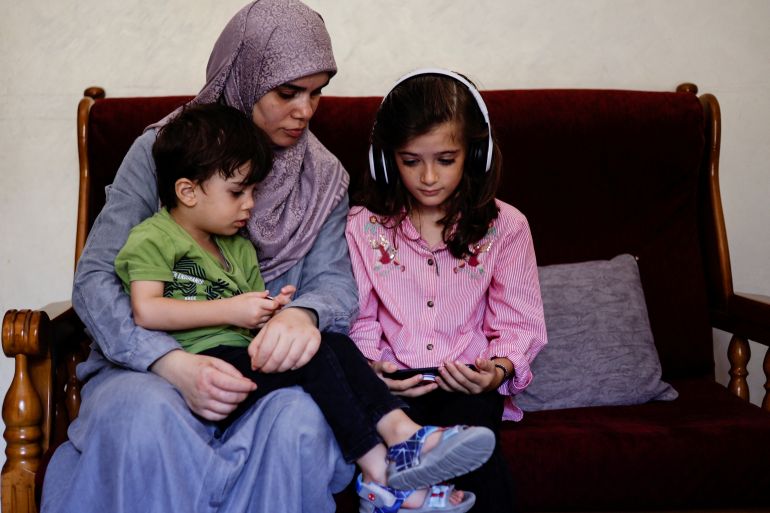
Palestinian mother Sajeda Abdu and her children look at a mobile phone, as another round of violence intensifies mental health crisis for Gaza children, in Gaza City, August 9, 2022
Gaza City – As another Israeli air raid thundered, eight-year-old Pretty Abu-Ghazzah stood shell-shocked, while her five-year-old twin brothers rushed to their mother Esraa’s arms. Pretty’s youngest sibling, aged two, cried loudly.
To escape the heavy bombardment in their neighbourhood of Deir el-Balah in the central Gaza Strip, Esraa brought her children to her in-laws’ house in a less-targeted area. But there is no escaping the mental health effects of the raid.
“I can’t bear to see my children trembling and their faces pale with terror. It’s too painful. Pretty vomited several times today due to panic and fear,” the 30-year-old mother said.
Making up nearly half of the 2.3 million people trapped in Gaza, children are suffering from the mental and emotional fallout of years of blockade and violence. According to a 2022 study by the non-profit Save the Children, four out of five children in the enclave grapple with depression, grief and fear.
Israel’s ongoing assault on Gaza, which it launched following the October 7 attacks by the armed wing of the Palestinian group Hamas, has killed at least 2,382 Palestinians and wounded 9,714 others so far. Hamas’ attacks on Israel killed more than 1400 people.
The conflict has also left parents in Gaza scrambling to keep their kids alive and mentally healthy through what they describe as the fiercest attack they have faced in years.
After Israel cut off the electricity in Gaza last Monday, residents now live in the dark amid dwindling fuel supplies, which are needed to operate generators. Many parents use what limited internet access they have to seek advice for comforting their children on platforms like YouTube and WhatsApp support groups.
Esraa has been observing her children’s reactions to the air attacks with growing concern. In addition to vomiting, they have been suffering from involuntary urination, a symptom she said is recent and highlights heightened fear.
“None of my children had faced issues with involuntary urination before,” she said.
In the 2022 Save the Children report, 79 percent of caregivers in Gaza reported an increase in bedwetting among children, compared with 53 percent in 2018. The last Israel-Hamas war was in 2021. Symptoms like increased difficulties in speech, language and communication as well as an inability to complete tasks also increased in children since 2018.
“None of my children had faced issues with involuntary urination before,” she said.
In the 2022 Save the Children report, 79 percent of caregivers in Gaza reported an increase in bedwetting among children, compared with 53 percent in 2018. The last Israel-Hamas war was in 2021. Symptoms like increased difficulties in speech, language and communication as well as an inability to complete tasks also increased in children since 2018.
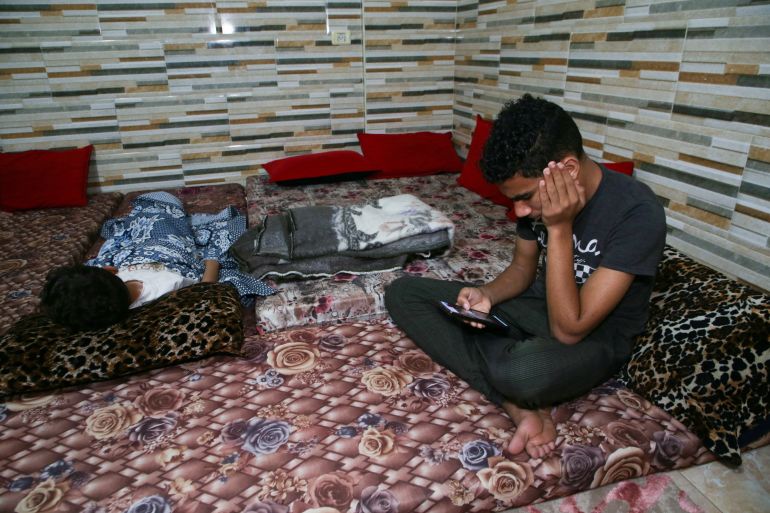 A Palestinian boy watches news on his phone at his house in Khan Younis in the southern Gaza Strip, May 10, 2023 [Bassam Masoud/Reuters]
A Palestinian boy watches news on his phone at his house in Khan Younis in the southern Gaza Strip, May 10, 2023 [Bassam Masoud/Reuters]
Engaging their minds
From the online resources, Esraa learned about keeping children entertained and engaged during conflict. One way was easing restrictions on screen time. “I usually limit my children’s iPad usage but given these distressing circumstances, I allow them to watch cartoons to keep themselves entertained. I make sure to keep my iPad or cellphone charged while they watch [in case of an emergency],” she explained. Esraa also reads stories to her children.
According to Palestinians in Gaza and sources at the United Nations Relief and Works Agency — the UN agency for Palestinian refugees — and Red Crescent, the Israeli Air Force has not been issuing warnings before shelling residential units, unlike during previous attacks sending families racing for their lives.
In its Humanitarian Needs Overview 2022, the United Nations Office for the Coordination of Humanitarian Affairs estimated that 678,000 children across Palestine need mental health and psychosocial support services. More than half of the children in Gaza are in need of such support. However, available mental healthcare has not been sufficient to address the significant need, especially during recurring times of distress. This leaves parents – who are facing their own mental health and emotional issues – to find ways to soothe their frightened children.
Esraa recalled that her children’s playtime now often revolves around war and imitating their mother’s phone calls to loved ones. “My children look up to me and pretend to have phone conversations, asking each other: ‘What’s happening in your area?’ They mimic me when I call my family members who live in different parts of Gaza, just to make sure they are okay,” Esraa explained.
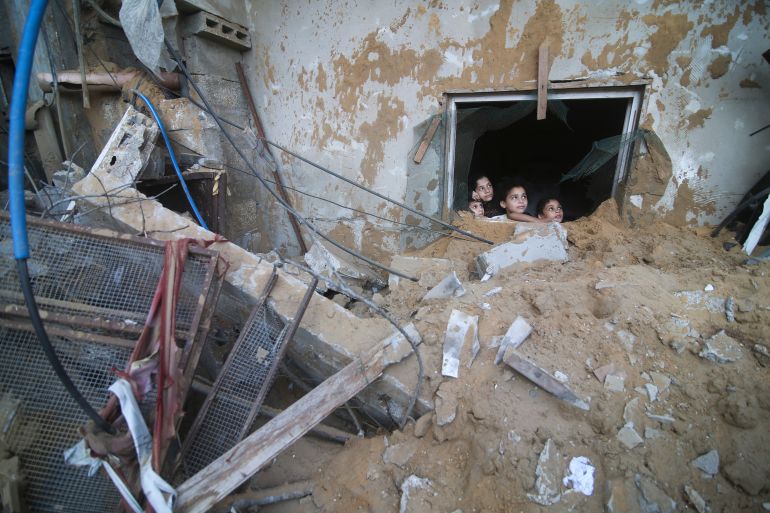
Palestinian children look at the building of the Zanon family, destroyed in Israeli air attacks in Rafah, Gaza Strip, October 14, 2023 [Hatem Ali/AP Photo]
Expressing themselves
Rawan, another mother in her 30s, said her three daughters are struggling with the reality of the violence they are confronting.
“This is the fifth war I’ve experienced as a mother and each time, I turn to YouTube and online articles to enhance my understanding of how to support my daughters during times of conflict,” Rawan said.
However, her eldest daughter is experiencing accentuated symptoms. “My daughters, Aysel, 9, Areen, 6, and Aleen, 4, are profoundly affected by the terrifying sounds of bombings, especially Aysel. She’s now old enough to understand the implications of war. She has stopped eating and drinking. I’ve also noticed an increase in her heart rate,” she said.
Aleen, too, has displayed signs of food aversion and frequent trembling due to fear, Rawan said.
To ease their anxiety, Rawan tries to engage her daughters in group games and activities.
For guidance, Rawan has been turning to YouTube and awareness messages sent by her daughters’ teachers to help mothers support their children’s mental well-being. Among such advice is to monitor children closely for signs of anxiety that they may have difficulty expressing verbally. In this situation, mothers are advised to encourage their children to express themselves creatively, through writing stories or drawing as an outlet to process their feelings.
Like many people in Gaza seeking a safe haven from the shelling, Rawan and her family spent the first three days of the Israeli attack in their home in the al-Nasr neighbourhood of Gaza City. However, after the bombings intensified near their residence, they relocated to the Nuseirat refugee camp near Deir el-Balah in the heart of the Gaza Strip.
As with Esraa’s children, the relocation has not eased the mental unrest of Rawa’s children. “They stick close to me at all times, even when I’m preparing meals. I constantly embrace and comfort them,” she said in a helpless tone.
When her daughters ask about the ongoing war, Rawan tries to divert their attention by showing them photos and videos of happier times or engaging them with games, reading together and cuddling.
Unlike Esraa, Rawan feels compelled to limit her kids’ use of mobile phones and iPads for entertainment, since these devices are essential for emergencies. She has also tried to restrict their exposure to news by turning off the television during war-related coverage.
Mental health support
Some mental health professionals have been providing free resources on social media. In a Facebook post, the Palestinian Counseling Center announced the formation of a national emergency team to provide “free psychosocial support via phone calls and WhatsApp” to those who need it. The post includes a list of names and contacts of professional mental health and social work specialists across Palestine who are available to jump on calls. The page has shared a number of tips on how to assist children under fire.
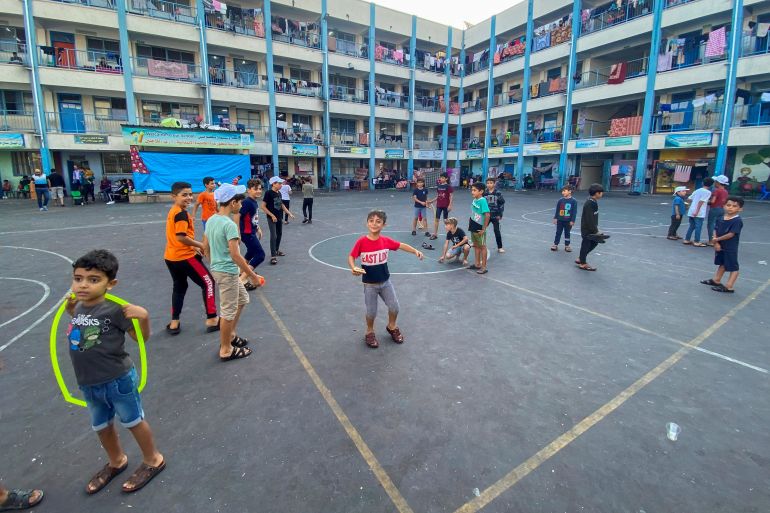
Palestinian children, who fled their houses due to Israeli attacks, play as they shelter in a United Nations-run school, in Gaza City, October 12, 2023 [Arafat Barbakh/Reuters]
“Children are unavoidably influenced by the consequences of Israeli aggression, the rising levels of violence, the widespread dissemination of images depicting casualties and devastation, and the continuous sounds of explosions,” Muayad Jouda, a Gaza-based psychiatrist explained.
He said that children might display symptoms such as intense anger, incessant crying and prolonged fits of screaming. They may continuously discuss the ongoing war and even engage in playing games with violent themes.
Ansam, a mother of two, said that she has seen these behaviours in her two daughters, aged two and four. “I hug them and comfort them because that’s a motherly instinct and because as a mother and a human, I’m terrified. But amidst the massacres we’re living through and witnessing, mental well-being is a luxury. All we want is for them to come out alive,” she said.
If you or someone you know is in Gaza and needs mental health support, the Palestinian Counseling Center may be able to help.
This article was produced in collaboration with Egab.
Number of Palestinians killed in Israeli attacks surpasses 11,100: Health Ministry
The number of deaths in the ongoing Israeli military attacks since October 7 has surpassed 11,100, including more than 8,000 children and women, the government media office in Gaza said on Sunday.
“Due to the targeting of hospitals and the prevention of entry of any of the bodies or wounded, the Ministry of Health was unable, on Saturday, to issue accurate statistics for the numbers of dead and injured during the past hours,” the media office said in a statement.
“We recall that the occupation [forces] committed more than 1,130 massacres, and the number of casualties reached more than 11,100 dead, including more than 8,000 children and women, and the number of wounded was more than 28,000,” it said.
Earlier this week, Barbara Leaf, assistant secretary of state for Near Eastern affairs, told a House panel that the number of those killed in Gaza is likely “higher than is being cited”.
An unidentified Palestinian man carrying an injured child away from the site of an Israeli airstrike at the Jabalia refugee camp in northern Gaza on Tuesday. Stringer/Anadolu via Getty Images
Why Israel's push into Gaza is killing so many children
- Israel-Hamas violence has killed more than 3,000 children. Almost all are Palestinians hit by Israeli airstrikes in Gaza.
- Children account for a startlingly high share of Palestinians reported killed in Gaza — roughly 41%.
- Gaza's demography, geography, and IDF military tactics have contributed to the high death toll.
The monthlong Israel-Hamas fighting is killing children at a rate faster than almost every other armed conflict in decades.
The overwhelming majority of the children — a reported 3,542 as of October 30, as compared with more than 30 children reported killed on the Israeli side — have been Palestinians in Gaza.
The only comprehensive statistics for civilian casualties in Gaza come from the Palestinian Health Ministry, an agency of Gaza's Hamas-run government whose credibility has come under scrutiny after it blamed an explosion at Al-Ahli Baptist Hospital in Gaza on Israeli forces — a claim disputed by numerous open-source researchers and the assessment of the US intelligence community. After President Joe Biden publicly doubted the accuracy of its casualty statistics, the Health Ministry released a list that it said contained the names, ID numbers, and ages of every person killed by Israeli airstrikes. Insider was unable to verify the list, which has been endorsed by officials from the United Nations and the World Health Organization.
Out of every 10 people listed as killed by the Health Ministry, four were children. That proportion of child deaths exceeds all other recent armed conflicts, including Russia's 2022 invasion of Ukraine.
Israeli warplanes have relentlessly bombarded the 25-mile-long strip since Hamas' October 7 terrorist attacks in Israel, which killed an estimated 1,400 people. More than 200 people were taken hostage, including an estimated 30 children. Many were tortured.
More children killed in Gaza this year so far than in Israel and Ukraine Combined
The IDF’s bombing of Gaza has been unusually deadly for children, as compared to other recent conflicts and previous Israeli offensives.
The IDF’s bombing of Gaza has been unusually deadly for children, as compared to other recent conflicts and previous Israeli offensives.
On Sunday, the international humanitarian organization Save The Children said the number of children killed in Gaza in three weeks had surpassed the total number of children killed in all global conflict zones since 2019. To find a comparable death toll, one would have to go back to the Syrian civil war, which killed 27,126 children over a period of more than 10 years, or the ongoing Yemeni civil war, in which 3,774 children have died in seven years of fighting, according to the UN.
The current Israel-Hamas conflict, by comparison, is less than a month old and continues to intensify as Israel begins ground operations in Gaza. Neither Syria nor Yemen saw children accounting for such a large share of civilian deaths.
Geography, demography — and a relentless air assault
Several factors contribute to the elevated death toll among children, experts told Insider. Demographics and geography play a role — nearly half of Gaza's 2.1 million residents are 18 or younger. In addition to being one of the most densely packed areas in the world, Gaza's terrain is mostly flat, increasing the effective range of bombs and explosives.
And Hamas, which sparked this most recent round of violence with the brutal and indiscriminate October 7 attacks on Israeli civilians, operates beside and beneath an urban environment from which it is exceedingly difficult, if not impossible, for residents to escape.
But the Israeli strategy of assailing Gaza with wave after wave of airstrikes is also to blame, according to Omar Shakir, the Israel and Palestine director at Human Rights Watch. Sheltering in UN-operated refugee camps, schools, and hospitals creates risks for more civilian casualties because people are congregated in areas under attack, Shakir said.
"The intensity of the bombardment they've carried out carries a foreseeable risk to civilian harm," Shakir said. "We're seeing that at a different degree of intensity. The significant death toll is in line with the intense type of bombardment."
And, Finucane added, there are reasons to doubt whether Israel has an accurate picture of exactly whom those bombs are falling on. "Israel's failure to anticipate the atrocities of October 7 calls into question the quality of intelligence about any preplanned targets," he said. "Whether or not they remain lawful military objectives, and whether Israeli intelligence regarding collateral civilian harm is up to date."
'A growing stain on our collective conscience'
Children constitute 41% of the 8,525 Palestinians whom the Palestinian Health Ministry has reported killed in Gaza. On the Israeli side, the United Nations says more than 30 children were killed in Hamas' attacks.
Neither statistic has been independently verified. The UN has historically found the reporting of civil authorities in Gaza to be reliable.
UNICEF, which has called for an immediate cease-fire days before Israel expanded its ground-invasion operations in Gaza, said the "staggering" death toll of children was "a growing stain on our collective conscience."
Shortly after Biden's comments casting doubt on Palestinian casualty figures, HuffPost reported that 20 State Department "situation reports" had cited the Health Ministry's numbers internally. In one of those reports, on October 21, an official wrote that the numbers were "likely much higher," attributing the discrepancy to the UN and nongovernmental organizations on the ground.
On October 13, Israel issued an evacuation order to 1.1 million residents of northern Gaza, asking them to move south.
But those Palestinians who followed the instructions of the Israeli government and relocated to the south did not escape the threat of Israeli airstrikes. Some Israeli planes continued to target southern Gaza after the evacuation order. Among those killed were family members of Al Jazeera Arabic's Gaza bureau chief, including his wife, daughter, son and grandson; another young daughter was badly injured.
Gaza is already crowded, and Israel's evacuation orders have packed the civilian population into even smaller areas. Shakir, HRW's Israel and Palestine director, attributes much of the disproportionate effect on children to the scale of the offense in this shrinking, overcrowded space.
Israel says its attacks are highly regulated and reviewed by lawyers
In a statement to Insider, a spokesperson for the Israel Defense Forces said they were adhering to the law of armed conflict, which requires combatants to balance military necessity against the protection of civilian life. The IDF has "a highly-regulated, multi-tiered process for approving pre-planned attacks against military objectives," the spokesperson wrote, adding that military lawyers "are on hand at all levels of command to ensure that strikes comply with international legal obligations, including proportionality."
The IDF's professed adherence to international law stands in contrast to statements made during the conflict by Israel's political leaders, who have promised to deliver no-holds-barred vengeance for the Hamas attacks. "We will cripple them mercilessly and avenge this black day they have brought upon Israel and its citizens," Prime Minister Benjamin Netanyahu said. "Residents of Gaza, get out now. We will be everywhere and with all our might."
Yoav Gallant, Israel's minister of defense, said he was removing "all restraints" from Israel's response and characterized his targets as "human animals."
"It is an entire nation out there that is responsible," Israeli President Isaac Herzog said. "It is not true this rhetoric about civilians not aware, not involved. It's absolutely not true."
Herzog later said he did not mean to imply that Palestinian civilians were legitimate targets. Nevertheless, IDF spokesman Daniel Hagari reportedly said airstrikes on Gaza would prioritize "damage, not accuracy."
In a follow-up email, Insider asked the IDF spokesperson whether Israel had imposed any special measures to protect the lives of children. The spokesperson said Israel was operating "in stark contrast" to "Hamas' barbaric attacks." "The IDF follows international law and takes feasible precautions to mitigate civilian harm," they wrote, without providing specifics.
The International Criminal Court has been investigating Israel on suspicion of war crimes since 2019
The International Criminal Court's chief prosecutor, Karim A.A. Khan, said on Sunday that Israel, by impeding aid, could face further war-crime investigations. Collective punishment and starving civilians are banned by the laws of war.
"It's alarming to see the bodies of young children that could be our own children being dragged, baked in dust, still, silent, motionless because they're dead — or with injuries and blood — being rushed to medical facilities that may not have the means to fix them and give them a chance to breathe the air and see the sun of tomorrow," Khan said in Cairo. Khan's remarks appeared to suggest that Hamas as well as Israel could find themselves prosecuted by the ICC. Since 2019, the court has had an open investigation into whether Israel has committed war crimes.
Tahani Mustafa, the senior Palestine analyst at the International Crisis Group, said the high death toll, disabling injuries, and "undignified" ways in which children's families, friends, and neighbors had been killed in Israeli airstrikes would also cause surviving children deep psychological trauma and physical pain.
"They are seeing their entire world get destroyed," Mustafa said. Given the blockade imposed by Israel, which for a time completely stopped the flow of food and water into Gaza, and continues to cut off fuel, children are also witnessing the way they have had to store bodies, including in ice-cream trucks. This kind of trauma and violence, Mustafa said, "does nothing for political inclination for these young people."
Historically, many Palestinians who have taken up arms against Israelis "have been victims of these sorts of violence," Mustafa said. "Never mind the deep psychological trauma and physical pain. Politically, this serves neither side."
Abandoning 'roof knocks'
During past Gaza offensives, Israel sometimes warned civilians inside targeted buildings with phone calls, leaflets, or by deploying low-yield munitions on buildings in advance of a major strike, a practice known as "roof knocking." An IDF officer told The New York Times that the Israeli Air Force was too busy dropping bombs on targets to use the tactic this time. Instead of roof knocks, Israel is issuing mass evacuation orders and flyers stating that "anyone who is near Hamas fighters will put their lives in danger."
The volume of the current bombing campaign, combined with the lack of specific warnings, has killed far more children and at a much faster rate than previous Israeli offensives in Gaza. During Operation Protective Edge, in 2014, 521 out of the 1,483 civilians killed were children — 35% — according to the United Nations. That campaign went on for 50 days. Already, operating on the same terrain, the current Israeli offensive is believed to have killed more than six times the number of children in roughly half the time.
Lila Hassan is a freelance investigative reporter covering extremism and immigration. She can be reached at This email address is being protected from spambots. You need JavaScript enabled to view it.
Mattathias Schwartz is chief national security correspondent at Insider. He can be reached at This email address is being protected from spambots. You need JavaScript enabled to view it..
Read next
What is happening in Israel and Gaza? A look at the war with Hamas
A look at three days of conflict after an offensive was launched from Gaza to Israel.
What is happening in Israel and Gaza? A look at the war with Hamas | News | Al Jazeera
Israel on Monday threatened to track down and punish Hamas fighters while announcing a “total blockade” of the Gaza Strip following a surprise weekend attack by the armed Palestinian group.
Here is what you need to know about the recent developments:
KEEP READING
What happened between Israel and Hamas on Saturday?
About 6:30 am (03:30 GMT), many Israelis woke up to sirens after rockets were fired from the Gaza Strip.
Hamas said it launched 5,000 rockets in an initial barrage. Israel’s military said 2,500 rockets were fired.
The strength, sophistication and timing of the morning attack apparently surprised Israel, which has one of the world’s most high-tech intelligence set-ups. Hamas fighters crossed from the Gaza Strip into southern Israel with motorcycles, pick-up trucks, para-gliders and speed boats and attacked 22 locations.
Hamas military commander Muhammad Deif called the operation Al-Aqsa Storm. Hamas spokesperson Khaled Qadomi told Al Jazeera that the group’s military operation was carried out in response to a spate of provocations by Israeli politicians and settlers at Jerusalem’s Al-Aqsa Mosque, among Islam’s holiest sites, and to decades of violence and discrimination suffered by Palestinians at the hands of Israel.
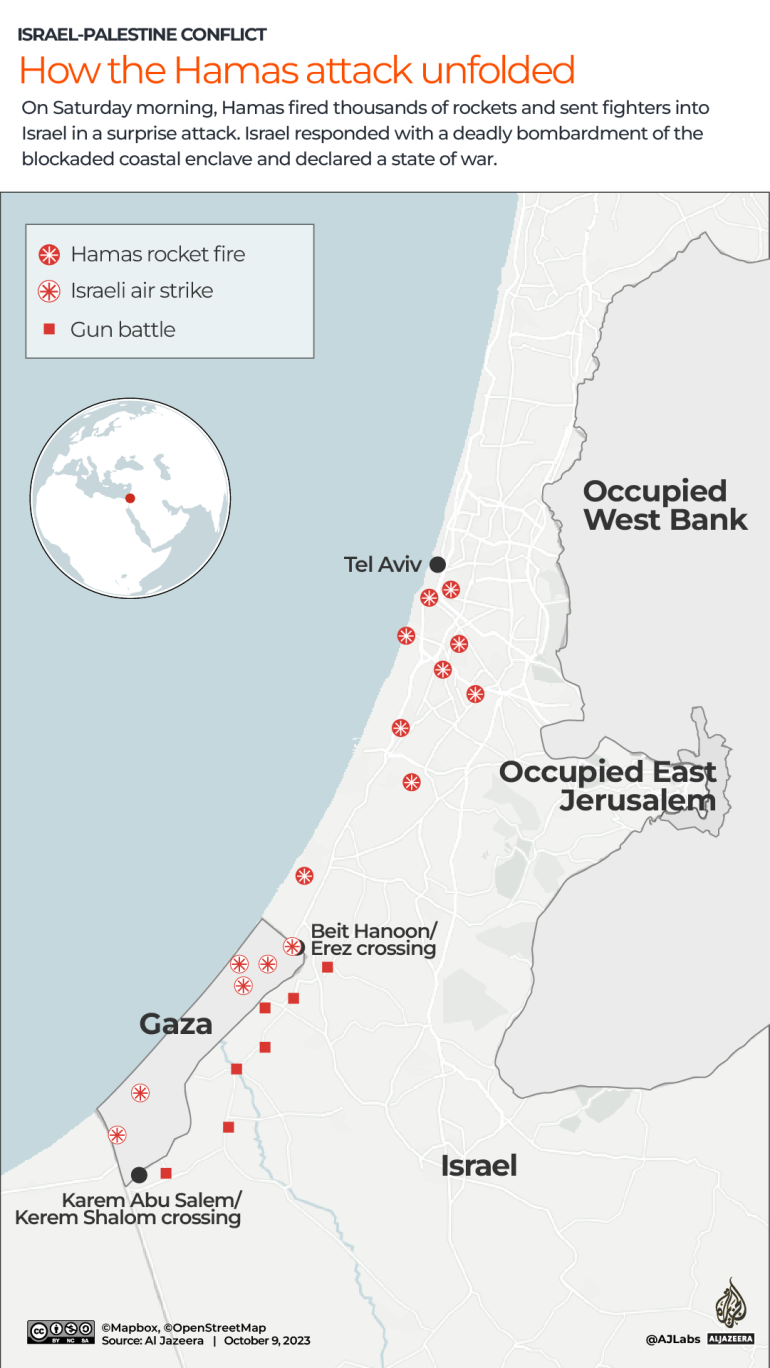
How did Israel respond?
In response to the attack, Israel launched what it called Operation Swords of Iron, with its jets bombing the Gaza Strip.
“We are at war, and we will win,” Netanyahu said in a televised statement on Saturday. He said the military would use all of its strength to destroy Hamas’s capabilities. But he warned: “This war will take time. It will be difficult.”
“Get out of there now,” he told Gaza Strip residents, who have no way to leave the tiny, overcrowded Mediterranean territory of 2.3 million people, which is blockaded by Israel by air, sea and land.
Air strikes intensified after nightfall, flattening residential buildings in giant explosions, including a 14-storey tower in central Gaza City.
Israel formally declared war on Sunday and on Monday announced that it would stop the supply of electricity, food, fuel and other essential commodities to the Gaza Strip, a decision that under international law amounts to a war crime.
The eruption of violence comes at a time when Israel has been facing the biggest protests in its history against Netanyahu’s proposal to reform the Supreme Court in ways that critics say weakens the institution. He is doing so while he is on trial for corruption.
Israel’s military also faces harsh questions for the country’s worst intelligence failure in 50 years.
Operation Al Aqsa Flood: Hamas launches major offensive against Israel
What does the declaration of war mean?
Mohammed Jamjoom, Al Jazeera’s correspondent in West Jerusalem, said the Israeli cabinet’s approval of Netanyahu’s declaration of war means “the prime minister and the defence minister can essentially make decisions going forward without having to consult the cabinet when it comes to every specific action.”
“It essentially formalises it, legalises the war going forward,” he said.
The army has called up about 300,000 reservists.
Israel has hit more than 1,000 targets in Gaza as of Monday, its military said.
Israel says it's sending military reinforcements to southern Israel
What is the current situation in Gaza?
Reporting from the Israeli coastal city of Ashdod, about 35km (20 miles) from the border with Gaza, Al Jazeera’s Charles Stratford said the enclave is enduring enormous bombardment by Israeli forces with consecutive air raids.
“It is a massive, constant bombardment,” Stratford said.
He added that there is a huge Israeli military build-up near the border of the Gaza Strip, which “would suggest that there is going to be some sort of ground invasion”.
More than 100,000 Palestinians in Gaza have been displaced and thousands have taken shelter in United Nations schools. Buildings, mosques and offices have been targeted in the Israeli strikes.
Officials in Gaza’s Ministry of Health said hospitals were expected to run out of fuel needed to power lifesaving equipment in two weeks.
How many people have been killed?
As of Monday, 560 Palestinians have been killed in Gaza, according to health officials, and more than 800 Israelis have also been killed, according to Israeli medical services.
Could a ground offensive follow?
In his declaration of war, Netanyahu told Israelis: “We will bring the fight to them with a might and scale that the enemy has not yet known,” and observers suggest a land invasion by Israel could be imminent.
Al Jazeera’s senior political analyst, Marwan Bishara, warned that the situation between Israel and the Palestinians “is going to get much worse” in the coming days.
Saleh al-Arouri, a Hamas leader, told Al Jazeera the group was ready for “the worst-case scenario”.
“We will continue to fight until we are rewarded with victory, freedom and independence,” he said.
“This is not a [hit-and-run] operation. We started an all-out battle,” he told Al Jazeera.
Israel military drafts 300,000 soldiers
What has been the international response?
US Defense Secretary Lloyd Austin ordered the Ford Carrier Strike Group – which includes a host of ships and warplanes, including an aircraft carrier – to sail to the eastern Mediterranean to be ready to assist Israel.
The situation in Gaza is ‘very dangerous’
What has been the international response?
US Defense Secretary Lloyd Austin ordered the Ford Carrier Strike Group – which includes a host of ships and warplanes, including an aircraft carrier – to sail to the eastern Mediterranean to be ready to assist Israel.
The United Nations Security Council held an emergency meeting on Sunday about the situation. It took no immediate action on a US demand that its 15 members condemn the Hamas attack.
China’s ambassador said it was important to come back to a two-state solution, where Israel and an independent Palestine live side by side.
The European Union announced on Monday that it was “immediately” suspending hundreds of millions of euros in aid for Palestinian authorities.
Fighters with Palestinian factions in Lebanon said they are eager to open a second front against Israel if the Shia-backed group Hezbollah leads the charge.
“Wherever [Israel] is ready for [the fight] to happen, it will happen,” said Ahmed Habet, a member of the Palestinian party Fatah in Burj al-Barajneh, a refugee camp in Lebanon’s capital, Beirut.
‘No place safe for children in Gaza’: UNICEF
Palestinians in Lebanon disappointed that Hezbollah won’t escalate
A week after a much-anticipated speech about Israel’s assault on Gaza that did not declare war on Israel, Hezbollah reiterated that message on Saturday.
While it would keep retaliating against Israeli attacks on south Lebanon, Hezbollah leader Hassan Nasrallah said, the war with Israel would be long and victory would “take years”.
His message fell short for many Palestinians in Sabra and Shatila, a Palestinian refugee camp that sprawls out across two Beirut neighbourhoods.
“I wanted him to open up the war completely,” said Abdallah*, 25, one of the Palestinians who gathered anxiously at a sidewalk cafe in Sabra and Shatila to watch the speech.
He is one of nearly 250,000 Palestinians languishing in impoverished refugee camps in Lebanon since they were expelled from their homeland during the creation of Israel in 1948.
Read here their full story.
Wounded treated at Nasser hospital after latest attacks on Khan Younis


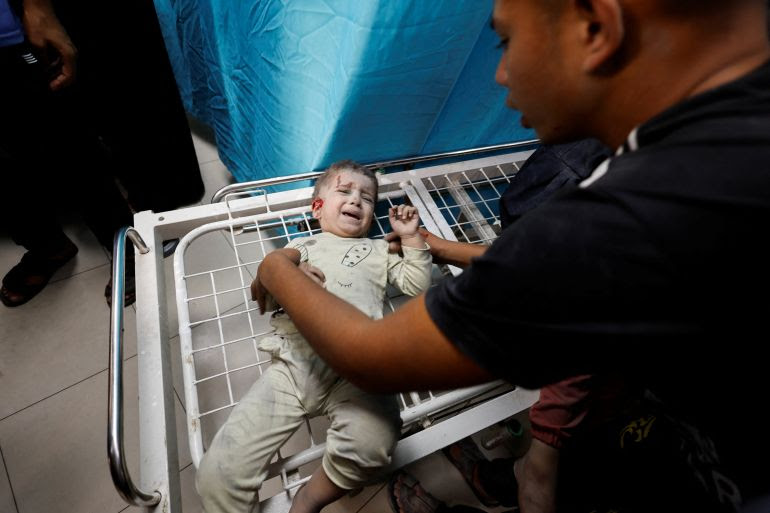
Israel-Hamas war live: Al-Shifa cardiac ward destroyed – Health officials | Israel-Palestine conflict News | Al Jazeera
Patients forcibly evicted from hospitals facing ‘inevitable death’: Minister
Palestinian Minister of Health Mai al-Kaila says Israeli forces “are not evacuating people from hospitals; instead, they are forcibly evicting the wounded and patients onto the streets, leaving them to face inevitable death.
“This is not evacuation but expulsion under the threat of arms,” she said in a press release, as cited by Palestinian WAFA news agency.
“There is a catastrophe unfolding in hospitals, with patients now dying without receiving their treatments, such as children and adults with kidney failure who are perishing at home without undergoing dialysis sessions.”
She said all 3,000 cancer patients who were receiving treatment at al-Rantisi and Turkish hospitals had been abandoned to face imminent death after Israeli forces forcibly evicted them.
Hezbollah claims responsibility for attack on Israel-Lebanon border
Lebanese group Hezbollah has claimed responsibility for the attack on the Israel-Lebanon border we reported earlier.
This exchange of fire comes hours after Israel’s Defence Minister Yoav Gallant visited Israeli soldiers in the north and warned Hezbollah not to provoke Israel at this point.
An Alternative to the Suez Canal Is Central to Israel’s Genocide of the Palestinians?
- Yvonne Ridley Categories:English
- Tags:Ben Gurion Canal Project, Gaza, Hamas attack, israel, Palestine, Sue
z Canal
All Global Research articles can be read in 51 languages by activating the Translate Website button below the author’s name.
To receive Global Research’s Daily Newsletter (selected articles), click here.
Click the share button above to email/forward this article to your friends and colleagues. Follow us on Instagram and Twitter and subscribe to our Telegram Channel. Feel free to repost and share widely Global Research articles.
***
I hate conspiracy theories and fake news. They degrade my profession as a journalist and incite fear, hate and tribulation with the deliberate intention of causing a public backlash. Naturally, there have been all sorts of speculation and rumour around the war in Gaza and the 7 October surprise Hamas attack on the occupation state.
It has been said that the attack was two years in the planning in Gaza, a tiny patch of land riddled with Zionist infiltrators and spies who cajole, bribe and threaten ordinary Palestinians to betray their comrades.
So the question many are asking, with some justification, is why there was such a catastrophic intelligence failure which meant that the attack caught the Israeli military sleeping on the job. In terms of access to eavesdropping technology and defence there is probably no better-equipped military in the world other than in the US, and the Americans maintain secret supply bases in the Zionist state. Israel’s Mossad has earned itself a reputation of being among the finest intelligence gatherers and infiltrators in the world. And yet 7 October saw Hamas fighters breach security fences, invade a music festival and local kibbutzim, and fly in on paragliders without a single challenge. How did this happen?
Some of Israel’s most brutal attacks on innocent Palestinians are made citing “national security” and Israel’s alleged right to defend itself. If it was being attacked by another nation state, fair enough. But an attack by people living under Israel’s brutal military occupation provides no such legal defence. It doesn’t exist.
A good contact and friend of mine who watches the region’s events closely told me simply: “Follow the money.” And that is how, after being nudged and pointed in a variety of directions with annoyingly vague clues, I found myself pouring over a network of paper trails that led to the National Archives, where British secrets lie unseen for at least 30 years and in some cases much, much longer.
By the time they surface, it’s usually far too late to do anything as the guilty have taken their secrets to the grave, but some disclosures do explain the terrible behaviour of governments and rogue politicians. Many of my colleagues are waiting with bated breath for the March 2030 deadline to pass to find out how the Iraq war came about, and if our suspicions about former British Prime Minister Tony Blair’s role are as bad as we believe.
This particular paper chase, though, took me to the origins of the Suez Canal, which opened with a grand ceremony on 17 November 1869, 154 years ago this month. Today, 10 per cent of the world’s cargo ships sail through this strategic route between the Eastern Mediterranean and the Red Sea, heading to and from the Indian Ocean and connecting Europe and Asia.
Egypt owns, controls and operates the canal now, but it was once owned by French investors who held half of the canal company’s stock with Egypt’s ruler Sa’id Pasha holding most of the balance. In 1875, a cash crisis forced Sa’id’s successor, Isma’il Pasha, to sell the country’s shares to Britain. The Suez Company operated the canal until Egypt’s President Gamal Abdel Nasser tore up the concession in 1956 and transferred the canal’s operation to the state-owned Suez Canal Authority. There then followed the Suez Crisis, also known as the second Arab-Israeli war.
On the same day that the canal was nationalised Nasser also closed the Straits of Tiran to all Israeli ships. The crisis saw the UK, France, and Israel invade Egypt. According to pre-agreed plans prepared by Britain and France, Israel invaded Egypt’s Sinai Peninsula on 29 October 1956, forcing the Egyptians to engage its troops. This gave the excuse for the Anglo-French alliance to declare the fighting to be a threat to stability in the Middle East and enter the war, officially to separate the two forces but, in reality, to regain control of the Suez Canal and bring down the Nasser government.
What does it have to do with 7 October 2023? Well, it just so happens that Gaza is slap bang in the middle of the proposed path of a major second canal in the region.
see Map below.
Gaza is currently being bombed to oblivion by the deranged Israeli leader Benjamin Netanyahu who wants to deliver The Ben Gurion Canal Project. Yes, Tel Aviv already has a name for the canal which was first proposed back in the Sixties. It would connect the Gulf of Aqaba on the Red Sea to the Mediterranean Sea, and would even be named after the first prime minister of Israel.
The canal would rival Egypt’s Suez Canal, causing a major financial threat to the country and this major trade artery. Remember the global trade disaster caused the huge container ship Ever Given got stuck in the famous canal in 2021? The Straits of Tiran and Suez Canal remained formally closed to Israeli vessels from the creation of Israel in 1948 and the Nakba until the Suez Crisis in 1956. When all land trade routes were blocked by Arab states, Israel’s ability to trade with East Africa and Asia, mainly to import oil from the Persian Gulf, was severely hampered. There have been other obstructions involving Israel forcing its closure in 1956-7 and 1967-75.
If it goes ahead, this new canal will be almost one-third longer than the 193.3 km Suez Canal, at around 292.9 km and an estimated cost of between $16 and $55 billion. Whoever controls the canal will have enormous influence over the global supply routes for oil, grain and shipping. With Gaza razed to the ground, it would enable the canal planners to literally cut corners and reduce costs by diverting the canal straight through the middle of the territory.
Around 12 per cent of the world’s trade passes through Suez on 18,000 ships a year, so you can imagine that a lot of countries will be lining up for a share of the deal. The Suez Canal is worth a staggering $9.4 billion to Egypt, which has enjoyed record-breaking revenues this year.
The only thing stopping the newly-revised project from being revived and rubber-stamped is the presence of the Palestinians in Gaza. As far as Netanyahu is concerned they are standing in the way of the project; a project which may earn him forgiveness in Tel Aviv for the intelligence and military shortcomings on 7 October. However, his treacherous sleight of hand will never by forgiven or forgotten by the people of Palestine given the horrors which have descended upon Gaza in the past few weeks.
If this is all being done in the name of potential business deals then it compounds the political and diplomatic disgrace of the shameless Western governments who are complicit in the Palestinian genocide.
The biggest shame, though, belongs to Egypt. Already on the verge of bankruptcy due to President Abdel Fattah Al-Sisi’s profligacy, the emergence of a new canal would have a devastating impact on the Egyptian economy and its people. Heartless dictator Al-Sisi may come to regret putting his trust in Tel Aviv and Western governments above the interests and welfare of two million Palestinians in Gaza.
None of the Middle East leaders, Netanyahu, Biden and Sunak et al in the West emerge from the carnage in Gaza with any degree of integrity intact. Together, they are guilty of war crimes and crimes against humanity, or at the very least are complicit in such awful crimes leading to genocide.
This didn’t all begin on 7 October; the bombing of Gaza is simply the latest stage of Israel’s slow genocide of the people of Palestine, which has now got up to speed again with the full backing of the Western sponsors of the apartheid state. If they think that killing innocent children and women will bring peace, they are deluded.
Unbridled neoliberal capitalism has destroyed many countries and killed millions of people, and peace and security have rarely been the result. I hope that the evil people responsible will burn in Hell for what they have done to the children of Palestine, Iraq, Afghanistan, Libya, Syria and numerous other countries around the world. The survivors need freedom and justice now.
Communication services to be cut in Gaza by Thursday: Minister
By Thursday, all communications services in Gaza will be cut off due to a lack of fuel, the Palestinian communications minister has said.
Palestinians in Lebanon disappointed that Hezbollah won’t escalate
Mat Nashed Reporting from Sabra and Shatila, Lebanon
A week after a much-anticipated speech about Israel’s assault on Gaza that did not declare war on Israel, Hezbollah reiterated that message on Saturday.
While it would keep retaliating against Israeli attacks on south Lebanon, Hezbollah leader Hassan Nasrallah said, the war with Israel would be long and victory would “take years”.
His message fell short for many Palestinians in Sabra and Shatila, a Palestinian refugee camp that sprawls out across two Beirut neighbourhoods.
“I wanted him to open up the war completely,” said Abdallah*, 25, one of the Palestinians who gathered anxiously at a sidewalk cafe in Sabra and Shatila to watch the speech.
He is one of nearly 250,000 Palestinians languishing in impoverished refugee camps in Lebanon since they were expelled from their homeland during the creation of Israel in 1948.
Read here their full story.
‘Israel has its own agenda’
Reporting from east Jerusalem
The detailed plan for the future of Gaza after the war isn’t clear for the Israelis or the international community.
But what we do know is that Israel’s prime minister in an overnight statement said that they will look to be there for a very long time.
He said that they don’t want Hamas to govern the Gaza Strip but reiterated that Israel’s presence in the strip wouldn’t be an occupation.
Meanwhile, Netanyahu has experienced an international pushback over what has been happening in Gaza. Leaders in Europe and the US have been criticising the number of deaths in Gaza, especially French President Emmanuel Macron who said this bombing has to stop and called for a ceasefire.
But Netanyahu warned that people shouldn’t cave into any pressure from such statements or the protests taking place worldwide and said he will stand firm against the world if necessary.
So according to Netanyahu, Israel has its own agenda and will push through regardless of what other countries say.
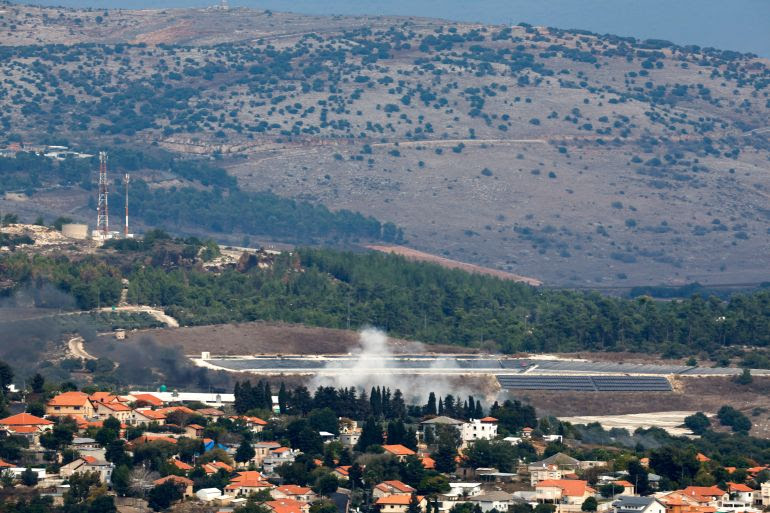
Smoke rises behind the village of Dovev as seen from Israel-Lebanon border in northern Israel, on Sunday
We are getting more information on the civilians wounded in the attack in northern Israel, along its border with Lebanon.
An Israeli ambulance service spokesperson told Israel’s N12 News that one person was critically wounded and between three to five others were injured. Footage showed cars on fire on a road near an open area along the border.
Billionaires are teaming up for pro-Israel, anti-Hamas media drive: Report
A billionaire real estate tycoon in the United States is rallying support for a high-dollar media crusade to boost Israel’s image and demonise the Hamas armed group amid global pro-Palestinian solidarity protests.
The media campaign — called Facts for Peace — is seeking million-dollar donations from dozens of the world’s biggest names in media, finance and technology, according to an email seen by news website Semafor.
More than 50 individuals are being courted, including former Google CEO Eric Schmidt, Dell CEO Michael Dell and financier Michael Milken. They have a combined net worth of around $500bn, Semafor said.
Gaza evacuees arrive in Egypt after Rafah crossing reopens
Four Egyptian security sources told Reuters that a first group of foreigners and injured Palestinians were able to leave Gaza after the Rafah border crossing reopened.
Several injured Palestinians arrived on Egyptian soil to receive medical treatment, plus 80 foreign nationals and dependents, with more undergoing border procedures, the sources said.
Evacuations through the border crossing were suspended on Friday after issues transporting injured Palestinians from northern Gaza.

Macron urges Israel to stop bombing babies in Gaza
In an exclusive BBC interview, the French president said a ceasefire would be in Israel's interest.
-
Attribution Europe
-
INL News Investigators are investigating claims that Isreal's Mossad and USA's CIA fund and support Hamas to carry out attacks on Israel who knew the 7th October 2023 on Israel was coming and thus allowed the Hamas Rockets to bypass Israel's normally impenatrable Security
An alternative to the Suez Canal is central to Israel’s genocide of the Palestinians – Middle East Monitor
News Investigators are investigating claims that Isreal's Mossad and USA's CIA fund and support Hamas to carry out attacks on Israel who knew the 7th October 2023 on Israel was coming and thus allowed the Hamas Rockets to bypass Israel's normally impenatrable Security
An alternative to the Suez Canal is central to Israel’s genocide of the Palestinians – Middle East Monitor
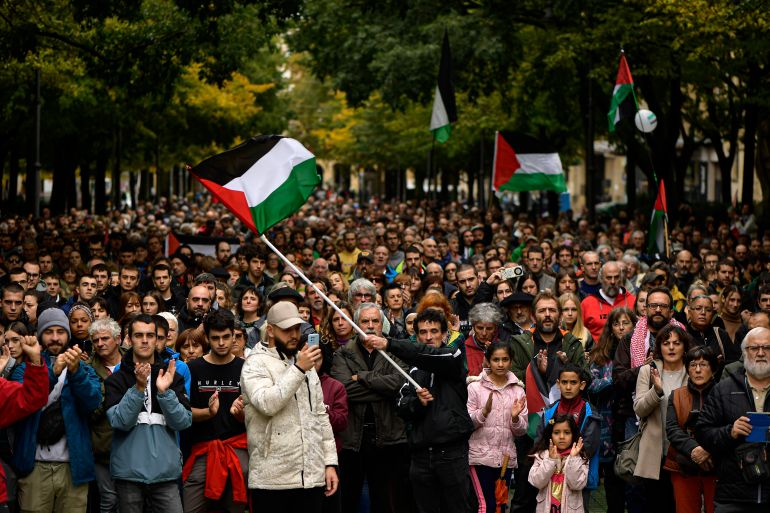
- Demonstrators wave Palestinian flags as they protest in Pamplona, northern Spain
-
US not utilising leverage over Israel ‘effectively’: Analyst
The future of Palestine: two-state solution more distant that ever
Sahar Khamis, a professor at the University of Maryland, says there has been growing sentiment in the US to save the lives of innocent civilians in Gaza.
“Atrocities” being committed by Israeli forces are now available for everyone to see on social media, she noted.
But despite growing pressure, the Biden administration has not responded in a way that is “firm, decisive, strong, or satisfactory to meet these demands”, Khamis said.
While the US has leverage over Israel, it is not being used “sufficiently or productively” to put an end to Israel’s attacks, she added.
Her comments come as diplomats in the US State Department have been criticising US policy on the war on Gaza.

Smoke rises as buildings in Gaza’s Beit Hanoun are bombed
They're Killing Children In Gaza
The Song
Written and Recorded by the INL News Group
Verse One
The Israel Gaza War... Why is it happening ..
The Israel Gaza War...
supported by the major Western Powers..
Verse Two
All the Palestinians are having to flee from their homes
Before the Israelites drop more bombs and rockets on Gaza
All the sick are having to be moved from Gaza Hospitals
Before another Israel Rocket hits their beds..
Chorus
They're killing women and children.. In Broad Daylight..
They're killing women and children who are not even in the fight...
Two premature babies die in al-Shifa Hospital: Director
Al-Shifa Hospital director Mohammed Abu Salmiya says two prematurely born babies died because of the power outage there.
“They were 39 children and now they’re 37 newborns,” Abu Salmiya told Al Jazeera.
The babies, who require oxygen devices, were moved from incubators to a bed in another part of the hospital that is “not conducive to newborns”.
“We’ve placed 10 prematurely born babies on one bed because these children need a particular temperature, they need particular respirators and ventilators, and particular nutrition,” he added.
These babies weigh somewhere between 800 to 2,000 grams (1.7 – 4.4 pounds), according to Abu Salmiya. He said doctors are struggling to save their lives and are now using “primitive methods”, but that this is “very unsustainable”.
Abu Salmiya said the Israeli army has ignored requests to transfer the newborns out of al-Shifa to a safe location.


|
Gaza being exterminated to make way for lucrative Ben Gurion canal that will cut across Israel to the Red Sea Natural News Report and Podcast Mike Adam |
|
|
A competitor to the Suez Canal is being planned to cut across Israel and connect the Mediterranean Sea with the Red Sea. This canal would give the U.S. and Israel control over a key chokepoint in the world for military ships, grain exports, energy and other commodities. The planned route of the canal goes right through northern Gaza, and many analysts believe that Gaza is being destroyed and wiped out right now to make way for the construction of this canal, which would bring in billions of dollars a year for Israel (and grant Israel control over its access). |
|
An alternative to the Suez Canal is central to Israel’s genocide of the Palestinians
![A "Welcome to Egypt" sign can be seen across the Suez Canal on 30 March 2021 in Ismailia, Egypt. [Mahmoud Khaled/Getty Images]](https://ci6.googleusercontent.com/proxy/AhhhcCK57L-cXqFoFCnEQRbpJRVWu8nuDtZL_KHLITg82P5deqONgBG4ZAH3gTrWE41UHImF1RZVffbrb4pkKssiKcHPhwkw-FP8pIskxyCeQS0MWalh7d1d9DnQXcJFW3qmhYmTPqIIk0kM7OgL_R-7QX5nSvtFLJ43eXdLzMJz9vaBIa0RfTsG6eCrbs5trkF4s8AX44MPHnlLDg2A2wdTZhUxLVO1sen7LiA=s0-d-e1-ft#https://i0-wp-com.cdn.ampproject.org/i/s/i0.wp.com/www.middleeastmonitor.com/wp-content/uploads/2021/04/GettyImages-1232019401-1.jpg?fit=1200%2C800&ssl=1)
I hate conspiracy theories and fake news. They degrade my profession as a journalist and incite fear, hate and tribulation with the deliberate intention of causing a public backlash. Naturally, there have been all sorts of speculation and rumour around the war in Gaza and the 7 October surprise Hamas attack on the occupation state.
It has been said that the attack was two years in the planning in Gaza, a tiny patch of land riddled with Zionist infiltrators and spies who cajole, bribe and threaten ordinary Palestinians to betray their comrades.
So the question many are asking, with some justification, is why there was such a catastrophic intelligence failure which meant that the attack caught the Israeli military sleeping on the job. In terms of access to eavesdropping technology and defence there is probably no better-equipped military in the world other than in the US, and the Americans maintain secret supply bases in the Zionist state. Israel’s Mossad has earned itself a reputation of being among the finest intelligence gatherers and infiltrators in the world. And yet 7 October saw Hamas fighters breach security fences, invade a music festival and local kibbutzim, and fly in on paragliders without a single challenge. How did this happen?
Some of Israel’s most brutal attacks on innocent Palestinians are made citing “national security” and Israel’s alleged right to defend itself. If it was being attacked by another nation state, fair enough. But an attack by people living under Israel’s brutal military occupation provides no such legal defence. It doesn’t exist.
READ: 41 children killed in West Bank since 7 October, charity says
A good contact and friend of mine who watches the region’s events closely told me simply: “Follow the money.” And that is how, after being nudged and pointed in a variety of directions with annoyingly vague clues, I found myself pouring over a network of paper trails that led to the National Archives, where British secrets lie unseen for at least 30 years and in some cases much, much longer.
By the time they surface, it’s usually far too late to do anything as the guilty have taken their secrets to the grave, but some disclosures do explain the terrible behaviour of governments and rogue politicians. Many of my colleagues are waiting with bated breath for the March 2030 deadline to pass to find out how the Iraq war came about, and if our suspicions about former British Prime Minister Tony Blair’s role are as bad as we believe.

The Ben Gurion Canal Project
This particular paper chase, though, took me to the origins of the Suez Canal, which opened with a grand ceremony on 17 November 1869, 154 years ago this month. Today, 10 per cent of the world’s cargo ships sail through this strategic route between the Eastern Mediterranean and the Red Sea, heading to and from the Indian Ocean and connecting Europe and Asia.
Egypt owns, controls and operates the canal now, but it was once owned by French investors who held half of the canal company’s stock with Egypt’s ruler Sa’id Pasha holding most of the balance. In 1875, a cash crisis forced Sa’id’s successor, Isma’il Pasha, to sell the country’s shares to Britain. The Suez Company operated the canal until Egypt’s President Gamal Abdel Nasser tore up the concession in 1956 and transferred the canal’s operation to the state-owned Suez Canal Authority. There then followed the Suez Crisis, also known as the second Arab-Israeli war.
On the same day that the canal was nationalised Nasser also closed the Straits of Tiran to all Israeli ships. The crisis saw the UK, France, and Israel invade Egypt. According to pre-agreed plans prepared by Britain and France, Israel invaded Egypt’s Sinai Peninsula on 29 October 1956, forcing the Egyptians to engage its troops. This gave the excuse for the Anglo-French alliance to declare the fighting to be a threat to stability in the Middle East and enter the war, officially to separate the two forces but, in reality, to regain control of the Suez Canal and bring down the Nasser government.
What does it have to do with 7 October 2023? Well, it just so happens that Gaza is slap bang in the middle of the proposed path of a major second canal in the region.
READ: Only 27% of Israelis believe Netanyahu is suitable to head government
Gaza is currently being bombed to oblivion by the deranged Israeli leader Benjamin Netanyahu who wants to deliver The Ben Gurion Canal Project. Yes, Tel Aviv already has a name for the canal which was first proposed back in the Sixties. It would connect the Gulf of Aqaba on the Red Sea to the Mediterranean Sea, and would even be named after the first prime minister of Israel.
The canal would rival Egypt’s Suez Canal, causing a major financial threat to the country and this major trade artery. Remember the global trade disaster caused the huge container ship Ever Given got stuck in the famous canal in 2021? The Straits of Tiran and Suez Canal remained formally closed to Israeli vessels from the creation of Israel in 1948 and the Nakba until the Suez Crisis in 1956. When all land trade routes were blocked by Arab states, Israel’s ability to trade with East Africa and Asia, mainly to import oil from the Persian Gulf, was severely hampered. There have been other obstructions involving Israel forcing its closure in 1956-7 and 1967-75.
If it goes ahead, this new canal will be almost one-third longer than the 193.3 km Suez Canal, at around 292.9 km and an estimated cost of between $16 and $55 billion. Whoever controls the canal will have enormous influence over the global supply routes for oil, grain and shipping. With Gaza razed to the ground, it would enable the canal planners to literally cut corners and reduce costs by diverting the canal straight through the middle of the territory.
Around 12 per cent of the world’s trade passes through Suez on 18,000 ships a year, so you can imagine that a lot of countries will be lining up for a share of the deal. The Suez Canal is worth a staggering $9.4 billion to Egypt, which has enjoyed record-breaking revenues this year.
The only thing stopping the newly-revised project from being revived and rubber-stamped is the presence of the Palestinians in Gaza. As far as Netanyahu is concerned they are standing in the way of the project; a project which may earn him forgiveness in Tel Aviv for the intelligence and military shortcomings on 7 October. However, his treacherous sleight of hand will never by forgiven or forgotten by the people of Palestine given the horrors which have descended upon Gaza in the past few weeks.
READ: No evidence of Hamas seizing aid entering Gaza: US envoy
If this is all being done in the name of potential business deals then it compounds the political and diplomatic disgrace of the shameless Western governments who are complicit in the Palestinian genocide.
The biggest shame, though, belongs to Egypt. Already on the verge of bankruptcy due to President Abdel Fattah Al-Sisi’s profligacy, the emergence of a new canal would have a devastating impact on the Egyptian economy and its people. Heartless dictator Al-Sisi may come to regret putting his trust in Tel Aviv and Western governments above the interests and welfare of two million Palestinians in Gaza.
None of the Middle East leaders, Netanyahu, Biden and Sunak et al in the West emerge from the carnage in Gaza with any degree of integrity intact. Together, they are guilty of war crimes and crimes against humanity, or at the very least are complicit in such awful crimes leading to genocide.
This didn’t all begin on 7 October; the bombing of Gaza is simply the latest stage of Israel’s slow genocide of the people of Palestine, which has now got up to speed again with the full backing of the Western sponsors of the apartheid state. If they think that killing innocent children and women will bring peace, they are deluded.
Unbridled neoliberal capitalism has destroyed many countries and killed millions of people, and peace and security have rarely been the result. I hope that the evil people responsible will burn in Hell for what they have done to the children of Palestine, Iraq, Afghanistan, Libya, Syria and numerous other countries around the world. The survivors need freedom and justice now.
OPINION: Like the fabled phoenix, Gaza will rise from the ashes
The views expressed in this article belong to the author and do not necessarily reflect the editorial policy of Middle East Monitor.
‘Don’t make the mistake’: Netanyahu warns Hezbollah
Israel’s leader issued a stark warning to Lebanon’s Hezbollah after the defence minister did the same earlier in the day.
“Don’t make the mistake of going to war. That would be the mistake of your life… Your entry into the war will seal the fate of Lebanon,” Benjamin Netanyahu said.
Hezbollah leader Nasrallah earlier said the armed group used new types of weapons and struck new targets in Israel, and pledged the front against Israeli would “remain active”.
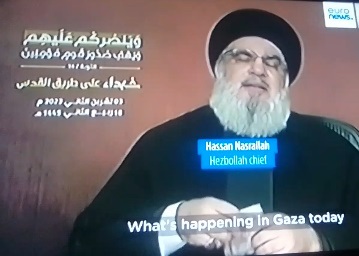
" What is happening in Gaza today is not like any other previous war...
Israel Gaza Conflict Euro News 7th November 2023 P1A
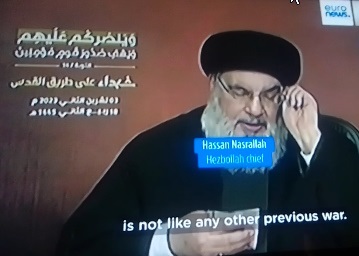
... is not like any other previous war...
Israel-Hamas War - Hezbollah Leader Threatens All-Out War
Israel Gaza Conflict Euro News 7th November 2023 P1b
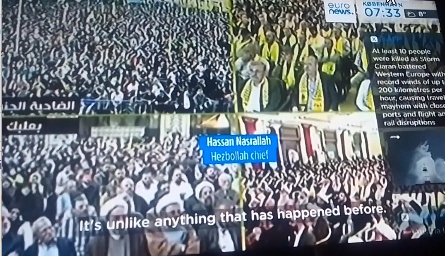
... it's unlike anything that has happened before..
Israel Gaza Conflict Euro News 7th November 2023 P2
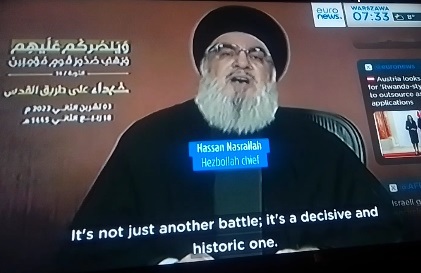
.... It's not just another battle ... it's a decisive and historic one...
Israel Gaza Conflict Euro News 7th November 2023 P3
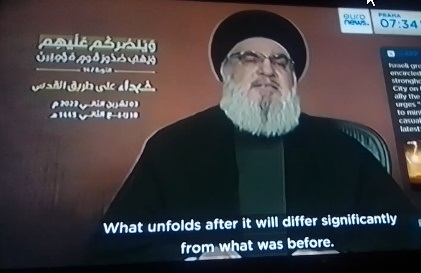
.. What unfolds after it will differ significantly from what was before..
Israel Gaza Conflict Euro News 7th November 2023 P4
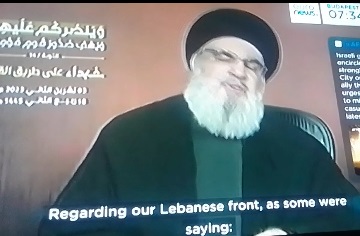
"Regarding our Lebonese front, as some were saying:
IsraelGazaConflictEuroNews7thNovember2023_P5
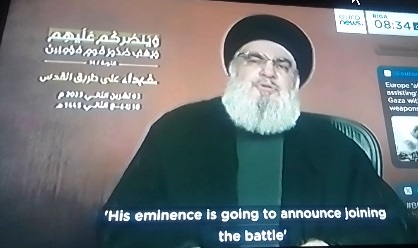
.. 'His eminence is going to announce joining the battle ....
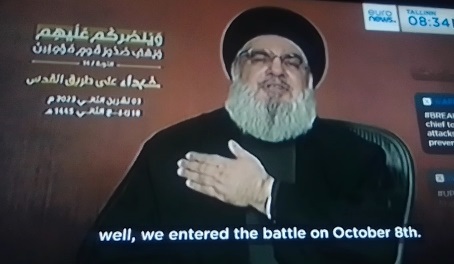
well we entered the battle on October 8th 2023.'
Israel Gaza Conflict Euro News 7th November 2023 P6
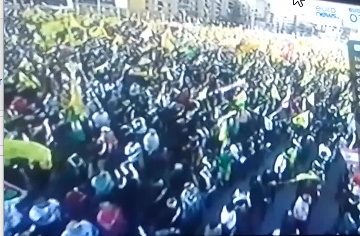
IsraelGazaConflictEuroNews7thNovember2023_P6A
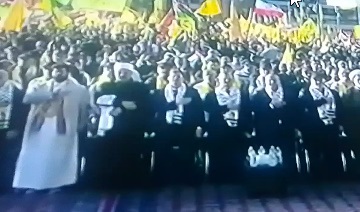
IsraelGazaConflictEuroNews7thNovember2023_P6B
Fierce fighting in Gaza as US says Palestinians must govern Gaza post-war
Fierce fighting in Gaza as US says Palestinians must govern Gaza post-war (msn.com)
Israeli forces battled Hamas militants through shell-blasted buildings in Gaza City on Thursday as some 80 countries and organisations met in Paris to coordinate humanitarian aid and find ways to help wounded civilians escape the siege.
Residents in Gaza City said Israeli were fighting Hamas and other militants and that tanks were stationed around the city. They said Israeli forces were moving closer to two hospitals where thousands of displaced Palestinians were seeking shelter.
The Israeli military said its troops had advanced into the heart of Gaza City, Hamas' main bastion and the biggest city in the Palestinian coastal enclave, while the Islamist group said its fighters had inflicted heavy losses.
Hamas' armed wing on Wednesday released a video that appeared to show intense street battles alongside bombed out buildings in Gaza City.
Israeli tanks have met heavy resistance from Hamas fighters using underground tunnels to stage ambushes, according to sources with Iran-backed Hamas and the separate Islamic Jihad militant group.
As the Israel-Hamas war enters its second month, the United States said when the war does end Palestinians must govern Gaza.
U.S. Secretary of State Antony Blinken on Wednesday outlined Washington's red lines and expectations for the besieged coastal territory, pushing back at Israeli comments that it would be responsible for security in Gaza indefinitely.
There should be "no reoccupation of Gaza after the conflict ends. No attempt to blockade or besiege Gaza. No reduction in the territory of Gaza," Blinken said at a press conference in Tokyo.
While Blinken said there may be a need for "some transition period" at the end of the conflict, but that post-crisis governance in Gaza must include Palestinian voices.
"It must include Palestinian-led governance and Gaza unified with the West Bank under the Palestinian Authority."
The Palestinian Authority (PA), which exercises limited self-rule in parts of the Israeli-occupied West Bank, says the Gaza Strip, where Hamas has ruled since 2007, is an integral part of what it envisions for a future Palestinian state.
Israeli officials have clarified they do not intend to occupy Gaza after the war, but they have yet to articulate how they might ensure security without maintaining a military presence. Israel withdrew its forces from Gaza in 2005.
Israel launched its military assault on Gaza in response to a cross-border Hamas raid on southern Israel on Oct. 7 in which gunmen killed 1,400 people, mostly civilians, and took about 240 hostages, according to Israeli tallies.
Palestinian officials said 10,569 people had been killed as of Wednesday, 40% of them children. Israel says 33 of its soldiers have been killed.
SEA LANES FOR AID AND WOUNDED
A conference in Paris on Thursday, attended by Arab nations, Western powers, G20 members and NGO groups such as Doctors Without Borders will discuss measures to alleviate the suffering in Gaza, but without a pause in fighting expectations are low.
"The object is really to work with all the participants and also with Israel ... to allow improved access," a French presidential official told reporters ahead of the conference
Among the options discussed will be setting up a maritime corridor to use sea lanes to ship humanitarian aid into Gaza and see how ships could be used to help evacuate the wounded.
Thousands of Palestinian civilians trudged in a forlorn procession out of the north of Gaza on Wednesday seeking refuge from Israeli air strikes and fierce ground fighting between Israeli troops and Hamas militants.
The exodus took place during a four-hour window announced by Israel, which has told residents to evacuate encircled northern parts of Gaza or risk being trapped in the violence. But the central and southern parts of the enclave also came under fire again.
Huge numbers of displaced people from among Gaza's 2.3 million population are already crammed into schools, hospitals and other sites in the south.
Thousands of others remain in the north, including at Gaza City's main Al Shifa hospital.
Israel has blamed Hamas for civilian deaths in Gaza, saying that it is using them as human shields and hiding arms and operations centres in residential areas.
"As deaths and injuries in Gaza continue to rise due to intensified hostilities, intense overcrowding and disrupted health, water, and sanitation systems pose an added danger: the rapid spread of infectious diseases," the World Health Organization warned on Wednesday.
WHO said that more than 33,551 cases of diarrhoea had been reported since mid-October, the bulk of which was among children aged under five.
Macron calls on Israel to stop killing Gaza's women and babies
Macron calls on Israel to stop killing Gaza's women and babies - BBC News

France's President Macron urges Israel to stop killing Gaza's women and children
The end of Gaza's most beautiful neighbourhood (bbc.co.uk)
By Alice Cuddy | BBC News, Jerusalem
Around noon on Friday 20 October, the residents of the upscale Gazan neighbourhood of al-Zahra stood in front of the rubble and dust that used to be their homes.
Fridays were supposed to be special: the Islamic day of prayer marks the start of the weekend and in al-Zahra it meant falafel and hummus, coffee and tea, all served in spacious family apartments or villas by the Mediterranean Sea. Residents here knew they were luckier than most in Gaza.
But overnight, Israeli bombs had flattened 25 apartment blocks, home to many hundreds of people. Israel had been bombing Gaza for days in response to the Hamas attacks of 7 October, but al-Zahra had not been hit until now.
Some of those who lived here - among them doctors, lawyers, academics, fashion designers and entrepreneurs - tried to stay and survive in the ruins, but most packed up what little they could salvage and dispersed across the Gaza Strip.
Hana Hussen, who grew up in al-Zahra, followed the news with horror from hundreds of miles away in Turkey, where she had moved two years ago. In a hurried phone call that day, she rang her family to check they were safe.
She told them she loved them.
Then the line went dead.
OVERNIGHT, ISRAELI BOMBS HAD FLATTENED 25 APARTMENT BLOCKS, HOME TO MANY HUNDREDS OF PEOPLE.
The residents of the destroyed apartment blocks had been sheltering from the bombs in a nearby university thanks to the efforts of local dentist Mahmoud Shaheen who led a mass evacuation of his neighbours. The BBC told the story earlier this week of how he received a dawn phone call from an Israeli intelligence agent warning him that the blocks would be bombed.
The Israel Defense Forces (IDF) told us it was “unable to answer specific operative questions” when asked about its decision to strike al-Zahra’s residential blocks. Hamas was attacking Israel from across the Gaza Strip and had “embedded itself in civilian infrastructure”, it added. It has not named any Hamas operative killed in the strikes on al-Zahra, and it is believed that nobody died.
Israel says its strategy has been to root out Hamas which it accuses of operating in the heart of civilian communities - and that it takes steps to mitigate civilian casualties, such as the phone call we reported Mahmoud had received instructing him to evacuate the neighbourhood.
The agent who had called the dentist also told him: “We see things you do not see.”
Mahmoud’s neighbours may have escaped alive but they did not all survive what was to come.
The BBC has spent two weeks talking to several families from the area, both established residents as well as younger, ambitious newcomers.
They told us about how they had grabbed whatever they could from their homes, watched those homes explode in front of their eyes, and then dispersed around Gaza to an uncertain fate. From makeshift shelters and temporary homes across the strip, residents wanted to tell the story of the life and demise of a neighbourhood they loved.
Our communications have been over broken calls - sometimes with bombs sounding in the background - and sporadic WhatsApp messages. People cut conversations short to run or seek shelter. In some cases, we have lost contact for days at a time.
After a recent communications blackout during intense Israeli strikes on the strip, one al-Zahra resident eventually left a short message: “Thank you for asking. We are still alive.”
Our conversations show that not everyone who left al-Zahra survived. Among those reported killed are a young body-builder from a local gym whose last words to a friend, according to social media posts, were: “It’s all gone.”
The Hamas-run health ministry says more than 10,000 Palestinians have been killed in Gaza since the start of the war, over a third of them children.
The Gaza Strip is densely populated with high levels of poverty and tight controls on entering and leaving. But al-Zahra was a neighbourhood of large homes and bright outdoor spaces, of groves with almonds and figs, of sports grounds and parks.
Al-Zahra was established in the 1990s by the late Palestinian Authority (PA) President Yasser Arafat as a place for staff and supporters. Locals say it still had strong connections with the PA, which is based in the occupied West Bank and is a bitter rival of Hamas.
It sits just north of the Wadi Gaza river - a point that Israel ordered civilians to move south of on 13 October. This followed days of bombing, Israel’s response to hundreds of Hamas gunmen rampaging across the border killing more than 1,400 people, mostly civilians including many children, and taking more than 200 hostages. The brutality of the attacks in southern Israeli villages and the massacre of young people gathering at a music festival has traumatised the nation.
Everyone we spoke to insisted that, to their knowledge, this area was as far removed from Hamas and its operations as it is possible to be in Gaza, which Hamas has ruled since 2007. “There was no military here,” one told us. “I don’t even think there were Hamas supporters living here.”
For Nashwa Rezeq, who had lived in al-Zahra for 18 years, it was the “greatest city of all”.
Heavily involved in neighbourhood committees and a local youth council, Nashwa has also been one of the keepers of a community Facebook group for more than a decade. If you ask her about a particular resident, she is likely to know them and perhaps even their phone number.
The Facebook page has about 10,000 followers. On the eve of the war there were posts about a billiards tournament at a local cafe and a message of congratulations to a graduating student.
Now the Facebook group is where they share updates on the destruction of their neighbourhood and mark the deaths of those who lived there. It has never before kept Nashwa this busy.
A recent post mourns a family killed in a strike that hit their Italian restaurant.
When war was declared, Nashwa headed south with her husband and four children, as the family always did during escalations. She gave her neighbour a key, asking them to tend her beloved house plants while she was gone.
Two days after the first bombings, her own building - the tallest in al-Zahra - was destroyed at dawn.
“Somebody called me and said ‘I just walked by your tower and it’s all on the ground’,” she recalls.
She describes her fifth-floor home as being “very big and spacious”. Her family bought it and improved it over the course of a decade - they had recently bought a new air conditioning unit, a television and furniture.
“A lot of people say it’s only money, but to me my home was my soul.”
Now in southern Gaza, she says her family are still in danger. “Three days ago, they bombed the house next to us. The smoke from that bombing suffocated us.”
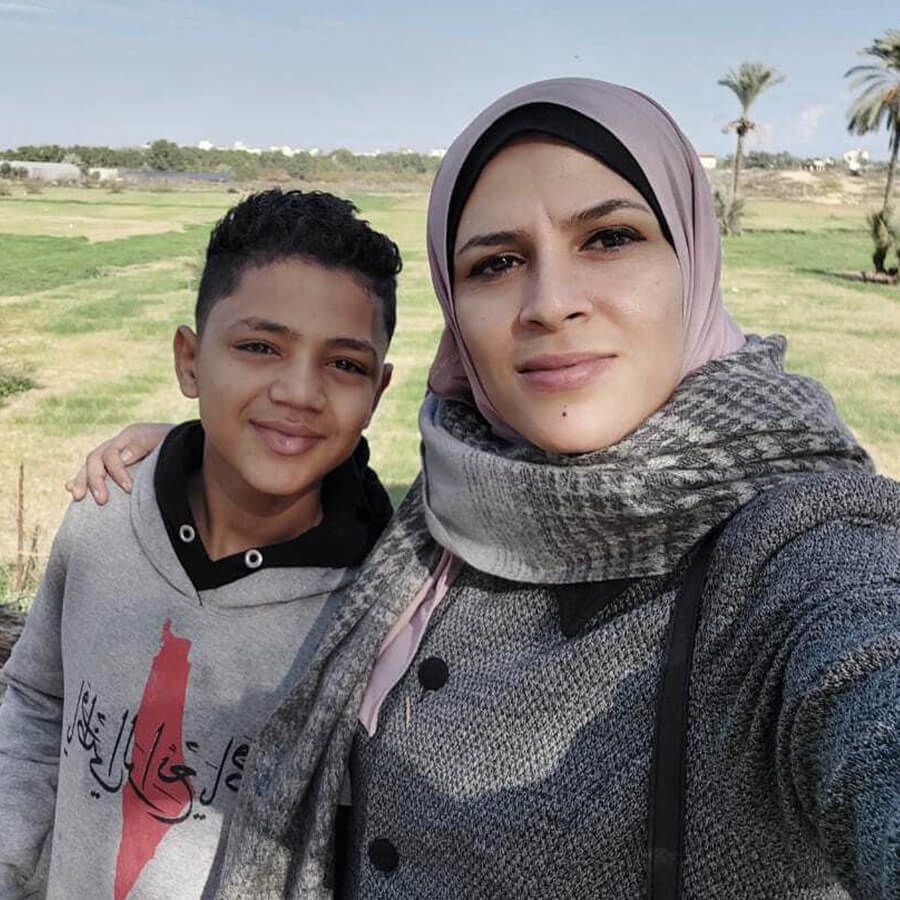
Nashwa Rezeq with her son
“A LOT OF PEOPLE SAY IT’S ONLY MONEY, BUT TO ME MY HOME WAS MY SOUL.”
Her children keep asking why they couldn’t have brought the new air conditioning unit and television with them when they fled al-Zahra. They also keep asking when they can go home and collect their toys.
For Nashwa, it’s her houseplants: “I loved all of them.”
University professor Ahmed Hammad, who lived in a building close to Nashwa, was another established member of this community. He was one of those who chose to stay after the strikes.
A media and communications professor in his 50s at a university to the north of the neighbourhood, Ahmed is eager to send his research papers to us and talks proudly about his six children, aged eight to 27.
“One of them is a dentist, one of them works in IT, one of them studied English literature at university. The other three are still at school,” he says.
When we spoke on the phone last month, Ahmed and his family were sheltering at their al-Zahra home, now without doors or windows. No longer able to go to work or school, they spent their time searching for wood to burn so they could cook. They stayed as they were too frightened to evacuate, worrying that they would be caught in strikes while moving south.
But on the night of 27 October, Israel intensified air strikes and expanded its ground operations - and we lost contact with Ahmed. Days later, he got in touch to say they had left their neighbourhood after a “very, very tough night” and even worse morning.
He describes dodging “continuous bombing” on the journey south.
“Every time a bomb landed, we lay on the ground.”
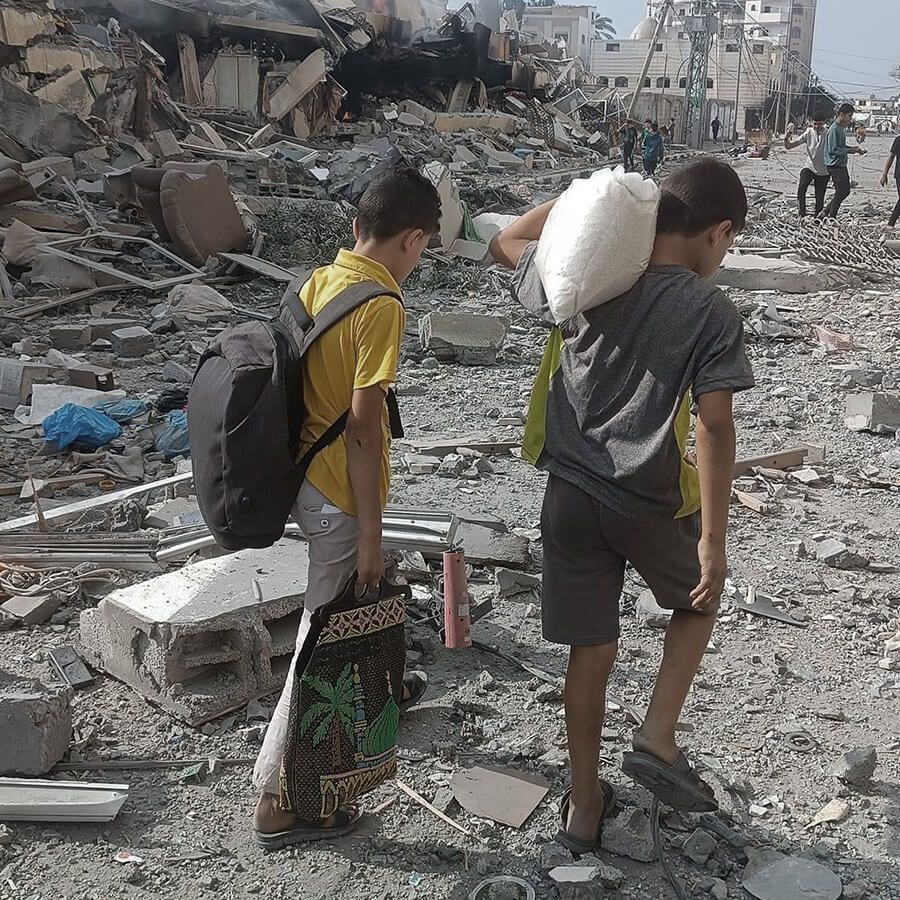
HE DESCRIBES DODGING CONTINUOUS BOMBING ON THE JOURNEY SOUTH.
Back in Turkey, Hana stayed glued to her phone waiting for an update from her family.
As she waited, she told us stories about what she called “the most beautiful, warmest place in the world”.
Residents of al-Zahra congregated on the beach and filled the main street leading there at sunrise and sunset. On Fridays, Hana and her friends would go there to share jokes and stories from the week, she says.
In a sign of how much the war changed life here, Hana says that she started receiving “haunting” messages from those same friends - one asking if Hana would look after her children if she died, others asking for advice on “alternative options for feminine hygiene products”. Another wished they had clean water to drink.
After many days of waiting, Hana finally made contact with her family, including her brother Yahya, who she describes as her soulmate.
Yahya was among a new generation of entrepreneurs in al-Zahra. The 30-year-old fashion designer prefers to talk about his former life instead of his current overcrowded accommodation just south of the neighbourhood, where he walked with his family over several hours after their home was destroyed.
He remembers the sound of birds as he looked out over the neighbourhood from the roof of his family’s apartment building.
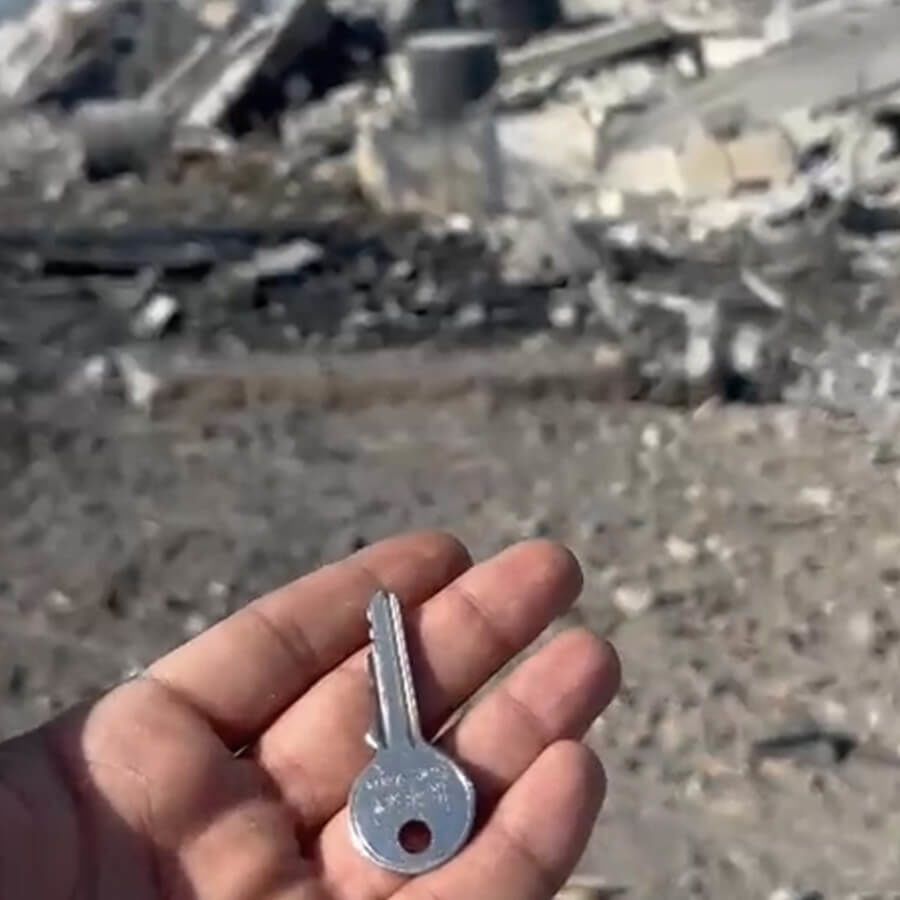
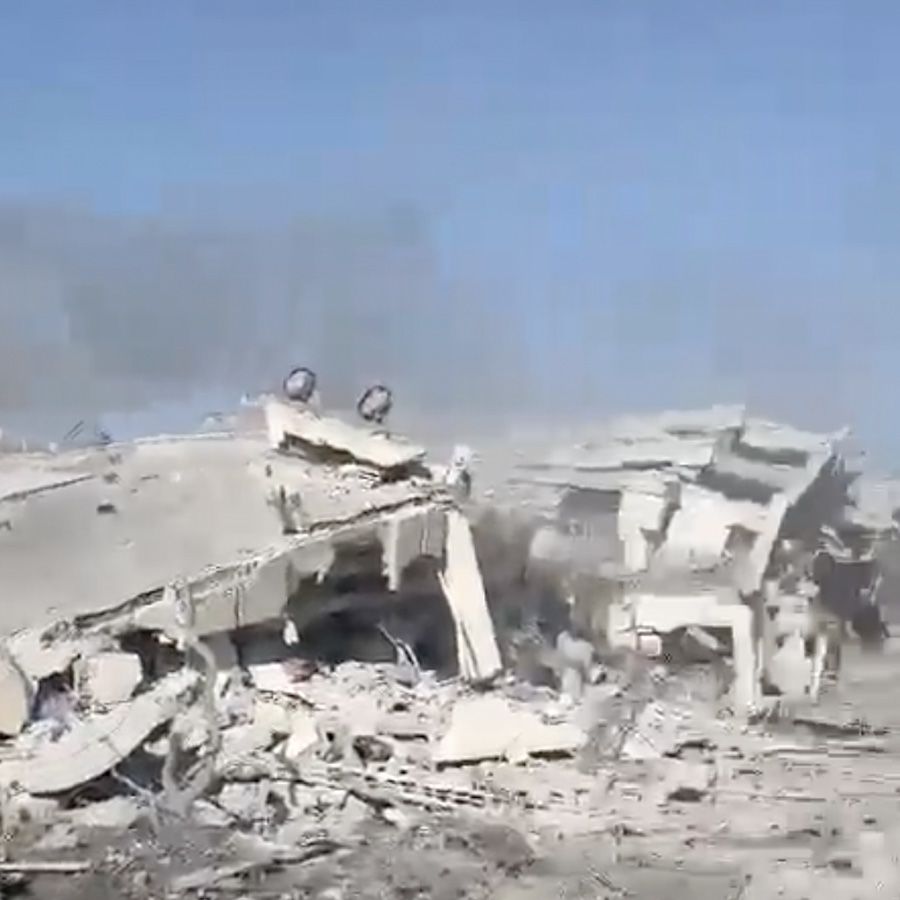
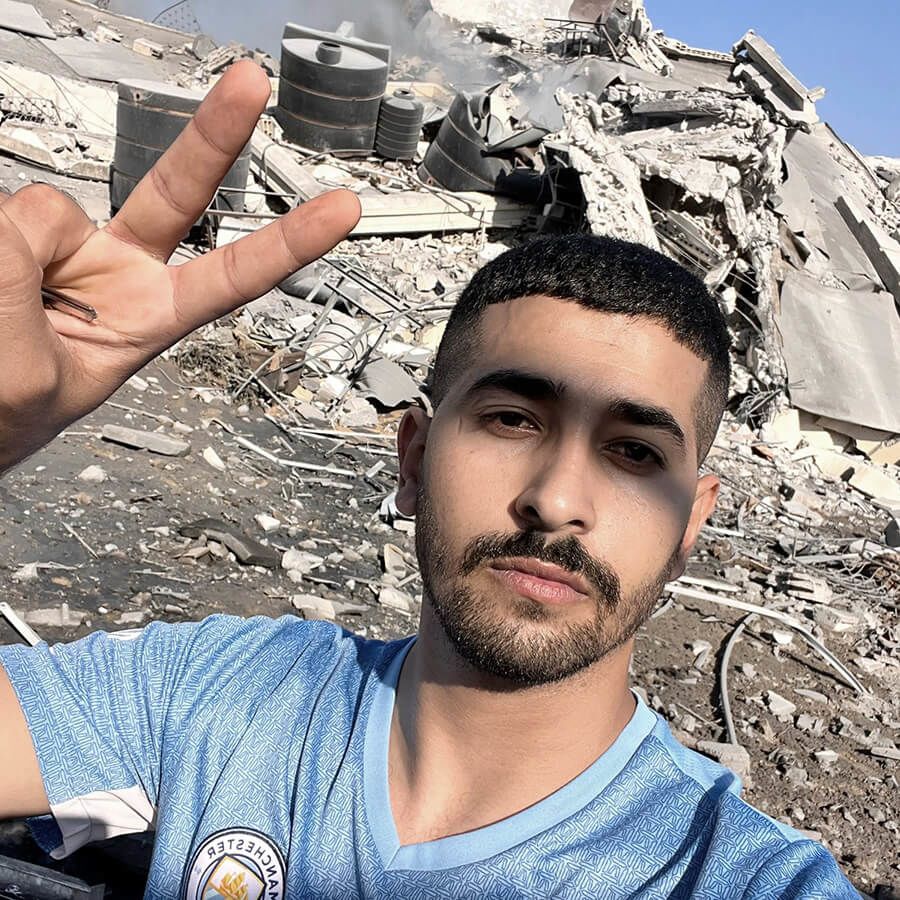
“OUR HOME IS THE STREET NOW. EVERYTHING WAS DESTROYED.”
People often posted videos from al-Zahra’s rooftops. Some show spectacular colours as the sun set.
“All those things made us feel delighted,” Yahya says via WhatsApp.
Listing some of his favourite things about his neighbourhood, Yahya writes in a string of messages: “The lights at night. The sea. It’s a peaceful and elegant city.”
Now, he sometimes ends WhatsApp conversations abruptly. “Can I go now because ther [sic] bomb near of me,” he says in one message.
He left al-Zahra with two bags containing an iPad, documents, a hoodie, a water bottle, his passport, chocolate, and a first aid kit. He was forced to leave his intricately crafted designs - his fabrics, dresses and skirts - behind.
Cousins Ali and Mohamed, 25, are also young entrepreneurs in the city, and had busy jobs in al-Zahra as a pastry chef and cafe owner respectively. Both lived in the row of buildings destroyed on 19 and 20 October.
They had invested a lot of money in building a life there. Ali got married earlier this year, and spent $6,000 on new furniture that was being kept at the family home, where he and his pregnant wife were staying.
His family moved here from Gaza City during the 2014 war between Hamas and Israel, thinking it was “the safest place“ to be.
Last month they prepared bags with two sets of clothing in, ready to grab if they needed to flee. “One bag for my mum, one bag for my brother, one bag for my wife,” he says.
On 19 October, the family picked up those bags and left everything else behind. When bombs hit their building, Ali says all of the losses were doubled - he and his wife’s new furniture was destroyed alongside his parents’ possessions. Two fridges, two washing machines, two sofas.
Mohamed says his dad had only recently made the final payment on their home, when they too evacuated that night. “He finished the payment for the flat and now the flat is gone,” he says.
He now spends his days looking for water: “There is no time to rest.”
He misses the cafe he ran on the grounds of the university, with its pool table and painting of US rapper Tupac Shakur on the wall. He misses going to the gym every day. But mostly he misses his friends. “We’d be joking, laughing. We’d sit together until midnight.”
Journalist Abdullah al-Khatib says his extended family also lost four homes in the strikes.
He says his son keeps asking when he’ll be able to go home and play with his friends in the park. But he may never be able to return.
“Our home is the street now. Everything was destroyed,” he says.
Mahmoud, the dentist who took the evacuation call, is now volunteering at a medical centre in central Gaza.
“I smell the most horrible smells. You are not washing and there are 130 people with you,” he says.
Mahmoud says he feels fortunate to have enough money for the inflated prices of everyday items. One of Mahmoud’s close friends has remained in a villa in al-Zahra, and the dentist recently sent flour to him so he could make bread.
But those same items are in increasingly short supply.
“Today I went to all the shops looking for lentils… and I don’t want to exaggerate, I entered at least 40 shops to ask for lentils and I couldn’t find any,” he says. “One shopkeeper told me, ‘Don’t waste your time.’”
Mahmoud says he hopes to go back to al-Zahra after the war is over. “I hope God will let us survive and then we will try to fix things.”
The IDF says Hamas continues to operate from across the Gaza Strip. It added: “As part of the IDF's mission to dismantle the Hamas terrorist organisation, the IDF has been targeting military targets across the Gaza Strip. Strikes on military targets are subject to relevant provisions of international law, including the taking of feasible precautions to mitigate civilian casualties.”
Hana last went to al-Zahra five months ago, not knowing it would be the last time she would see her home.
“If I had known, I would have… bade farewell to the walls of my room, which I love, and which have witnessed moments of joy and sorrow in my life.
“I would have taken many of my belongings that carry memories of dear moments,” she says.
“They left us with nothing. Absolutely nothing.”
“THEY LEFT US WITH NOTHING. ABSOLUTELY NOTHING.
More on Israel-Gaza war
- From Israel: Pain still raw a month after Hamas attacks
- Kibbutz Be’eri: Hamas attack captured by mothers’ WhatsApp group
- Watch: The devastating effects of war on Gaza’s children
- More on al-Zahra: Gazan tells BBC about most terrifying call of his life
- Explained: Who are the hostages taken by Hamas from Israel?
- History behind the story: The Israel-Palestinian conflict
What has the UN done and said on the Israel-Palestine conflict?
The UN’s chief is at the centre of diplomatic tension with Israel, but all sides have been critical of the global body’s struggles in the continuing conflict.
https://www.aljazeera.com/

While the UN chief has made diplomatic efforts to de-escalate violence, the UN does not have a comprehensive method to enforce international law [Mohammed Asad/AP]
Israel and the United Nations are locked in a bitter spat, after UN Secretary General Antonio Guterres on Tuesday night said that the Hamas attacks of October 7 “did not happen in a vacuum”.
Guterres’s comments, at a UN Security Council meeting., sparked outrage from Israel, whose ambassador, Gilad Erdan asked the UN boss to resign, accusing Guterres of justifying terrorism. Israel has since said it will refuse visas to UN officials.
While Guterres condemned the Hamas attacks, he added, “The Palestinian people have been subjected to 56 years of suffocating occupation.”
So what has the UN’s role been in the war that broke out on October 7? Here’s a snapshot:
Diplomatic:
- Tuesday’s Security Council meeting was not the first time Guterres demanded a ceasefire in the region.
- On October 7, Guterres condemned the Hamas attacks. He expressed concern for the civilians and urged that all diplomatic efforts are made to avoid an escalation of violence.
- He repeated this on October 9, appealing to end “the vicious cycle of bloodshed, hatred and polarisation.”
- He further urged both sides and other bodies that are involved on October 11 to avoid further conflagration. He also called for the release of Israeli hostages in Gaza.
- He reiterated his appeal for the release of hostages and additionally requested that Israel allow humanitarian aid access into the Gaza Strip on October 15, adding that these actions should not become bargaining chips.
- On October 18 after the bombing of the al-Ahli hospital in Gaza, Guterres called for an immediate ceasefire in the region, condemning the collective punishment of Palestinians. On October 20, the UN chief visited the Rafah crossing between Egypt and the Gaza Strip.
- Tuesday marked the fourth meeting of the UN Security Council, where 15 ambassadors of countries convened to discuss the violence that escalated starting October 7.
- Two resolutions proposed in these four meetings have failed: the first one was proposed by Russia which did not get enough votes whereas the second one drafted by Brazil was vetoed by the US.
Refuge
- Thousands of Gaza residents have fled their homes and have sought refuge in 64 United Nations Relief and Works Agency for Palestine Refugees in the Near East (UNRWA) schools.
- Due to their affiliation with the UN, these schools were considered safe spaces for refuge.
- However, schools are no longer safe. According to UNRWA, at least several schools in Gaza have suffered damage from Israeli bombing.
Aid
- The UN’s World Health Organization has been involved in getting medical supplies into the besieged Gaza Strip through the Rafah border.
- But the aid entering Gaza is not enough for the residents, experts have said, and has been facing delays since Israel is inspecting it.
- The aid does not include fuel and the fuel shortage is especially alarming as it threatens the functioning of hospitals and UNRWA in Gaza.
- Guterres has called the aid “a drop of aid in an ocean of need”.
International law
- Guterres has said on multiple occasions that international humanitarian law was being violated in the war between Israel and the Palestinian armed group Hamas.
- These statements have been echoed by several world leaders.
- China’s Foreign Minister Wang Yi said that while every country has the right to self-defence, they should adhere to international law and protect civilians.
- Chilean President Gabriel Boric echoed this while condemning the Hamas attack.
- In a statement, Venezuela said the conflict is a result of Palestinian people being unable to find their space in international law, urging the UN to fulfil its role as the guarantor of international peace.
- The UN has not yet devised a comprehensive way to enforce international humanitarian law and has had a poor track record of success.
- There is also a history of the US blocking UN resolutions critical of Israel through its veto power.
MORE FROM NEWS
MOST READ
-
Published On 11 Nov 202311 Nov 2023
-
90-year-old Nakba survivor displaced from her home in Gaza City
About 1.5 million Palestinians in Gaza have been displaced by the Israel-Hamas war over the past month, according to the United Nations.
They include a 90-year-old woman who survived the Nakba, the name given to the dispossession and displacement of Palestinians during the creation of Israel in 1948.
She walked 5km (3 miles) on foot to seek shelter from Israel’s air and ground attacks in northern Gaza.
Nakba survivor displaced in Gaza as tens of thousands flee sout -
Number of arrests at London’s pro-Palestinian, right-wing protests rises to 126
London’s Metropolitan Police has raised to 126 the number of people arrested during Saturday’s “National March for Palestine” and right-wing counter-demonstrations.
Police said most of those arrested were right-wing protesters who gathered to oppose the pro-Palestinian march taking place on Armistice Day, which commemorates British soldiers killed in World War I and subsequent conflicts.
Violent clashes broke out between police and far-right demonstrators near the Cenotaph war memorial in the capital.
Metropolitan Police Assistant Commissioner Matt Twist said the violence demonstrated by the right-wing protesters was “extraordinary and deeply concerning.”
Twist said a group of about 150 people wearing face coverings had also broken away from the main pro-Palestinian march and fired fireworks that hit officers, leading to several arrests.
He said police were also investigating a small number of hate crimes and incidents of supporting proscribed organisations.
Prime Minister Rishi Sunak condemned the “violent, wholly unacceptable scenes” involving the right-wing counter-protestors as well as “Hamas sympathisers” at the main rally “signing antisemitic chants and brandishing pro-Hamas signs and clothing on today’s protest”.
-
Attacks intensify in northern Gaza
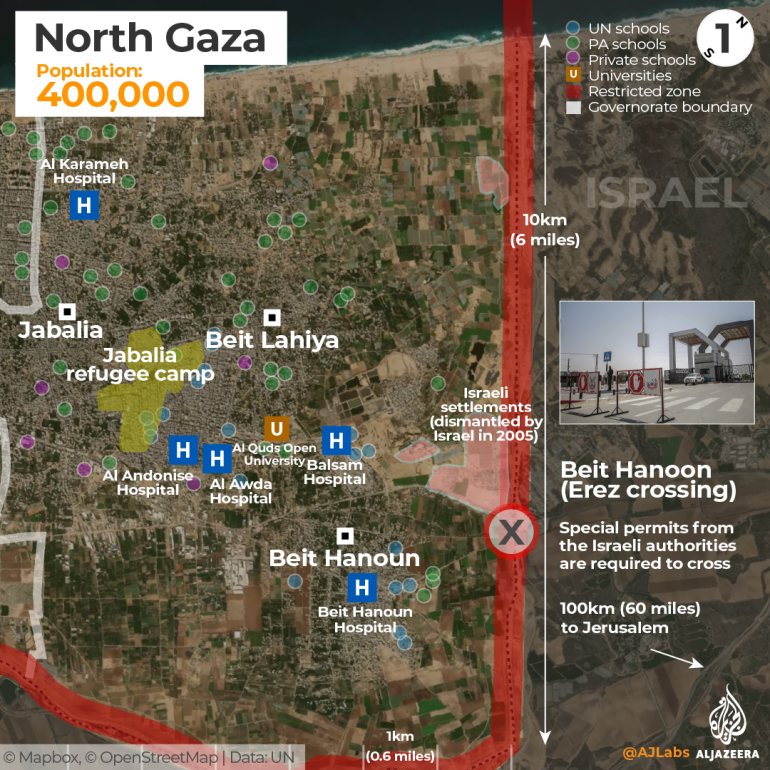
-
It’s 12:45am (22:45 GMT) in the occupied Palestinian territories and Israel, so let’s bring you up to speed with the latest developments:
- Israeli tanks are just 20 metres (65 feet) away from al-Quds Hospital and firing at the facility with about 14,000 displaced people sheltering inside.
- Al-Shifa Hospital’s director says two premature babies have died after being taken out of incubators because of power outages. He says the medical complex is “completely cut off, any moving person targeted” by Israeli forces.
- Israeli troops conducted a raid in the occupied West Bank city of Jenin. At least one person was killed while another was shot dead in Arraba, a nearby town, according to the health ministry.
- Arab and Muslim leaders concluded an emergency summit of the Arab League and Organisation of Islamic Cooperation where they condemned Israeli “aggression” on Gaza and demanded a ceasefire.
- In his second speech since October 7, Hezbollah leader Sayyed Hassan Nasrallah said the armed group used new types of weapons and struck new targets in Israel, and pledged the front against Israel would “remain active”.
- Hundreds of thousands of people took to the streets of London demanding an immediate ceasefire in Gaza and for the end of the Israeli occupation of Palestine.
- At least 11,078 Palestinians have been killed in Israeli attacks on Gaza since October 7. In Israel, after a downward revision, the death toll now stands at more than 1,200.
Belgian MP joins solidarity protest for Palestinians: ‘We need to sanction to end this occupation’Why is Western media accused of bias on Israel-Palestine?
-
The world’s television screens, newspapers and online media have been filled with pictures of Israel’s war on Gaza.
Modern technology means there’s more media coverage than ever before but some of it has been criticised – by journalists themselves. Hundreds of them have signed a letter accusing Western media of biased reporting of the Gaza war.
Are the allegations fair?
Why are Western media accused of bias on Israel-Palestine? | Inside Story US not utilising leverage over Israel ‘effectively’: Analyst
Sahar Khamis, a professor at the University of Maryland, says there has been growing sentiment in the US to save the lives of innocent civilians in Gaza.
“Atrocities” being committed by Israeli forces are now available for everyone to see on social media, she noted.
But despite growing pressure, the Biden administration has not responded in a way that is “firm, decisive, strong, or satisfactory to meet these demands”, Khamis said.
While the US has leverage over Israel, it is not being used “sufficiently or productively” to put an end to Israel’s attacks, she added.
Her comments come as diplomats in the US State Department have been criticising US policy on the war on Gaza.
The future of Palestine: two-state solution more distant that ever In Pictures: From Paris to Karachi, protesters rally in support
Across the world, demonstrators call for an immediate ceasefire and urgent humanitarian action in Gaza.
Major cities, including New York, London, Paris, Baghdad, Karachi, Berlin and Edinburgh, witnessed large marches on Saturday.
See all the images here.

Demonstrators wave Palestinian flags as they protest in Pamplona, northern Spain [Alvaro Barrientos/AP] Five Israeli soldiers killed in heavy fighting: Military
The Israeli army says five soldiers were killed during battles in the Gaza Strip.
The Israeli Ynet news website cited a military statement saying four soldiers were killed in a booby-trapped tunnel in Beit Hanoun in northern Gaza while the fifth died in fighting elsewhere.
The number of Israeli soldiers killed since the start of ground operations on October 27 rose to 43.
The army is facing fierce battles from armed Palestinian groups in different areas across Gaza.

Smoke rises as buildings in Gaza’s Beit Hanoun are bombed [Mostafa Alkharouf/Anadolu Agency] ‘Don’t make the mistake’: Netanyahu warns Hezbollah
Israel’s leader issued a stark warning to Lebanon’s Hezbollah after the defence minister did the same earlier in the day.
“Don’t make the mistake of going to war. That would be the mistake of your life… Your entry into the war will seal the fate of Lebanon,” Benjamin Netanyahu said.
Hezbollah leader Nasrallah earlier said the armed group used new types of weapons and struck new targets in Israel, and pledged the front against Israeli would “remain active”.
Israeli govt says Israeli citizen killed in rockets fired by Hezbollah's retaliatory attack
SOURCE: AL JAZEERA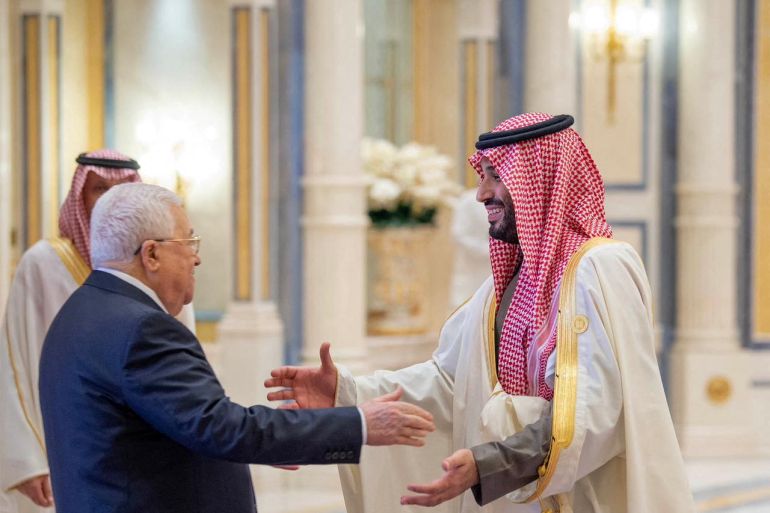
Saudi Crown Prince Mohammed bin Salman has been on a diplomatic push on Gaza [Saudi Press Agency/Handout via Reuters] Published On 11 Nov 202311 Nov 2023An Arab-Islamic summit hosted by Saudi Arabia called for an end to the war in Gaza and rejected justifying Israel’s actions against Palestinians as self-defence.
The summit on Saturday condemned “Israeli aggression on the Gaza Strip, war crimes and barbaric and inhumane massacres by the occupation government”, a final communique said.
It also called for an end to the siege on Gaza, allowing humanitarian aid into the enclave and halting arms exports to Israel, following the meeting in Riyadh.
The leaders demanded that the UN Security Council adopt “a decisive and binding resolution” to halt Israel’s “aggression” in Gaza.
Originally, only the 22 members of the Arab League were expected to participate, but the meeting was later expanded to include the Organization of Islamic Cooperation (OIC), a wider association of 57 mostly Muslim-majority states to which the Arab League countries belong.
Al Jazeera’s Hashem Ahelbarra said that without consensus among the summit attendees, its outcomes are useless.
“People do understand that the Israelis don’t really care about what is happening at this summit between the OIC and Arab League leaders. When you look at the communique you get a sense that the Arab and Muslim leaders do not have a mechanism to push a ceasefire and humanitarian corridor,” Ahelbarra said.
“This summit was just for the sake of a semblance of unity … in the Arab and Muslim world. It’s a watered-down statement. Not all Arab leaders decided to attend this summit because of the huge differences and divisions among the key players of the summit. That’s why they put this vaguely worded statement for public consumption,” he added.
In the opening remarks, Saudi Crown Prince Mohammed bin Salman (MBS) called for an immediate cessation of military operations in Gaza and the release of all captives and prisoners.
“This is a humanitarian catastrophe that has proved the failure of the international community and the UN Security Council to put an end to Israel’s gross violations of international humanitarian laws, and prove the dual standards adopted by the world,” he said.
“We are certain the only cause for peace is the end of the Israeli occupation and illegal settlements, and restoration of the established rights of the Palestinian people and the establishment of the state on 1967, with East Jerusalem as its capital,” MBS added.
Turkish President Recep Recep Tayyip Erdogan said that Israel was taking revenge on Gazan babies, children and women, as he renewed his call for an immediate ceasefire.
“What is urgent in Gaza is not pauses for a few hours, rather we need a permanent ceasefire,” he added. “We cannot put Hamas resisters defending their homeland in the same category as the occupiers.”
Palestinian Authority President Mahmoud Abbas highlighted that besides Gaza, Israeli forces’ raids in the occupied West Bank have also escalated and called on the United States to put an end to “Israel’s aggression, the occupation, violation and desecration of our holy sites”.
“No military and security solutions are acceptable as they have all failed. We categorically reject any efforts to displace our people from Gaza or the West Bank,” Abbas added.
Qatar’s Emir Sheikh Tamim bin Hamad Al Thani questioned for how long the international community will treat Israel as if it is above international law.
“The international world remains immune in front of all these scenes. Who could have imagined that hospitals could be publicly shelled in the 21st century?” he asked.
‘A unified collective position’
Saudi Arabia’s Ministry of Foreign Affairs said the joint Arab League and OIC meeting was being held “in response to the exceptional circumstances taking place in the Palestinian Gaza Strip as countries feel the need to unify efforts and come out with a unified collective position”.
The OIC includes member states from across the Islamic world, including the Palestinian territories’ neighbours Egypt and Jordan, Lebanon, Turkey and Iraq.
Abdel Fattah el-Sisi, the president of Egypt, emphasised that the policy of “collective punishment” by killing, siege and forcible transfer, is unacceptable.
“This cannot be interpreted as self-defence and must be stopped immediately”.
With Iran repeatedly warning that the scope of war will expand if Israel does not stop its attacks, President Ebrahim Raisi also attended the meeting in Riyadh, marking the first visit by an Iranian president in 11 years.
“Blind bombardment against Gaza must stop,” Raisi said, adding that “Islamic governments should designate the army of the occupying and aggressor regime [Israel] as a terrorist organisation”.
Raisi highlighted that Washington is supporting Israel in the United Nations and vetoes resolutions that prevent the killing of Palestinians.
-
What Would It Look Like If You Were Standing On The Wrong Side Of History? |
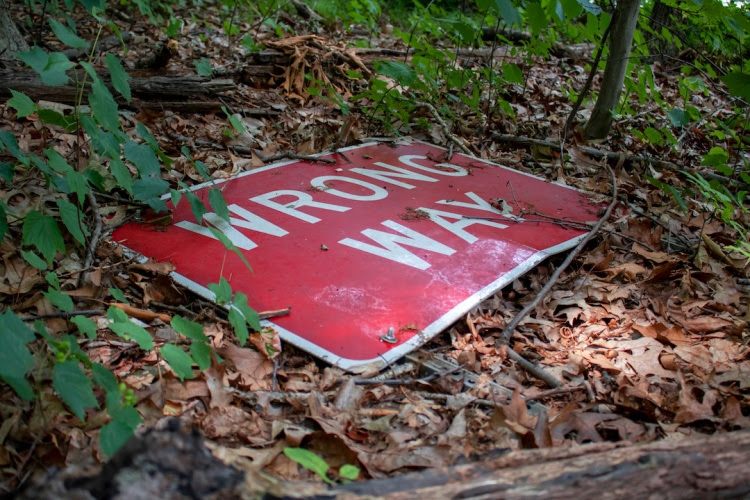
What Would It Look Like If You Were Standing On The Wrong Side Of History?
|
Netanyahu says not seeking to ‘occupy’ Gaza but ‘demilitarise’ it
Israeli leader says ‘civilian government’ should rule enclave after Hamas is defeated.

Israeli Prime Minister Benjamin Netanyahu has denied that his country has any plans to reoccupy Gaza
10 Nov 2023
Ex-Israeli justice minister: ‘Premature’ to speak about Israeli presence in post-war Gaza
US ‘humiliated every day’ in its relationship with Israel: AJ analyst
Israeli Prime Minister Benjamin Netanyahu has said his country does not intend to “occupy” or govern Gaza after the end of its war with Hamas, but the enclave must be “demilitarised, deradicalised and rebuilt”.
In an interview with Fox News aired on Thursday, Netanyahu said that Israel would need to find a “civilian government” to govern the enclave, which has been run by Hamas since 2006, without specifying who would form such a body.
“We don’t seek to govern Gaza, we don’t seek to occupy it. But we seek to give it and us a better future … and that requires defeating Hamas,” he said. “I’ve set goals, I didn’t set a timetable because it can take more time.”
Gaza, however, is already viewed as an occupied territory because Israel has full control of its borders, airspace and territorial waters despite having formally withdrawn its forces and settlers from the enclave in 2005. In 2007, Israel began enforcing a suffocating blockade on the territory which it had captured along with other Palestinian territories – occupied East Jerusalem and the West Bank – in the 1967 War.
While Israel has argued that the 2005 withdrawal marked the end of the occupation, experts in international law such as former UN special rapporteur Michael Lynk maintain that it never ended as the Israeli military continues to exercise “effective control” over the territory.
In his interview, Netanyahu said that a “credible force” would be needed to enter Gaza as necessary to “kill the killers” and “prevent the re-emergence of a Hamas-like entity”.
Netanyahu’s comments come days after he said Israel would take responsibility for Gaza’s security for an “indefinite period” after the end of its war with Hamas, prompting pushback from the United States.
On Tuesday, White House national security spokesperson John Kirby said that President Joe Biden did not believe that reoccupying Gaza would be the “right thing to do”.
US Secretary of State Antony Blinken said on Wednesday that the conditions for “durable peace and security” would include “no reoccupation of Gaza after the conflict ends”.
Israeli officials have said that Netanyahu’s comments about managing Gaza’s security did not suggest Israel would assume administrative control of the enclave, but conflicting statements by senior members of the government, including Defence Minister Yoav Gallant, have created confusion about its plans.
US officials have previously suggested that the Palestinian Authority should govern Gaza after the war, which Palestinian President Mahmoud Abbas has said would only be possible under a political solution that returns territory captured by Israel in the 1967 Arab-Israeli War.
Netanyahu on Thursday reiterated his opposition to a ceasefire with Hamas, as the Biden administration announced that its ally had agreed to daily four-hour pauses in fighting to allow civilians to flee hostilities.
“A ceasefire with Hamas means a surrender to Hamas, surrender to terror,” Netanyahu said, adding that Israel’s military was performing “exceptionally well” and would continue its campaign “however long it takes.”
Israel has promised to eliminate Hamas in response to the armed group’s October 7 attacks on the country, which Israeli officials say killed 1,405 people, mostly civilians.
Israel’s bombardment of Gaza has killed at least 10,569 Palestinians, including 4,324 children, according to the health ministry in the enclave.
KEEP READING
list of 4 items
Israel strikes Gaza’s biggest hospital complex, health officials say
Photos: This Israel war has no mercy, Gaza rescue workers say
Gaza’s Christians fear ‘threat of extinction’ amid Israel war
‘Like breathing poison’: Children in India’s Delhi hit hard by smog
MOST READ

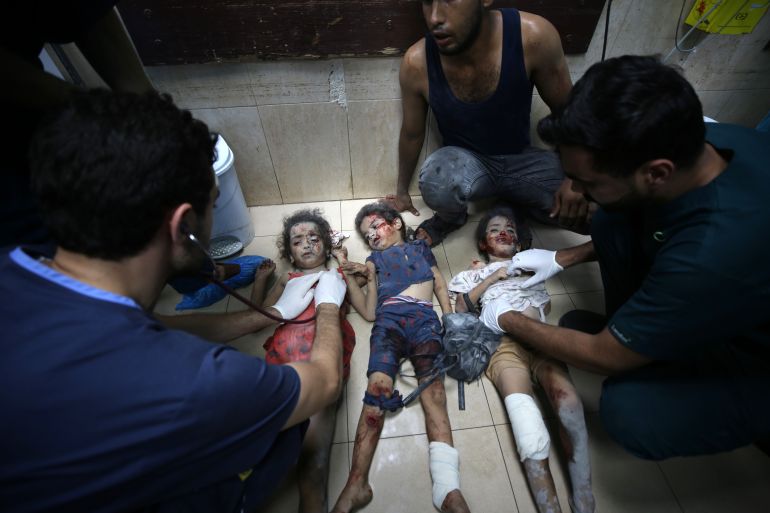

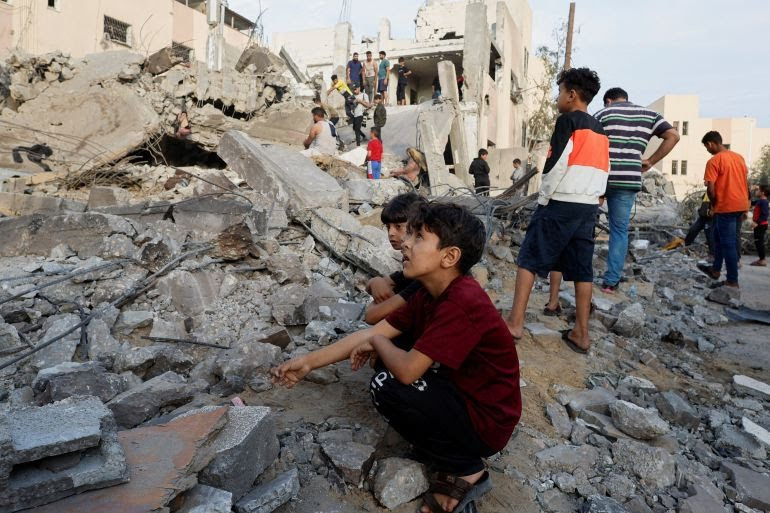
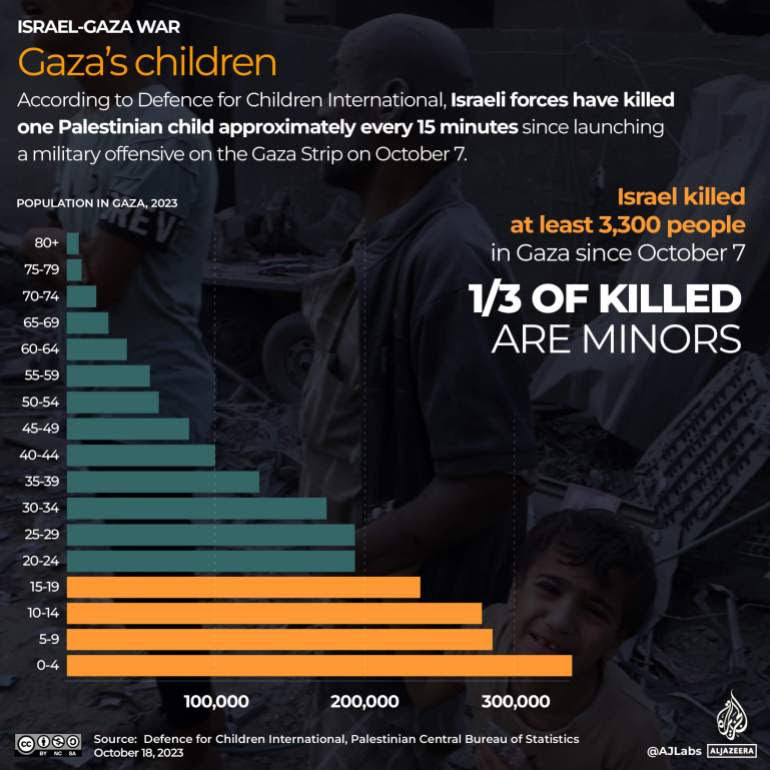
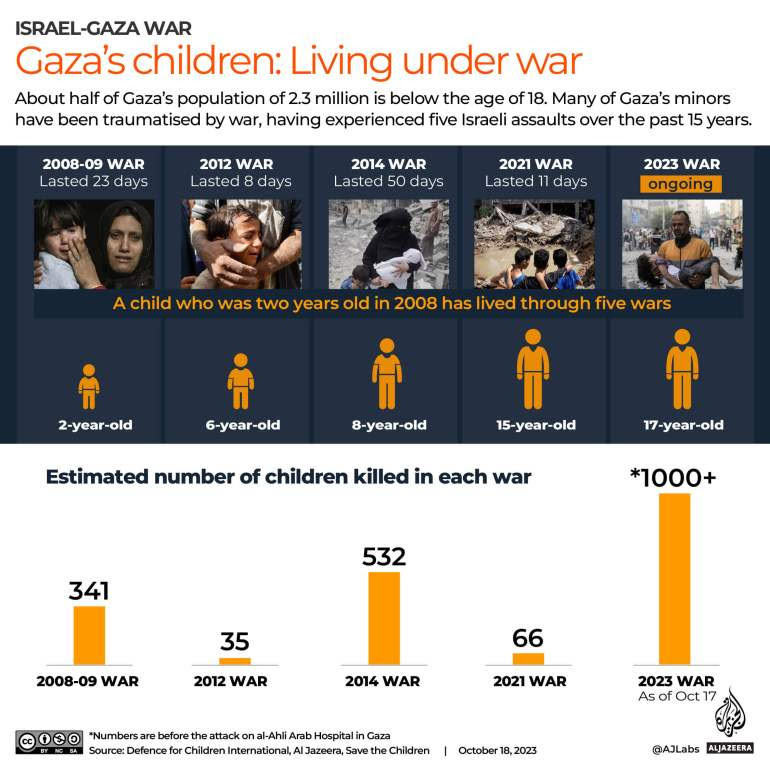
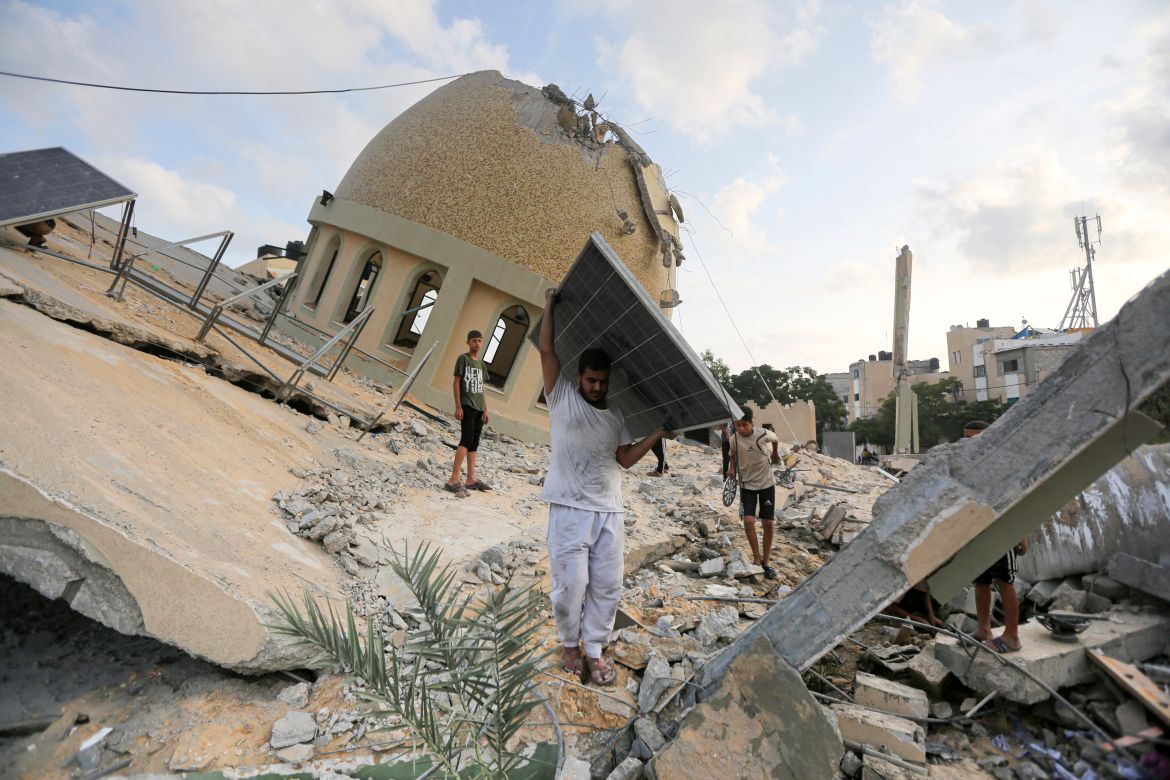
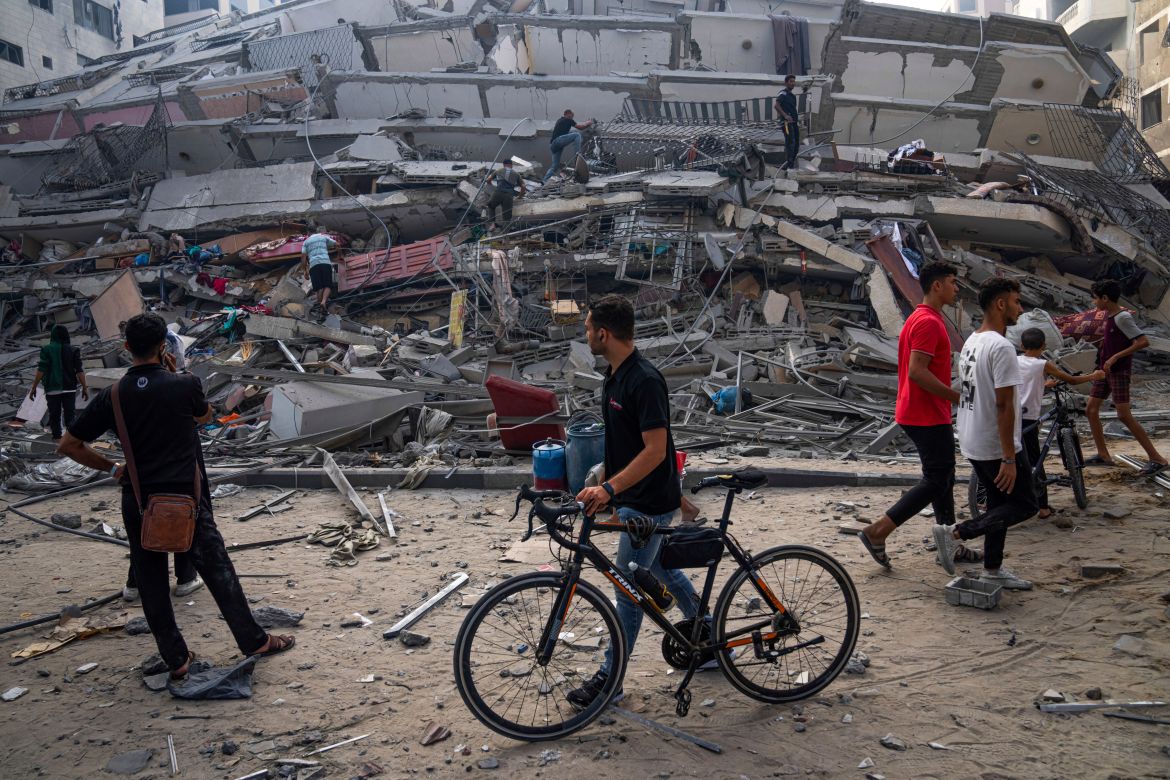

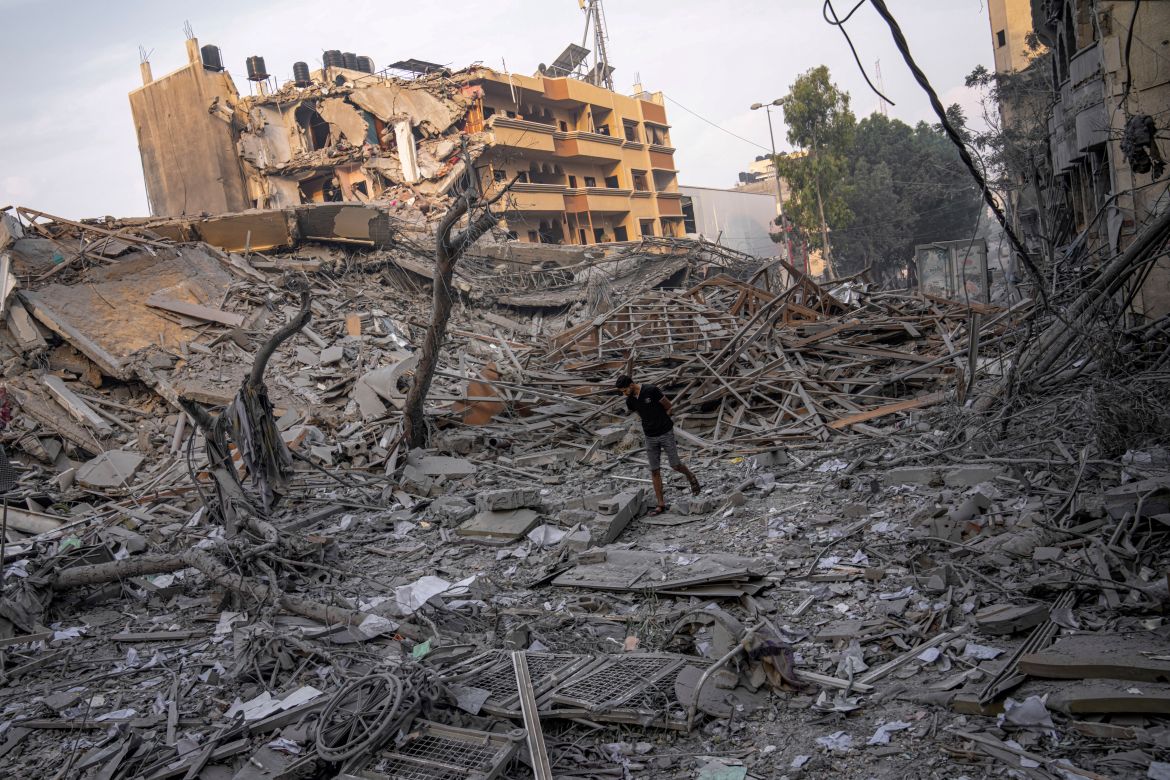
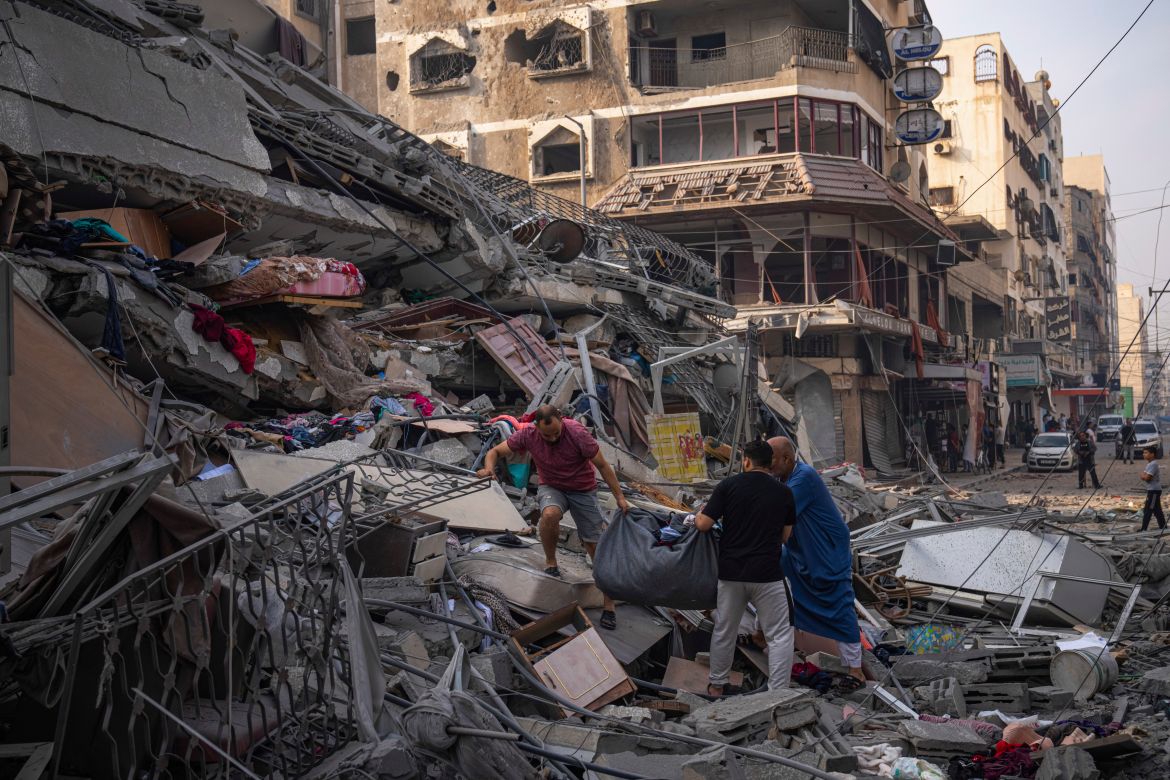
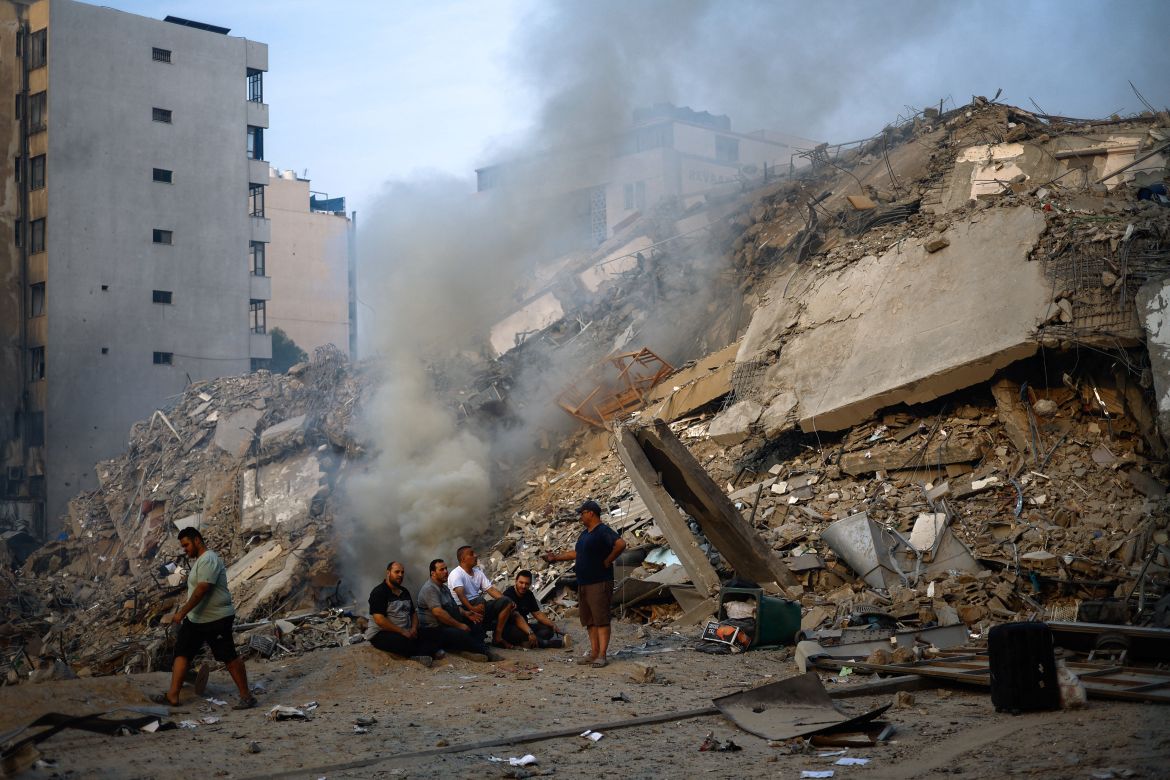
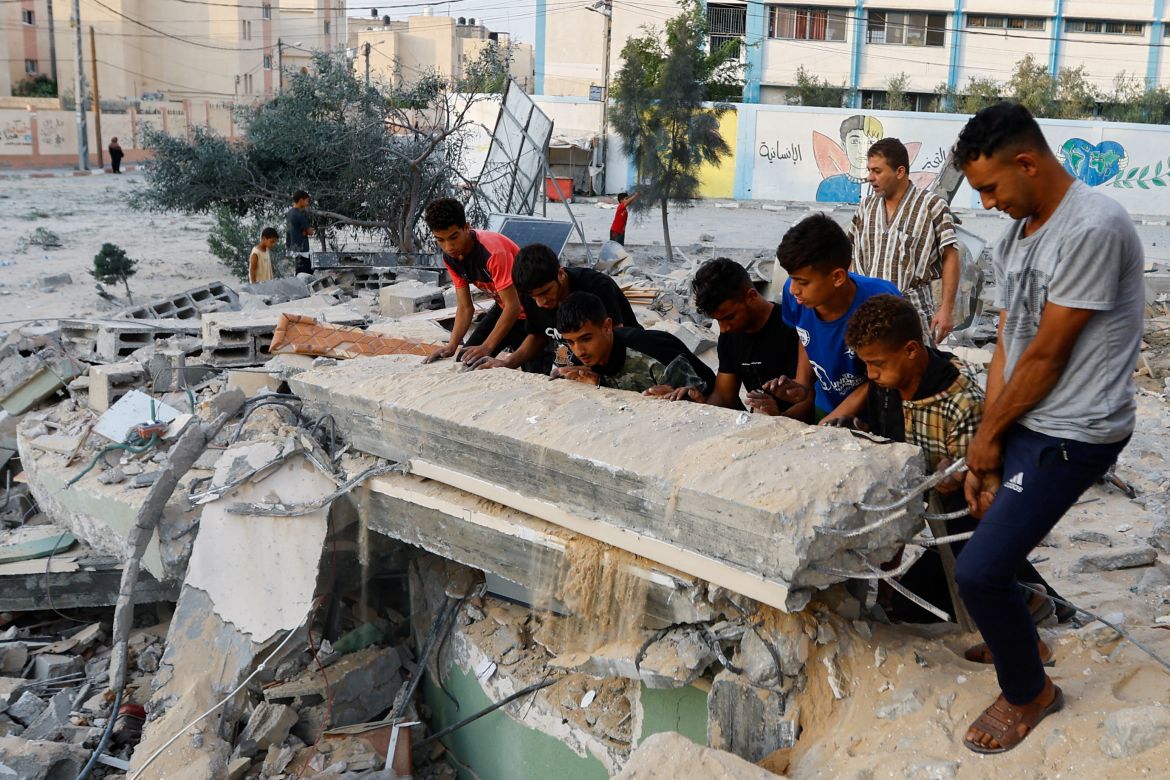
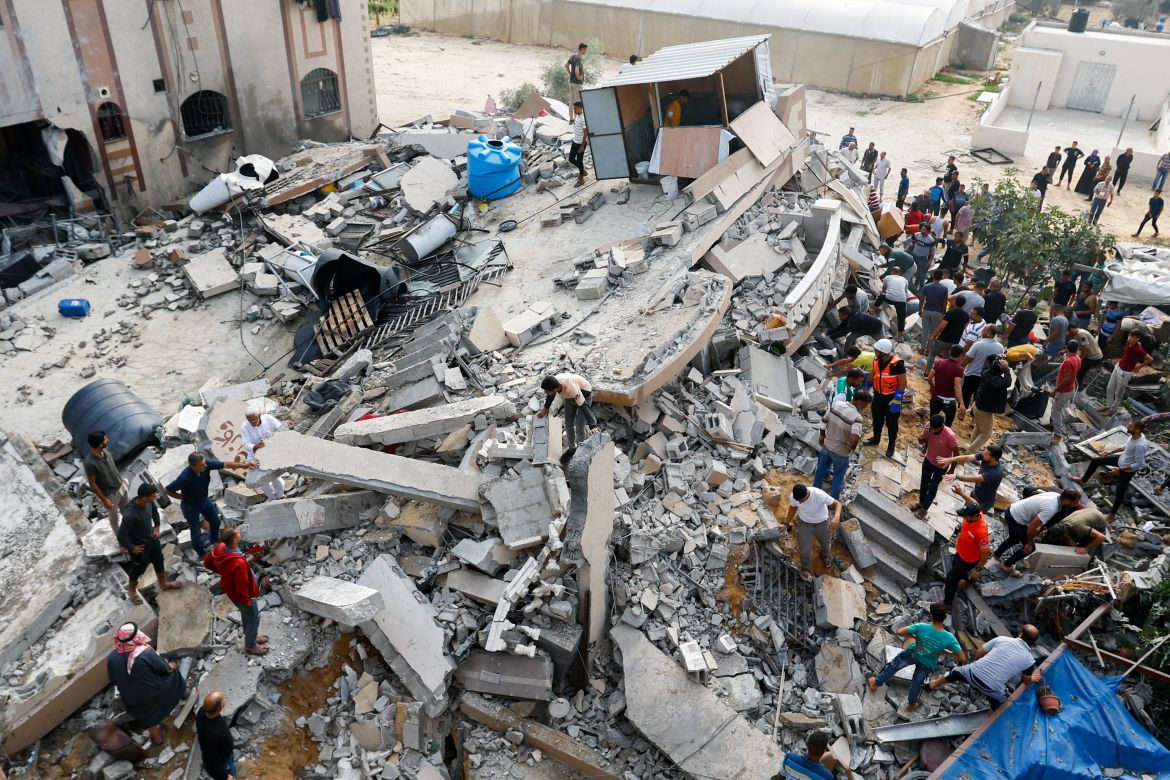
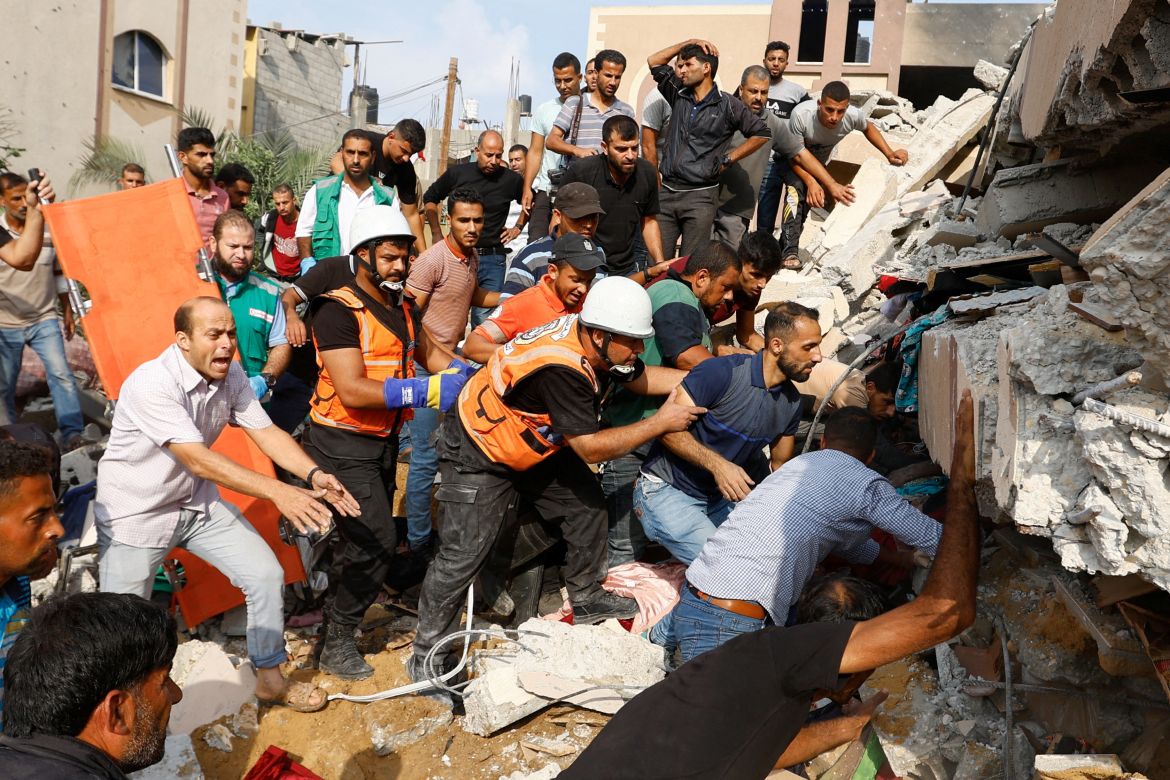
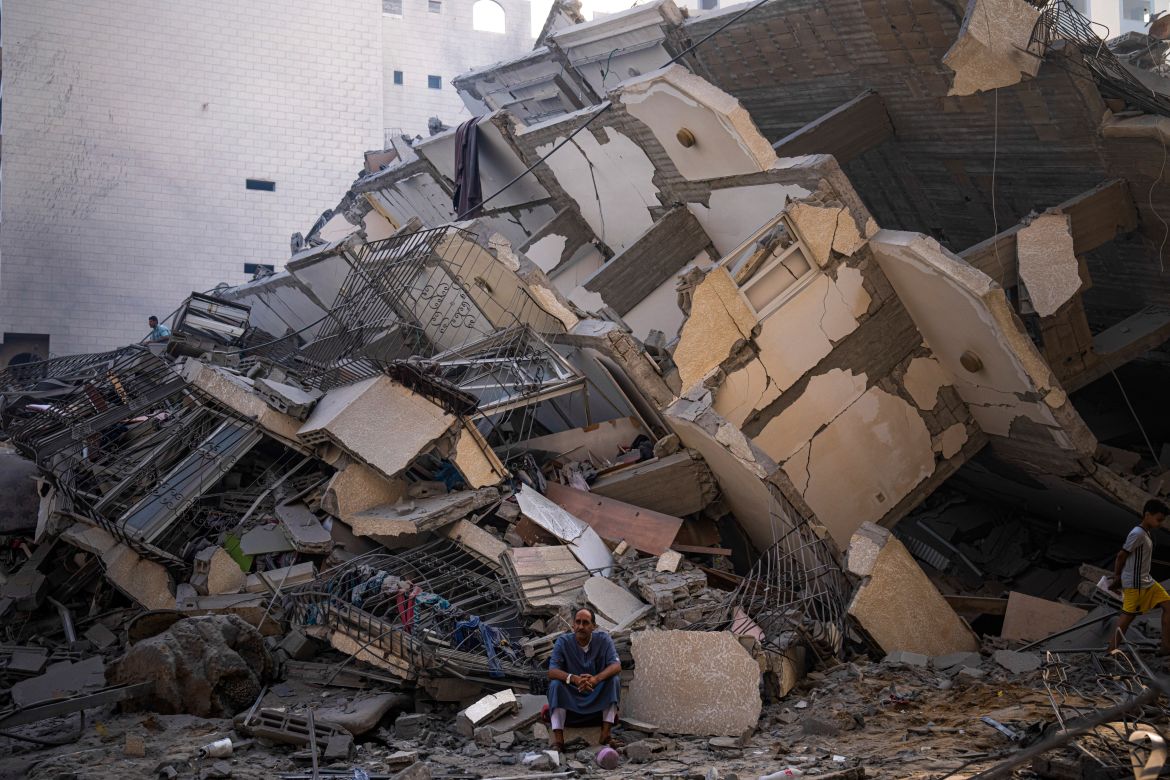
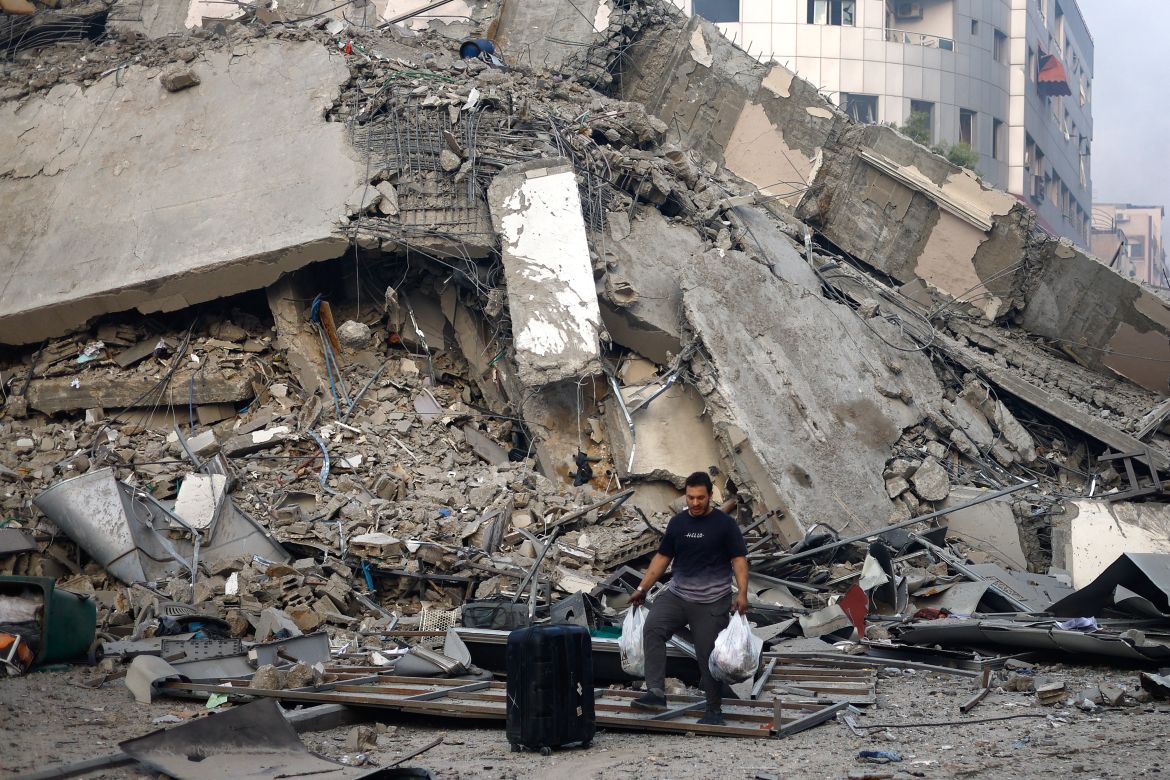





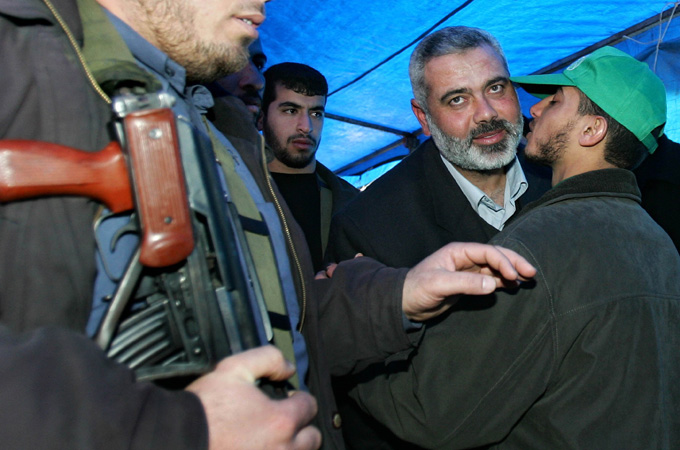


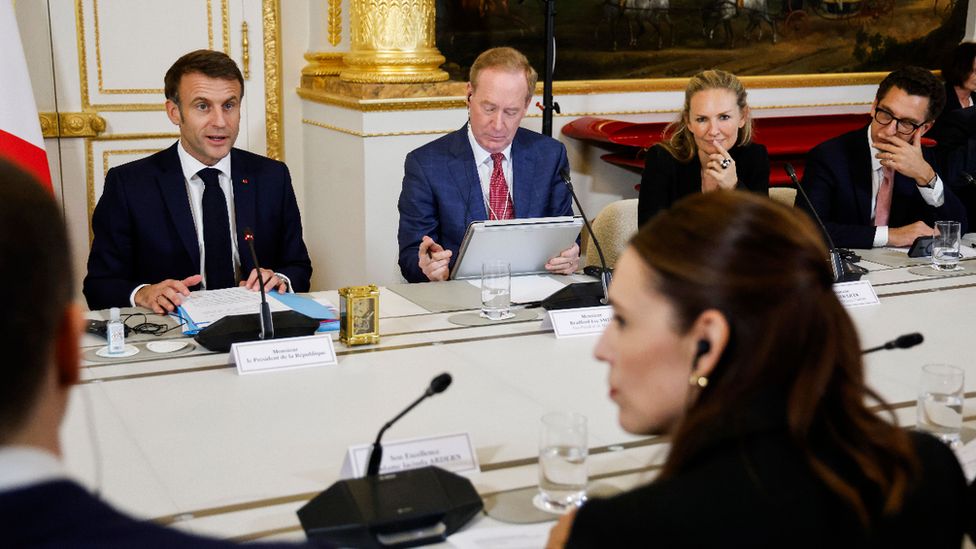
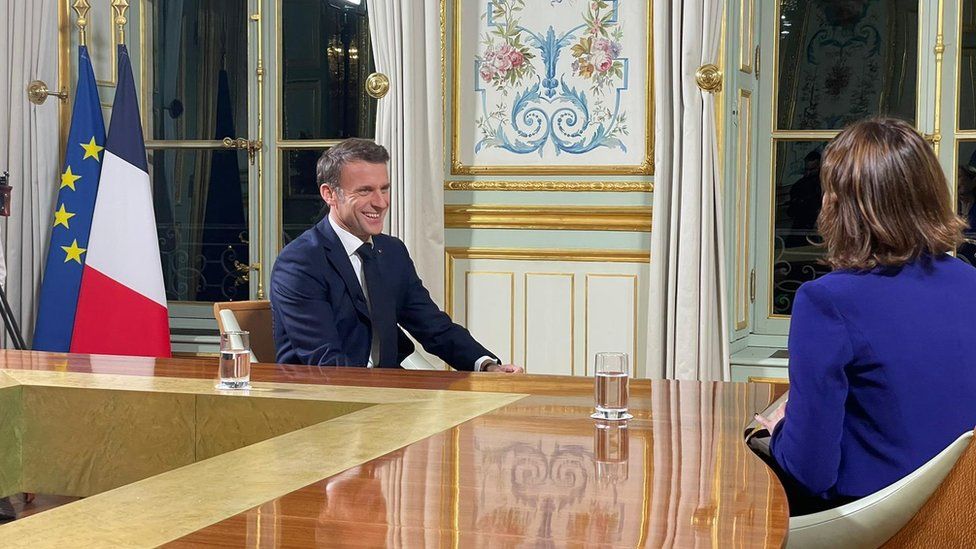











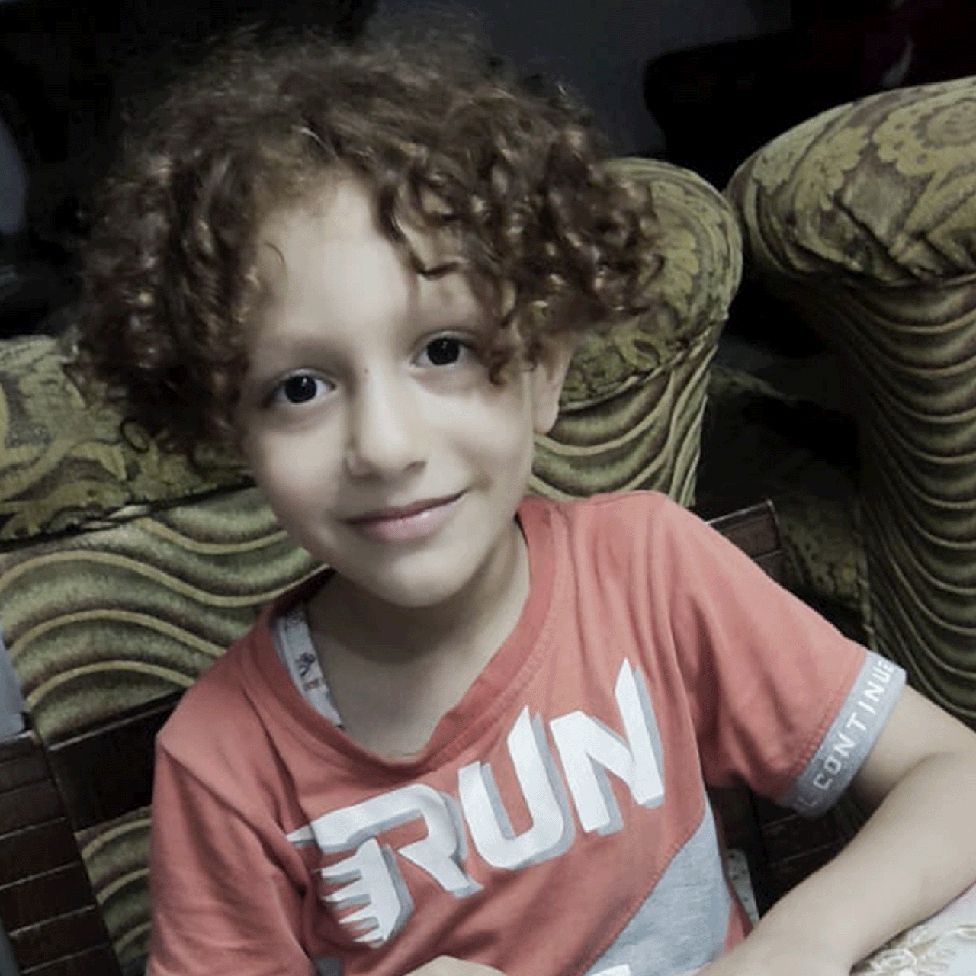
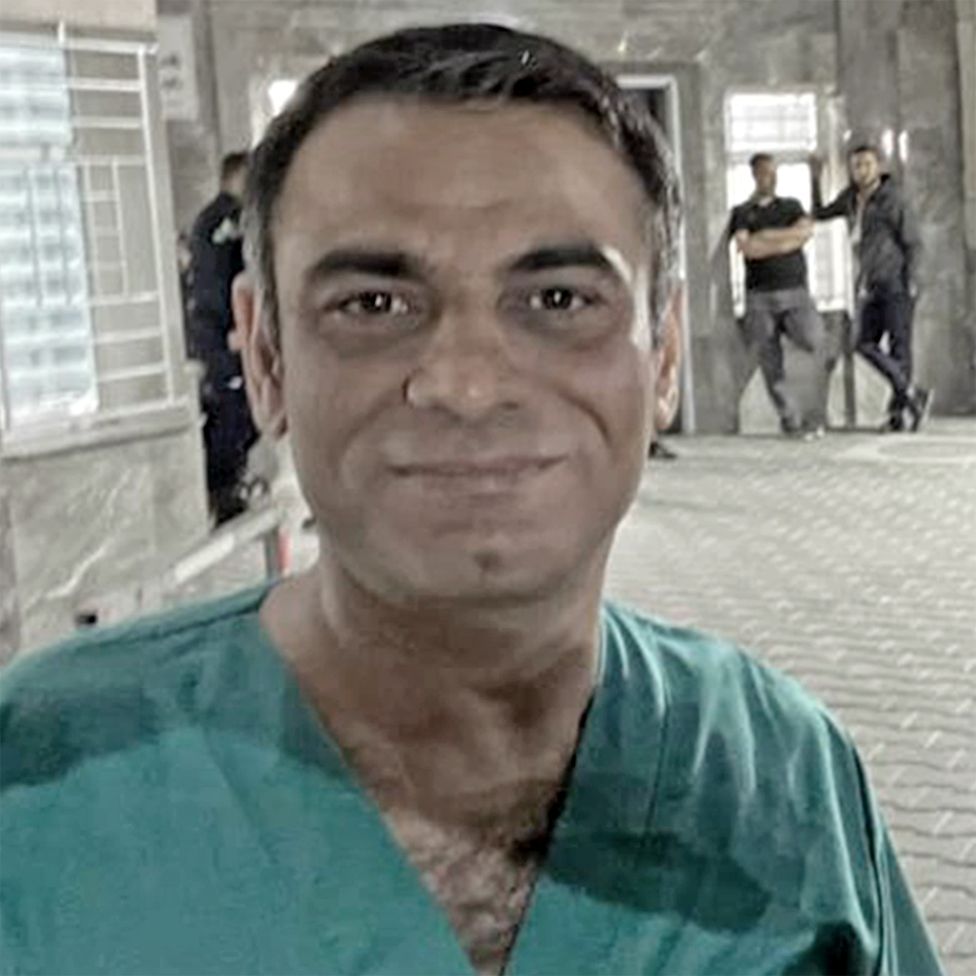
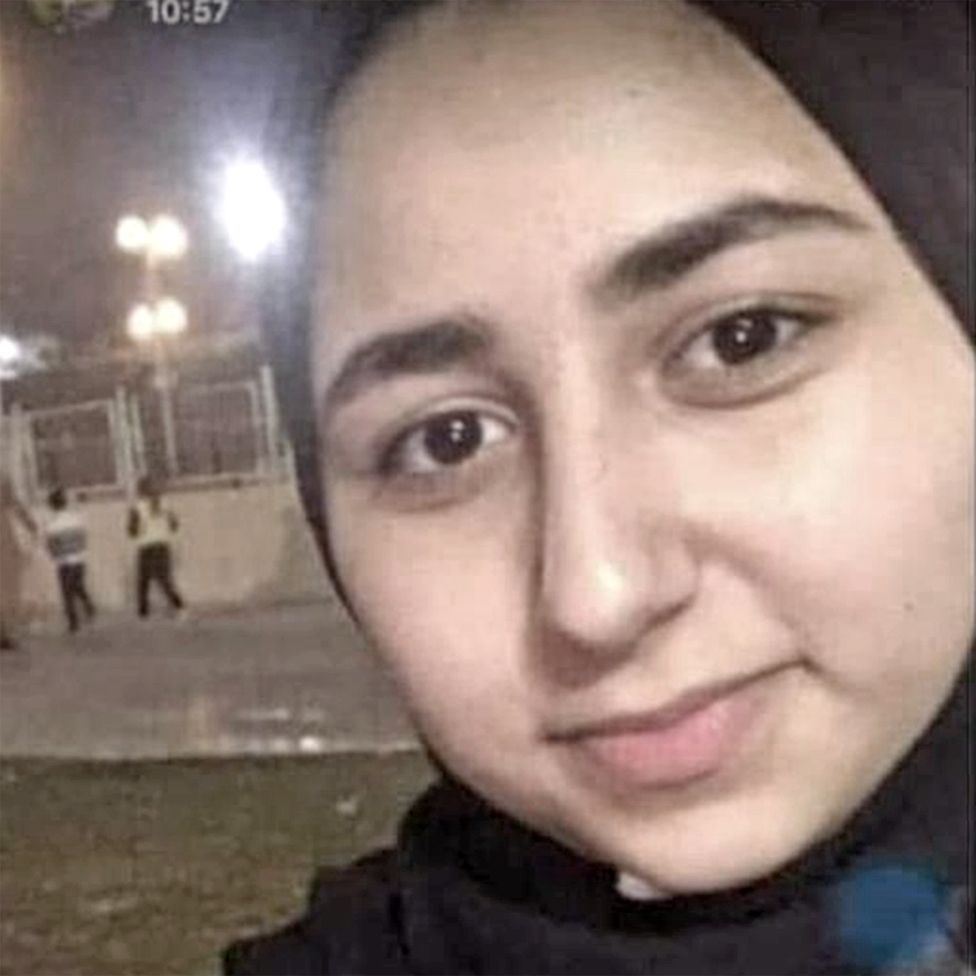
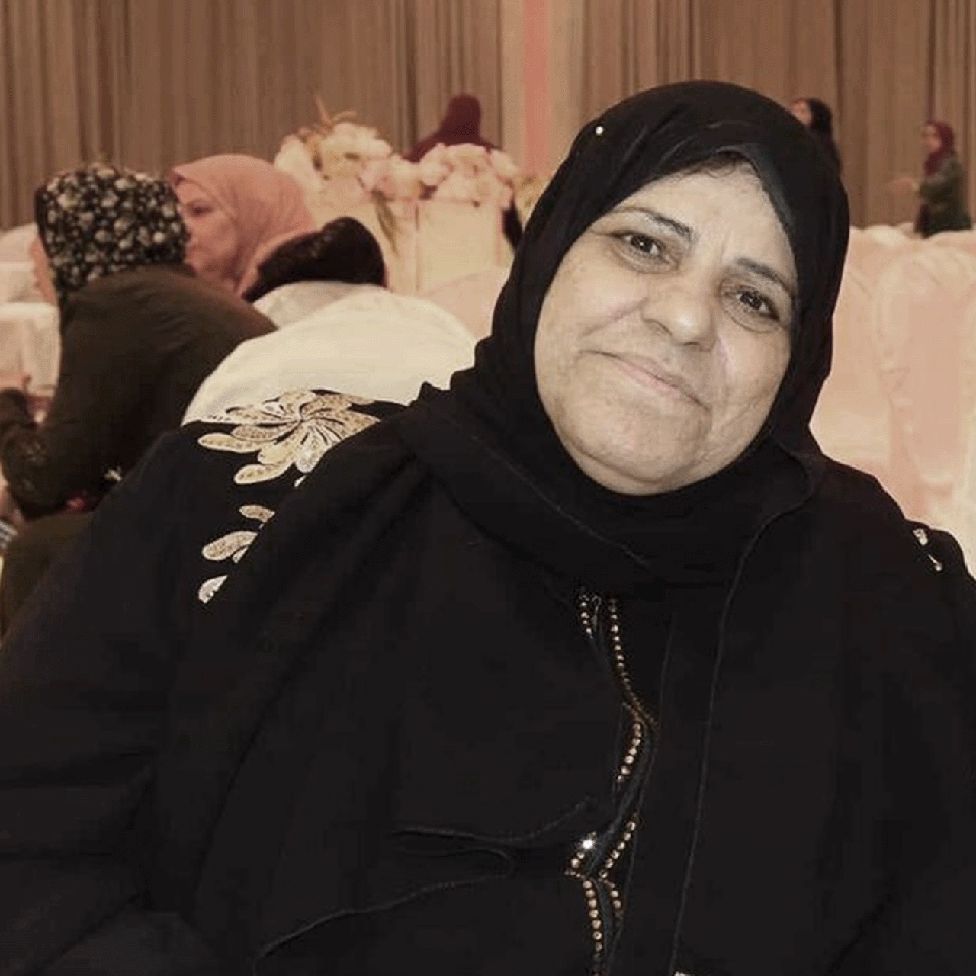





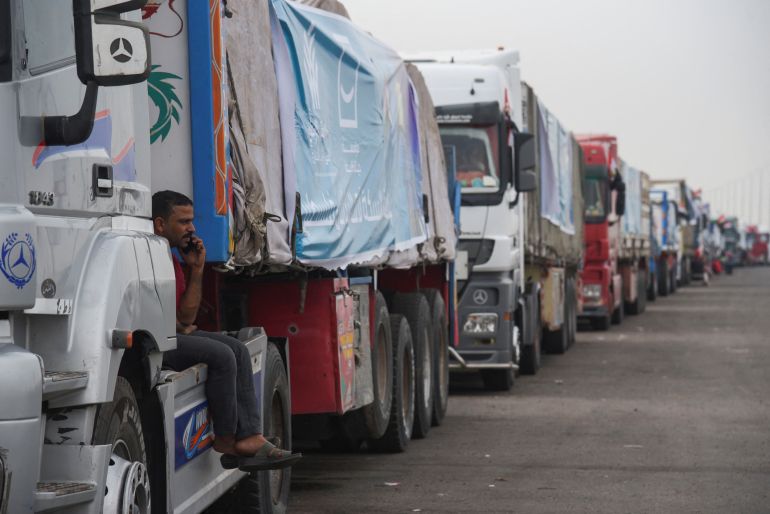
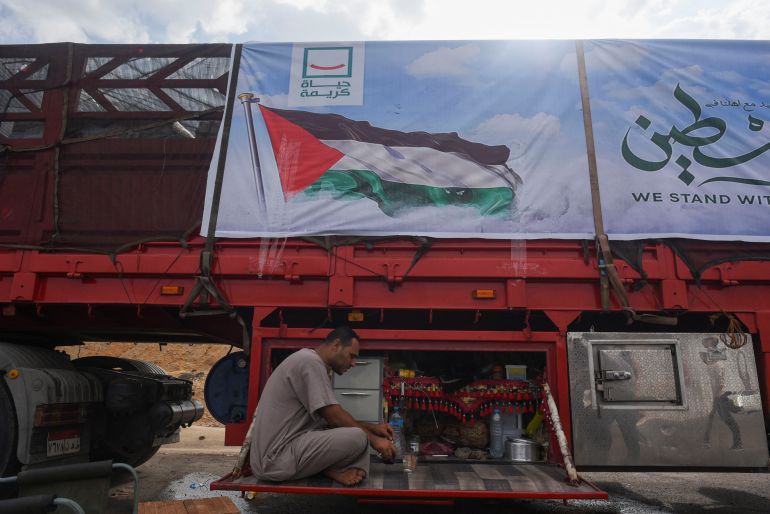

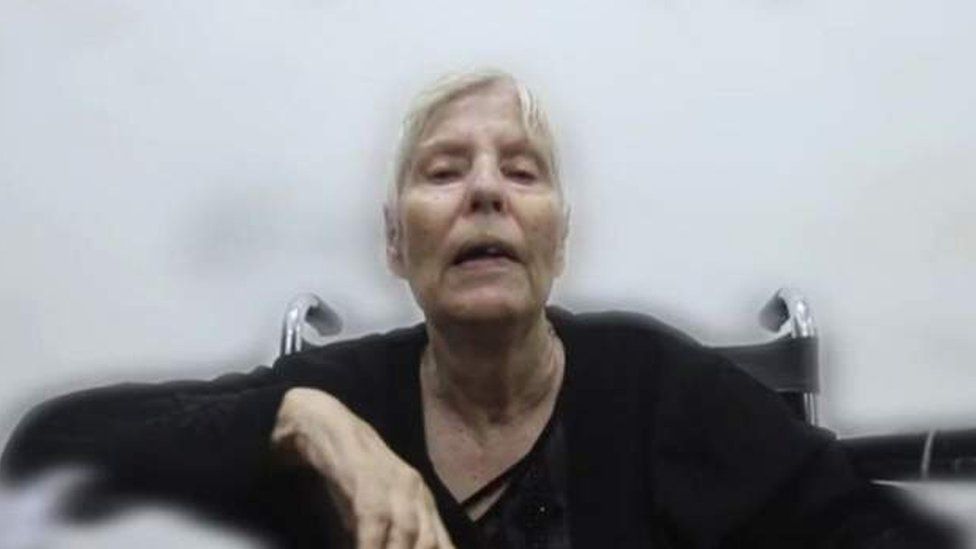
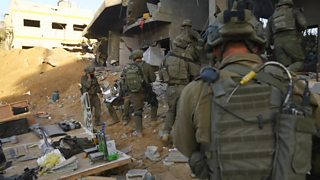
![Hezbollah supporters hold pictures of their relatives who died fighting with Hezbollah as they listen to a speech of Hezbollah leader Sayyed Hassan Nasrallah via a video link, during a ceremony marking the "Hezbollah Martyr Day," in the southern Beirut suburb of Dahiyeh, Lebanon, Saturday, Nov. 11, 2023 [Hassan Ammar/AP Photo]](https://ci3.googleusercontent.com/proxy/5LIcco4WXsCVcD0IZXa8V2U_mlFt01j_k4MJIOa3qaQFpXx0YO83wB1h80v9TLsyy9oz7l6uzWV6qRsHYBHw1t76x6kM-In-ZK9UCbNiyXQm6zffYQ6-JgR_IRwzwSgHzi0jtXRHR_ePTF3_kU5lmiGI9s_NC1hBu2oBiDgkSkX3Q5HVJGYHbds=s0-d-e1-ft#https://www.aljazeera.com/wp-content/uploads/2023/11/AP23315545144193-1699717718.jpg?w=770&resize=770%2C513&quality=80)
